Role of Holistic Disease Management in Gastro-Intestinal Disease
VerifiedAdded on 2023/06/15
|34
|10348
|251
AI Summary
This literature review focuses on the role of holistic disease management in gastro-intestinal disease, specifically inflammatory bowel disease. The review covers pharmacologic interventions, dietary changes, lifestyle modifications, and surgery as potential treatment options.
Contribute Materials
Your contribution can guide someone’s learning journey. Share your
documents today.
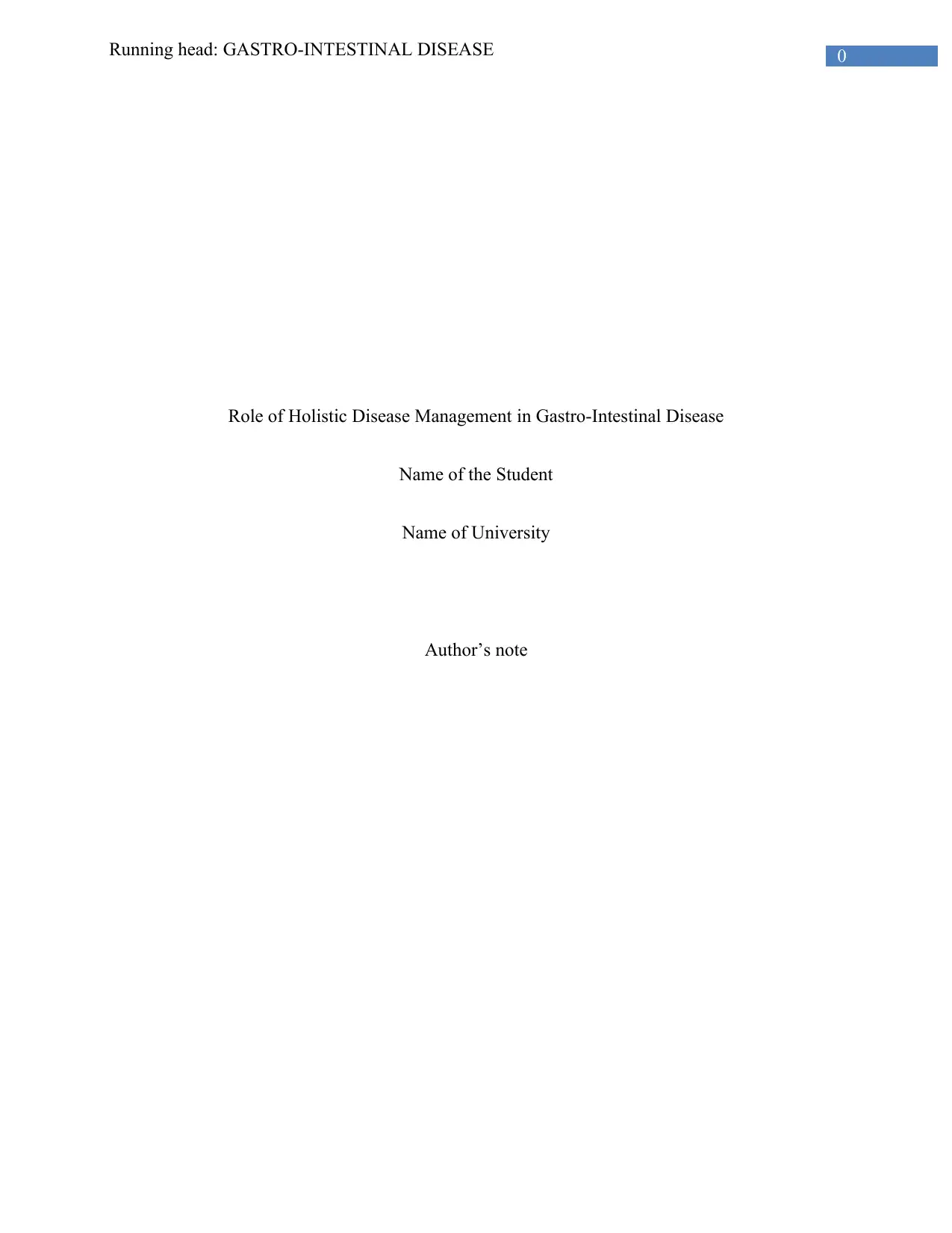
0Running head: GASTRO-INTESTINAL DISEASE
Role of Holistic Disease Management in Gastro-Intestinal Disease
Name of the Student
Name of University
Author’s note
Role of Holistic Disease Management in Gastro-Intestinal Disease
Name of the Student
Name of University
Author’s note
Secure Best Marks with AI Grader
Need help grading? Try our AI Grader for instant feedback on your assignments.
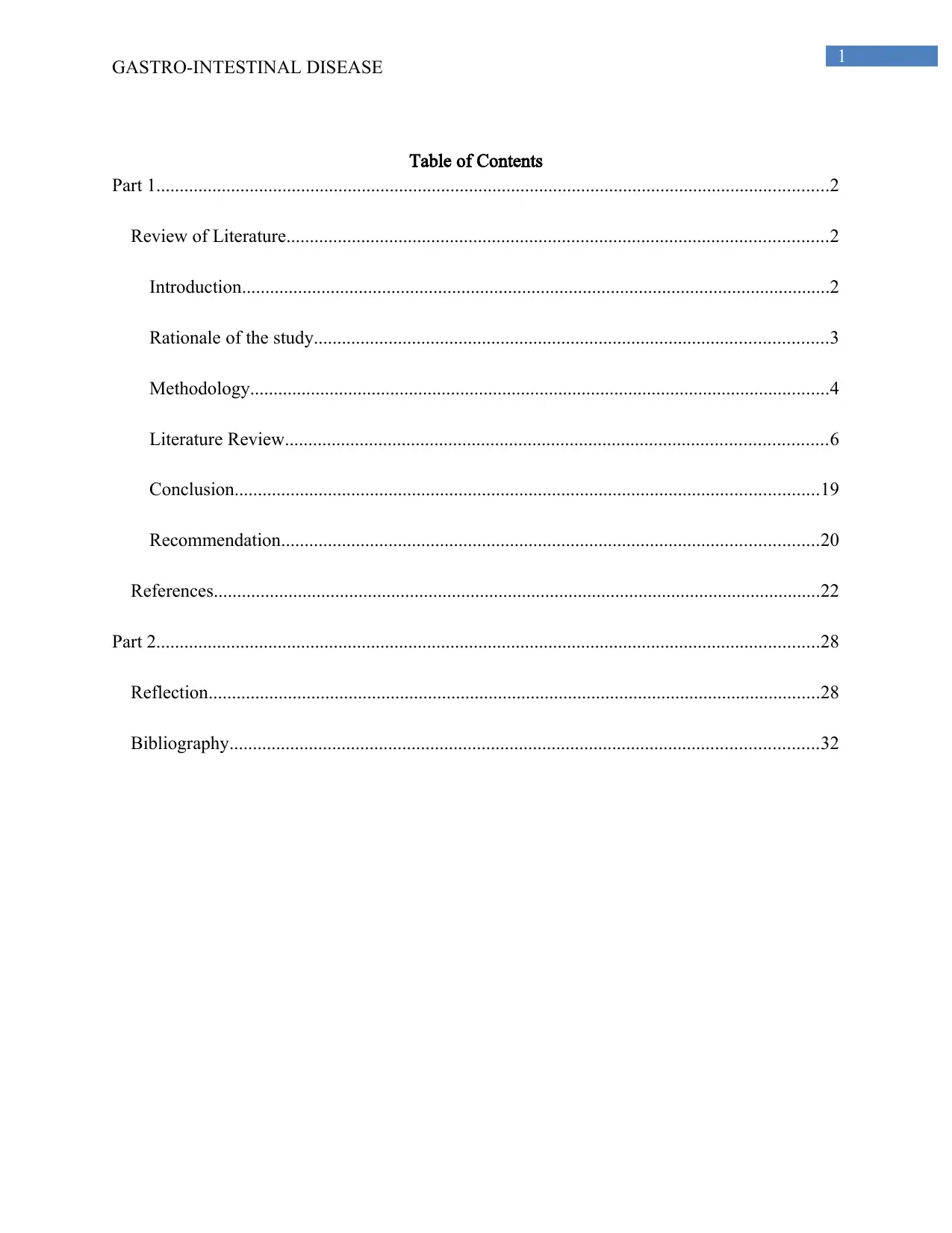
1
GASTRO-INTESTINAL DISEASE
Table of Contents
Part 1................................................................................................................................................2
Review of Literature....................................................................................................................2
Introduction..............................................................................................................................2
Rationale of the study..............................................................................................................3
Methodology............................................................................................................................4
Literature Review....................................................................................................................6
Conclusion.............................................................................................................................19
Recommendation...................................................................................................................20
References..................................................................................................................................22
Part 2..............................................................................................................................................28
Reflection...................................................................................................................................28
Bibliography..............................................................................................................................32
GASTRO-INTESTINAL DISEASE
Table of Contents
Part 1................................................................................................................................................2
Review of Literature....................................................................................................................2
Introduction..............................................................................................................................2
Rationale of the study..............................................................................................................3
Methodology............................................................................................................................4
Literature Review....................................................................................................................6
Conclusion.............................................................................................................................19
Recommendation...................................................................................................................20
References..................................................................................................................................22
Part 2..............................................................................................................................................28
Reflection...................................................................................................................................28
Bibliography..............................................................................................................................32
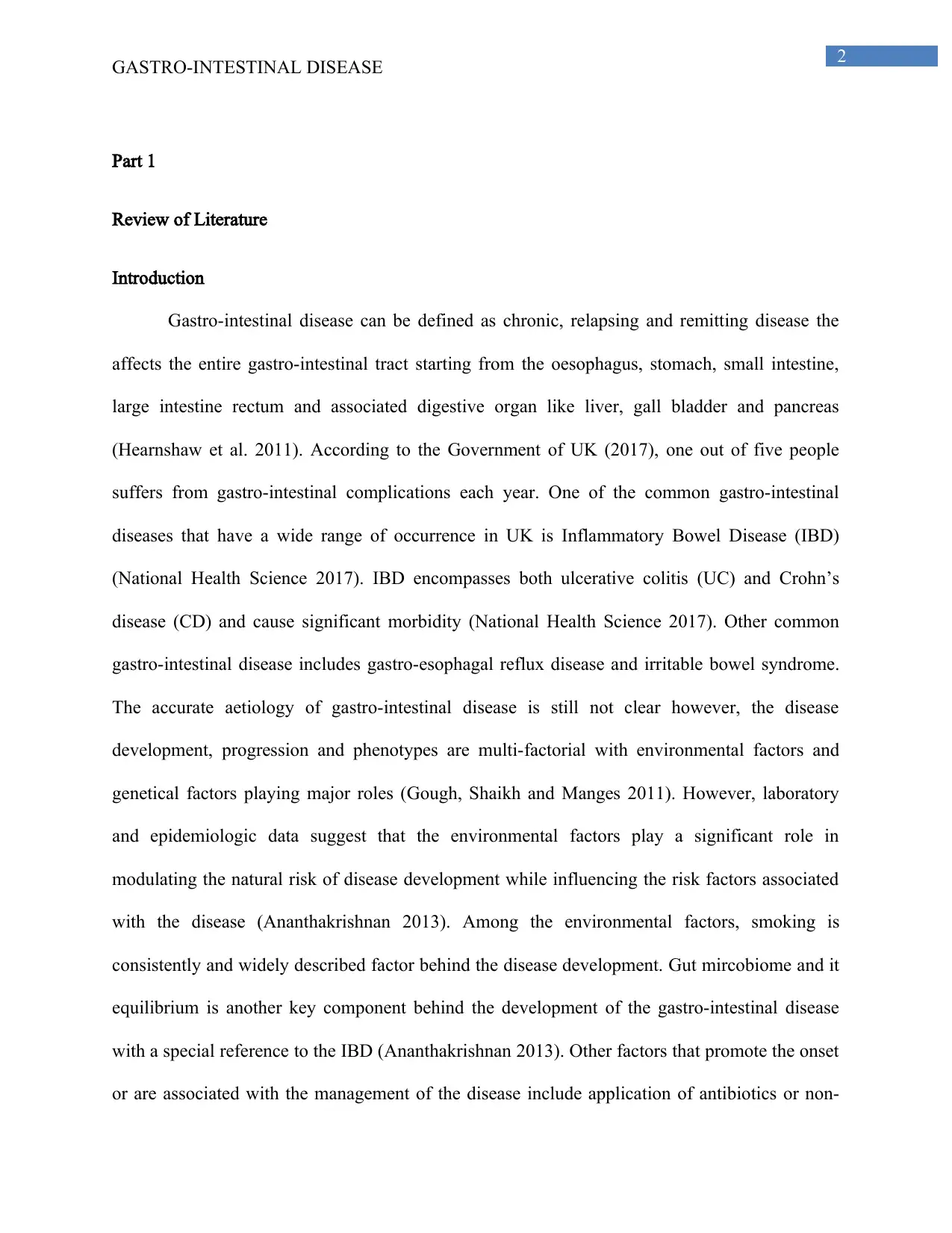
2
GASTRO-INTESTINAL DISEASE
Part 1
Review of Literature
Introduction
Gastro-intestinal disease can be defined as chronic, relapsing and remitting disease the
affects the entire gastro-intestinal tract starting from the oesophagus, stomach, small intestine,
large intestine rectum and associated digestive organ like liver, gall bladder and pancreas
(Hearnshaw et al. 2011). According to the Government of UK (2017), one out of five people
suffers from gastro-intestinal complications each year. One of the common gastro-intestinal
diseases that have a wide range of occurrence in UK is Inflammatory Bowel Disease (IBD)
(National Health Science 2017). IBD encompasses both ulcerative colitis (UC) and Crohn’s
disease (CD) and cause significant morbidity (National Health Science 2017). Other common
gastro-intestinal disease includes gastro-esophagal reflux disease and irritable bowel syndrome.
The accurate aetiology of gastro-intestinal disease is still not clear however, the disease
development, progression and phenotypes are multi-factorial with environmental factors and
genetical factors playing major roles (Gough, Shaikh and Manges 2011). However, laboratory
and epidemiologic data suggest that the environmental factors play a significant role in
modulating the natural risk of disease development while influencing the risk factors associated
with the disease (Ananthakrishnan 2013). Among the environmental factors, smoking is
consistently and widely described factor behind the disease development. Gut mircobiome and it
equilibrium is another key component behind the development of the gastro-intestinal disease
with a special reference to the IBD (Ananthakrishnan 2013). Other factors that promote the onset
or are associated with the management of the disease include application of antibiotics or non-
GASTRO-INTESTINAL DISEASE
Part 1
Review of Literature
Introduction
Gastro-intestinal disease can be defined as chronic, relapsing and remitting disease the
affects the entire gastro-intestinal tract starting from the oesophagus, stomach, small intestine,
large intestine rectum and associated digestive organ like liver, gall bladder and pancreas
(Hearnshaw et al. 2011). According to the Government of UK (2017), one out of five people
suffers from gastro-intestinal complications each year. One of the common gastro-intestinal
diseases that have a wide range of occurrence in UK is Inflammatory Bowel Disease (IBD)
(National Health Science 2017). IBD encompasses both ulcerative colitis (UC) and Crohn’s
disease (CD) and cause significant morbidity (National Health Science 2017). Other common
gastro-intestinal disease includes gastro-esophagal reflux disease and irritable bowel syndrome.
The accurate aetiology of gastro-intestinal disease is still not clear however, the disease
development, progression and phenotypes are multi-factorial with environmental factors and
genetical factors playing major roles (Gough, Shaikh and Manges 2011). However, laboratory
and epidemiologic data suggest that the environmental factors play a significant role in
modulating the natural risk of disease development while influencing the risk factors associated
with the disease (Ananthakrishnan 2013). Among the environmental factors, smoking is
consistently and widely described factor behind the disease development. Gut mircobiome and it
equilibrium is another key component behind the development of the gastro-intestinal disease
with a special reference to the IBD (Ananthakrishnan 2013). Other factors that promote the onset
or are associated with the management of the disease include application of antibiotics or non-
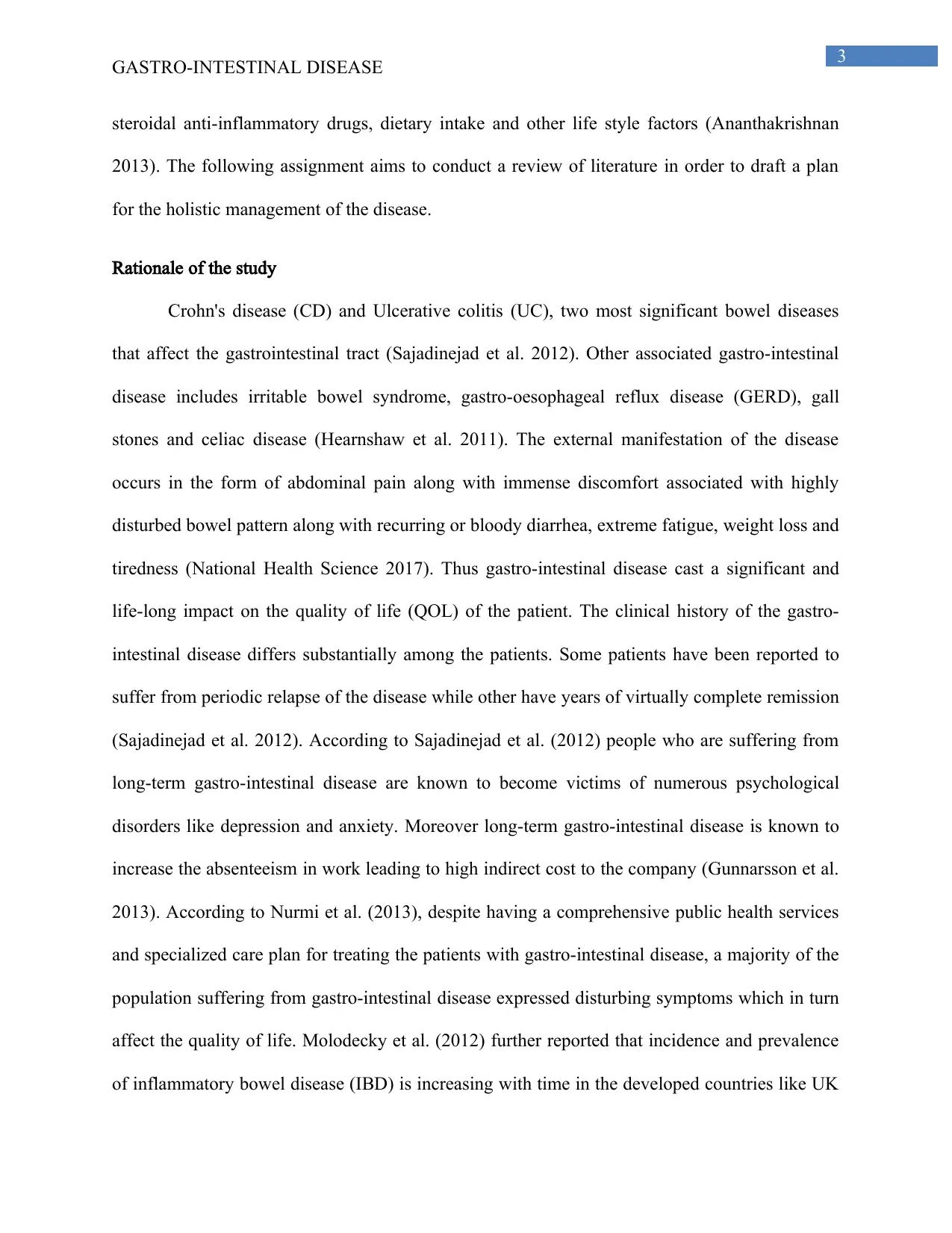
3
GASTRO-INTESTINAL DISEASE
steroidal anti-inflammatory drugs, dietary intake and other life style factors (Ananthakrishnan
2013). The following assignment aims to conduct a review of literature in order to draft a plan
for the holistic management of the disease.
Rationale of the study
Crohn's disease (CD) and Ulcerative colitis (UC), two most significant bowel diseases
that affect the gastrointestinal tract (Sajadinejad et al. 2012). Other associated gastro-intestinal
disease includes irritable bowel syndrome, gastro-oesophageal reflux disease (GERD), gall
stones and celiac disease (Hearnshaw et al. 2011). The external manifestation of the disease
occurs in the form of abdominal pain along with immense discomfort associated with highly
disturbed bowel pattern along with recurring or bloody diarrhea, extreme fatigue, weight loss and
tiredness (National Health Science 2017). Thus gastro-intestinal disease cast a significant and
life-long impact on the quality of life (QOL) of the patient. The clinical history of the gastro-
intestinal disease differs substantially among the patients. Some patients have been reported to
suffer from periodic relapse of the disease while other have years of virtually complete remission
(Sajadinejad et al. 2012). According to Sajadinejad et al. (2012) people who are suffering from
long-term gastro-intestinal disease are known to become victims of numerous psychological
disorders like depression and anxiety. Moreover long-term gastro-intestinal disease is known to
increase the absenteeism in work leading to high indirect cost to the company (Gunnarsson et al.
2013). According to Nurmi et al. (2013), despite having a comprehensive public health services
and specialized care plan for treating the patients with gastro-intestinal disease, a majority of the
population suffering from gastro-intestinal disease expressed disturbing symptoms which in turn
affect the quality of life. Molodecky et al. (2012) further reported that incidence and prevalence
of inflammatory bowel disease (IBD) is increasing with time in the developed countries like UK
GASTRO-INTESTINAL DISEASE
steroidal anti-inflammatory drugs, dietary intake and other life style factors (Ananthakrishnan
2013). The following assignment aims to conduct a review of literature in order to draft a plan
for the holistic management of the disease.
Rationale of the study
Crohn's disease (CD) and Ulcerative colitis (UC), two most significant bowel diseases
that affect the gastrointestinal tract (Sajadinejad et al. 2012). Other associated gastro-intestinal
disease includes irritable bowel syndrome, gastro-oesophageal reflux disease (GERD), gall
stones and celiac disease (Hearnshaw et al. 2011). The external manifestation of the disease
occurs in the form of abdominal pain along with immense discomfort associated with highly
disturbed bowel pattern along with recurring or bloody diarrhea, extreme fatigue, weight loss and
tiredness (National Health Science 2017). Thus gastro-intestinal disease cast a significant and
life-long impact on the quality of life (QOL) of the patient. The clinical history of the gastro-
intestinal disease differs substantially among the patients. Some patients have been reported to
suffer from periodic relapse of the disease while other have years of virtually complete remission
(Sajadinejad et al. 2012). According to Sajadinejad et al. (2012) people who are suffering from
long-term gastro-intestinal disease are known to become victims of numerous psychological
disorders like depression and anxiety. Moreover long-term gastro-intestinal disease is known to
increase the absenteeism in work leading to high indirect cost to the company (Gunnarsson et al.
2013). According to Nurmi et al. (2013), despite having a comprehensive public health services
and specialized care plan for treating the patients with gastro-intestinal disease, a majority of the
population suffering from gastro-intestinal disease expressed disturbing symptoms which in turn
affect the quality of life. Molodecky et al. (2012) further reported that incidence and prevalence
of inflammatory bowel disease (IBD) is increasing with time in the developed countries like UK
Secure Best Marks with AI Grader
Need help grading? Try our AI Grader for instant feedback on your assignments.
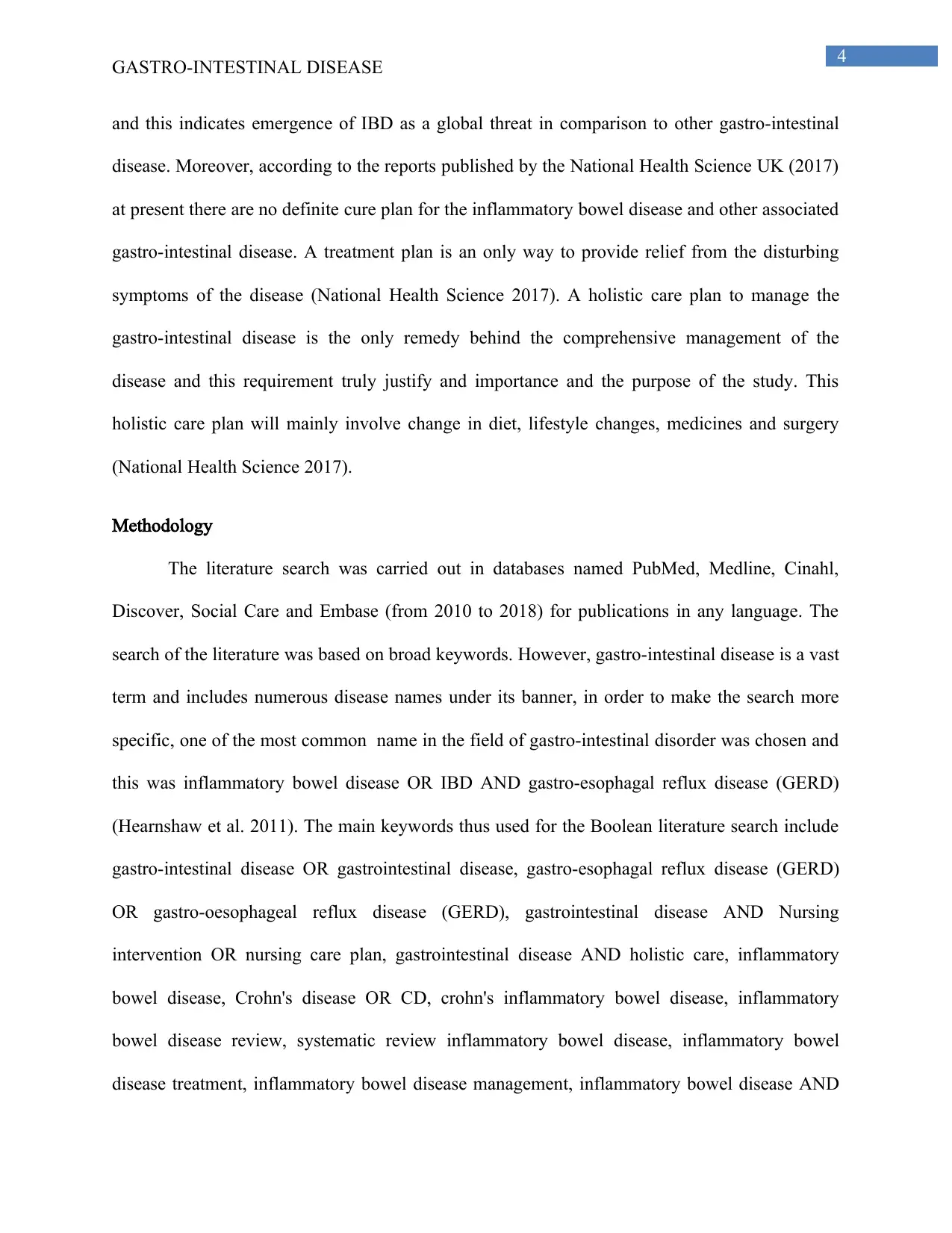
4
GASTRO-INTESTINAL DISEASE
and this indicates emergence of IBD as a global threat in comparison to other gastro-intestinal
disease. Moreover, according to the reports published by the National Health Science UK (2017)
at present there are no definite cure plan for the inflammatory bowel disease and other associated
gastro-intestinal disease. A treatment plan is an only way to provide relief from the disturbing
symptoms of the disease (National Health Science 2017). A holistic care plan to manage the
gastro-intestinal disease is the only remedy behind the comprehensive management of the
disease and this requirement truly justify and importance and the purpose of the study. This
holistic care plan will mainly involve change in diet, lifestyle changes, medicines and surgery
(National Health Science 2017).
Methodology
The literature search was carried out in databases named PubMed, Medline, Cinahl,
Discover, Social Care and Embase (from 2010 to 2018) for publications in any language. The
search of the literature was based on broad keywords. However, gastro-intestinal disease is a vast
term and includes numerous disease names under its banner, in order to make the search more
specific, one of the most common name in the field of gastro-intestinal disorder was chosen and
this was inflammatory bowel disease OR IBD AND gastro-esophagal reflux disease (GERD)
(Hearnshaw et al. 2011). The main keywords thus used for the Boolean literature search include
gastro-intestinal disease OR gastrointestinal disease, gastro-esophagal reflux disease (GERD)
OR gastro-oesophageal reflux disease (GERD), gastrointestinal disease AND Nursing
intervention OR nursing care plan, gastrointestinal disease AND holistic care, inflammatory
bowel disease, Crohn's disease OR CD, crohn's inflammatory bowel disease, inflammatory
bowel disease review, systematic review inflammatory bowel disease, inflammatory bowel
disease treatment, inflammatory bowel disease management, inflammatory bowel disease AND
GASTRO-INTESTINAL DISEASE
and this indicates emergence of IBD as a global threat in comparison to other gastro-intestinal
disease. Moreover, according to the reports published by the National Health Science UK (2017)
at present there are no definite cure plan for the inflammatory bowel disease and other associated
gastro-intestinal disease. A treatment plan is an only way to provide relief from the disturbing
symptoms of the disease (National Health Science 2017). A holistic care plan to manage the
gastro-intestinal disease is the only remedy behind the comprehensive management of the
disease and this requirement truly justify and importance and the purpose of the study. This
holistic care plan will mainly involve change in diet, lifestyle changes, medicines and surgery
(National Health Science 2017).
Methodology
The literature search was carried out in databases named PubMed, Medline, Cinahl,
Discover, Social Care and Embase (from 2010 to 2018) for publications in any language. The
search of the literature was based on broad keywords. However, gastro-intestinal disease is a vast
term and includes numerous disease names under its banner, in order to make the search more
specific, one of the most common name in the field of gastro-intestinal disorder was chosen and
this was inflammatory bowel disease OR IBD AND gastro-esophagal reflux disease (GERD)
(Hearnshaw et al. 2011). The main keywords thus used for the Boolean literature search include
gastro-intestinal disease OR gastrointestinal disease, gastro-esophagal reflux disease (GERD)
OR gastro-oesophageal reflux disease (GERD), gastrointestinal disease AND Nursing
intervention OR nursing care plan, gastrointestinal disease AND holistic care, inflammatory
bowel disease, Crohn's disease OR CD, crohn's inflammatory bowel disease, inflammatory
bowel disease review, systematic review inflammatory bowel disease, inflammatory bowel
disease treatment, inflammatory bowel disease management, inflammatory bowel disease AND
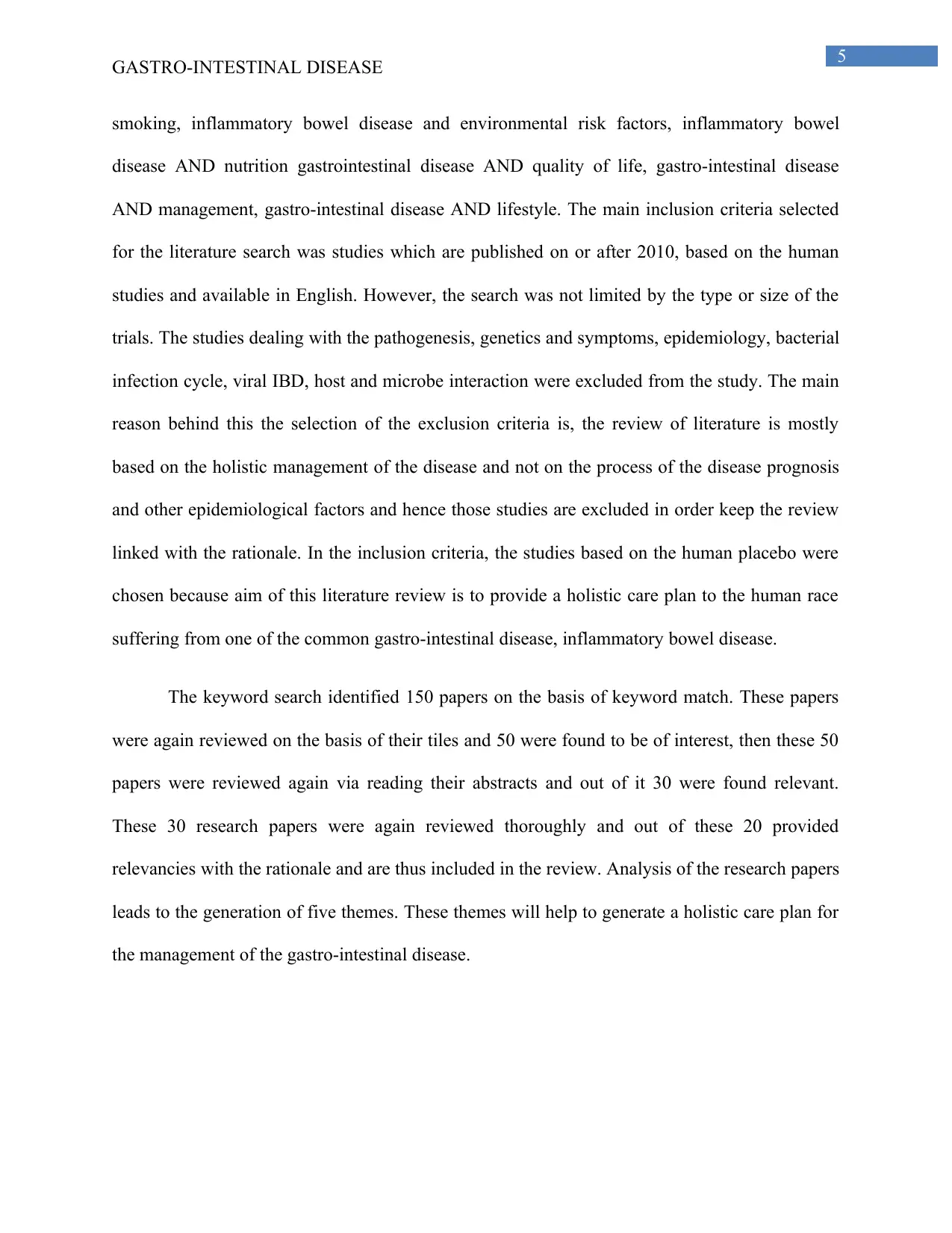
5
GASTRO-INTESTINAL DISEASE
smoking, inflammatory bowel disease and environmental risk factors, inflammatory bowel
disease AND nutrition gastrointestinal disease AND quality of life, gastro-intestinal disease
AND management, gastro-intestinal disease AND lifestyle. The main inclusion criteria selected
for the literature search was studies which are published on or after 2010, based on the human
studies and available in English. However, the search was not limited by the type or size of the
trials. The studies dealing with the pathogenesis, genetics and symptoms, epidemiology, bacterial
infection cycle, viral IBD, host and microbe interaction were excluded from the study. The main
reason behind this the selection of the exclusion criteria is, the review of literature is mostly
based on the holistic management of the disease and not on the process of the disease prognosis
and other epidemiological factors and hence those studies are excluded in order keep the review
linked with the rationale. In the inclusion criteria, the studies based on the human placebo were
chosen because aim of this literature review is to provide a holistic care plan to the human race
suffering from one of the common gastro-intestinal disease, inflammatory bowel disease.
The keyword search identified 150 papers on the basis of keyword match. These papers
were again reviewed on the basis of their tiles and 50 were found to be of interest, then these 50
papers were reviewed again via reading their abstracts and out of it 30 were found relevant.
These 30 research papers were again reviewed thoroughly and out of these 20 provided
relevancies with the rationale and are thus included in the review. Analysis of the research papers
leads to the generation of five themes. These themes will help to generate a holistic care plan for
the management of the gastro-intestinal disease.
GASTRO-INTESTINAL DISEASE
smoking, inflammatory bowel disease and environmental risk factors, inflammatory bowel
disease AND nutrition gastrointestinal disease AND quality of life, gastro-intestinal disease
AND management, gastro-intestinal disease AND lifestyle. The main inclusion criteria selected
for the literature search was studies which are published on or after 2010, based on the human
studies and available in English. However, the search was not limited by the type or size of the
trials. The studies dealing with the pathogenesis, genetics and symptoms, epidemiology, bacterial
infection cycle, viral IBD, host and microbe interaction were excluded from the study. The main
reason behind this the selection of the exclusion criteria is, the review of literature is mostly
based on the holistic management of the disease and not on the process of the disease prognosis
and other epidemiological factors and hence those studies are excluded in order keep the review
linked with the rationale. In the inclusion criteria, the studies based on the human placebo were
chosen because aim of this literature review is to provide a holistic care plan to the human race
suffering from one of the common gastro-intestinal disease, inflammatory bowel disease.
The keyword search identified 150 papers on the basis of keyword match. These papers
were again reviewed on the basis of their tiles and 50 were found to be of interest, then these 50
papers were reviewed again via reading their abstracts and out of it 30 were found relevant.
These 30 research papers were again reviewed thoroughly and out of these 20 provided
relevancies with the rationale and are thus included in the review. Analysis of the research papers
leads to the generation of five themes. These themes will help to generate a holistic care plan for
the management of the gastro-intestinal disease.
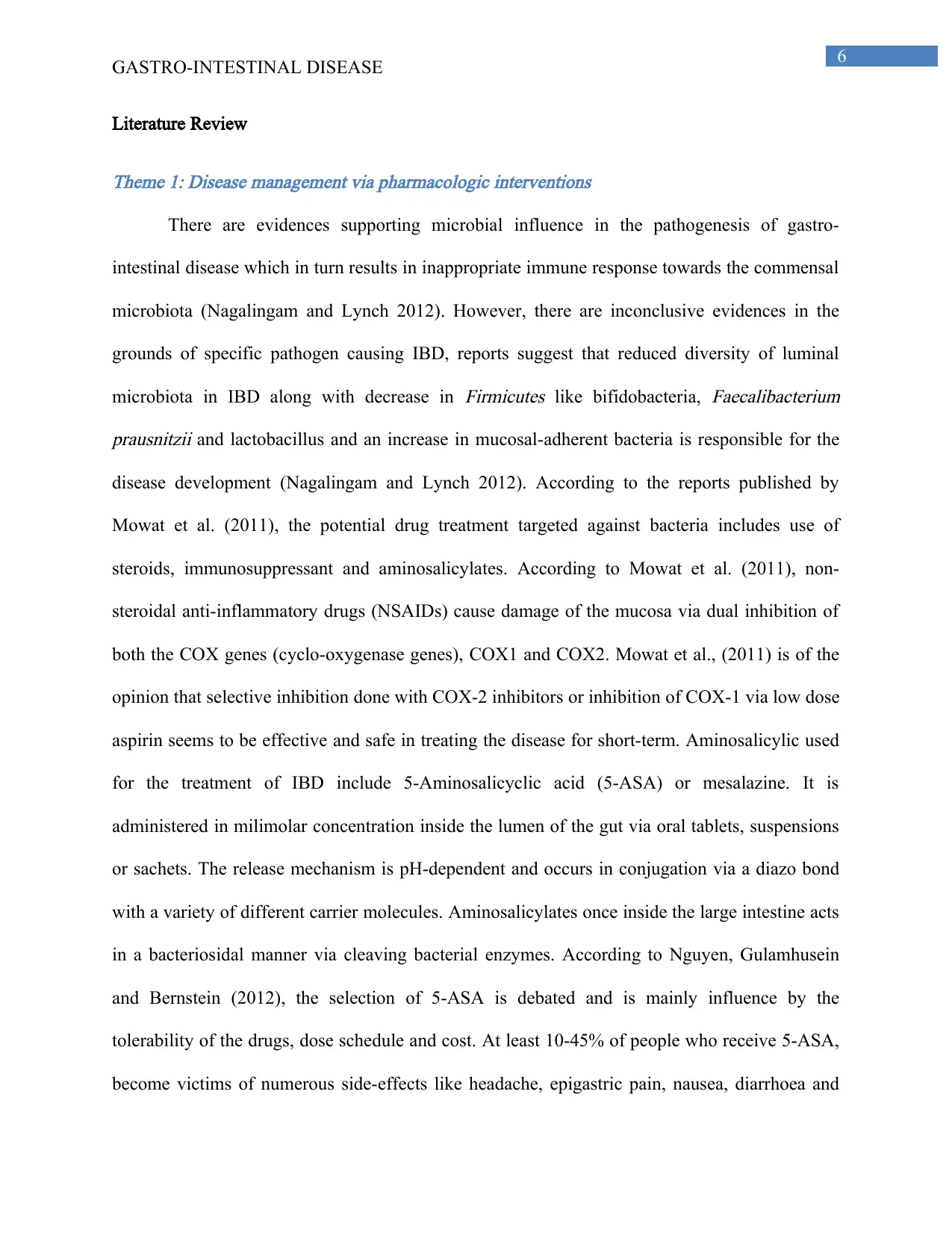
6
GASTRO-INTESTINAL DISEASE
Literature Review
Theme 1: Disease management via pharmacologic interventions
There are evidences supporting microbial influence in the pathogenesis of gastro-
intestinal disease which in turn results in inappropriate immune response towards the commensal
microbiota (Nagalingam and Lynch 2012). However, there are inconclusive evidences in the
grounds of specific pathogen causing IBD, reports suggest that reduced diversity of luminal
microbiota in IBD along with decrease in
Firmicutes like bifidobacteria,
Faecalibacterium
prausnitzii and lactobacillus and an increase in mucosal-adherent bacteria is responsible for the
disease development (Nagalingam and Lynch 2012). According to the reports published by
Mowat et al. (2011), the potential drug treatment targeted against bacteria includes use of
steroids, immunosuppressant and aminosalicylates. According to Mowat et al. (2011), non-
steroidal anti-inflammatory drugs (NSAIDs) cause damage of the mucosa via dual inhibition of
both the COX genes (cyclo-oxygenase genes), COX1 and COX2. Mowat et al., (2011) is of the
opinion that selective inhibition done with COX-2 inhibitors or inhibition of COX-1 via low dose
aspirin seems to be effective and safe in treating the disease for short-term. Aminosalicylic used
for the treatment of IBD include 5-Aminosalicyclic acid (5-ASA) or mesalazine. It is
administered in milimolar concentration inside the lumen of the gut via oral tablets, suspensions
or sachets. The release mechanism is pH-dependent and occurs in conjugation via a diazo bond
with a variety of different carrier molecules. Aminosalicylates once inside the large intestine acts
in a bacteriosidal manner via cleaving bacterial enzymes. According to Nguyen, Gulamhusein
and Bernstein (2012), the selection of 5-ASA is debated and is mainly influence by the
tolerability of the drugs, dose schedule and cost. At least 10-45% of people who receive 5-ASA,
become victims of numerous side-effects like headache, epigastric pain, nausea, diarrhoea and
GASTRO-INTESTINAL DISEASE
Literature Review
Theme 1: Disease management via pharmacologic interventions
There are evidences supporting microbial influence in the pathogenesis of gastro-
intestinal disease which in turn results in inappropriate immune response towards the commensal
microbiota (Nagalingam and Lynch 2012). However, there are inconclusive evidences in the
grounds of specific pathogen causing IBD, reports suggest that reduced diversity of luminal
microbiota in IBD along with decrease in
Firmicutes like bifidobacteria,
Faecalibacterium
prausnitzii and lactobacillus and an increase in mucosal-adherent bacteria is responsible for the
disease development (Nagalingam and Lynch 2012). According to the reports published by
Mowat et al. (2011), the potential drug treatment targeted against bacteria includes use of
steroids, immunosuppressant and aminosalicylates. According to Mowat et al. (2011), non-
steroidal anti-inflammatory drugs (NSAIDs) cause damage of the mucosa via dual inhibition of
both the COX genes (cyclo-oxygenase genes), COX1 and COX2. Mowat et al., (2011) is of the
opinion that selective inhibition done with COX-2 inhibitors or inhibition of COX-1 via low dose
aspirin seems to be effective and safe in treating the disease for short-term. Aminosalicylic used
for the treatment of IBD include 5-Aminosalicyclic acid (5-ASA) or mesalazine. It is
administered in milimolar concentration inside the lumen of the gut via oral tablets, suspensions
or sachets. The release mechanism is pH-dependent and occurs in conjugation via a diazo bond
with a variety of different carrier molecules. Aminosalicylates once inside the large intestine acts
in a bacteriosidal manner via cleaving bacterial enzymes. According to Nguyen, Gulamhusein
and Bernstein (2012), the selection of 5-ASA is debated and is mainly influence by the
tolerability of the drugs, dose schedule and cost. At least 10-45% of people who receive 5-ASA,
become victims of numerous side-effects like headache, epigastric pain, nausea, diarrhoea and
Paraphrase This Document
Need a fresh take? Get an instant paraphrase of this document with our AI Paraphraser
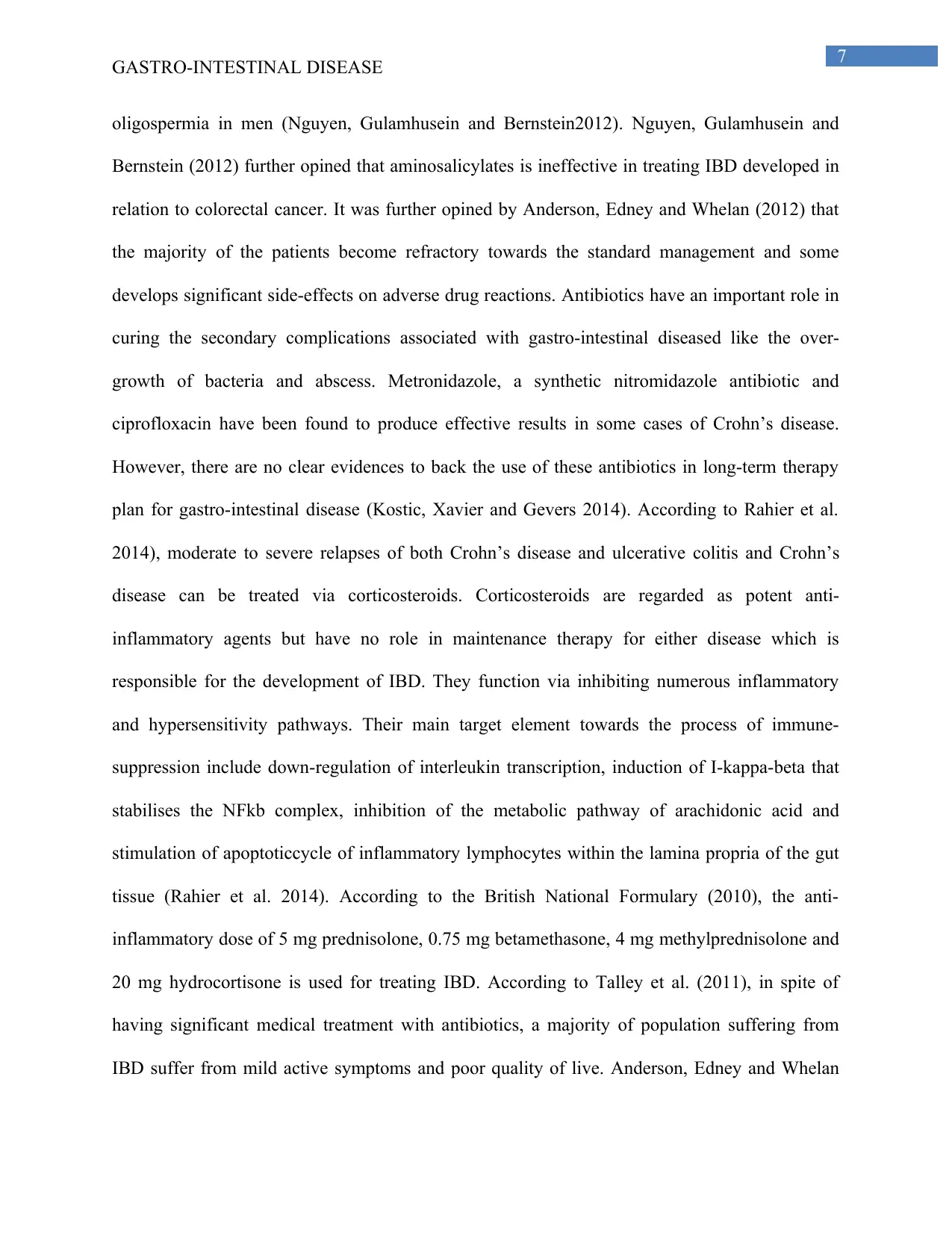
7
GASTRO-INTESTINAL DISEASE
oligospermia in men (Nguyen, Gulamhusein and Bernstein2012). Nguyen, Gulamhusein and
Bernstein (2012) further opined that aminosalicylates is ineffective in treating IBD developed in
relation to colorectal cancer. It was further opined by Anderson, Edney and Whelan (2012) that
the majority of the patients become refractory towards the standard management and some
develops significant side-effects on adverse drug reactions. Antibiotics have an important role in
curing the secondary complications associated with gastro-intestinal diseased like the over-
growth of bacteria and abscess. Metronidazole, a synthetic nitromidazole antibiotic and
ciprofloxacin have been found to produce effective results in some cases of Crohn’s disease.
However, there are no clear evidences to back the use of these antibiotics in long-term therapy
plan for gastro-intestinal disease (Kostic, Xavier and Gevers 2014). According to Rahier et al.
2014), moderate to severe relapses of both Crohn’s disease and ulcerative colitis and Crohn’s
disease can be treated via corticosteroids. Corticosteroids are regarded as potent anti-
inflammatory agents but have no role in maintenance therapy for either disease which is
responsible for the development of IBD. They function via inhibiting numerous inflammatory
and hypersensitivity pathways. Their main target element towards the process of immune-
suppression include down-regulation of interleukin transcription, induction of I-kappa-beta that
stabilises the NFkb complex, inhibition of the metabolic pathway of arachidonic acid and
stimulation of apoptoticcycle of inflammatory lymphocytes within the lamina propria of the gut
tissue (Rahier et al. 2014). According to the British National Formulary (2010), the anti-
inflammatory dose of 5 mg prednisolone, 0.75 mg betamethasone, 4 mg methylprednisolone and
20 mg hydrocortisone is used for treating IBD. According to Talley et al. (2011), in spite of
having significant medical treatment with antibiotics, a majority of population suffering from
IBD suffer from mild active symptoms and poor quality of live. Anderson, Edney and Whelan
GASTRO-INTESTINAL DISEASE
oligospermia in men (Nguyen, Gulamhusein and Bernstein2012). Nguyen, Gulamhusein and
Bernstein (2012) further opined that aminosalicylates is ineffective in treating IBD developed in
relation to colorectal cancer. It was further opined by Anderson, Edney and Whelan (2012) that
the majority of the patients become refractory towards the standard management and some
develops significant side-effects on adverse drug reactions. Antibiotics have an important role in
curing the secondary complications associated with gastro-intestinal diseased like the over-
growth of bacteria and abscess. Metronidazole, a synthetic nitromidazole antibiotic and
ciprofloxacin have been found to produce effective results in some cases of Crohn’s disease.
However, there are no clear evidences to back the use of these antibiotics in long-term therapy
plan for gastro-intestinal disease (Kostic, Xavier and Gevers 2014). According to Rahier et al.
2014), moderate to severe relapses of both Crohn’s disease and ulcerative colitis and Crohn’s
disease can be treated via corticosteroids. Corticosteroids are regarded as potent anti-
inflammatory agents but have no role in maintenance therapy for either disease which is
responsible for the development of IBD. They function via inhibiting numerous inflammatory
and hypersensitivity pathways. Their main target element towards the process of immune-
suppression include down-regulation of interleukin transcription, induction of I-kappa-beta that
stabilises the NFkb complex, inhibition of the metabolic pathway of arachidonic acid and
stimulation of apoptoticcycle of inflammatory lymphocytes within the lamina propria of the gut
tissue (Rahier et al. 2014). According to the British National Formulary (2010), the anti-
inflammatory dose of 5 mg prednisolone, 0.75 mg betamethasone, 4 mg methylprednisolone and
20 mg hydrocortisone is used for treating IBD. According to Talley et al. (2011), in spite of
having significant medical treatment with antibiotics, a majority of population suffering from
IBD suffer from mild active symptoms and poor quality of live. Anderson, Edney and Whelan
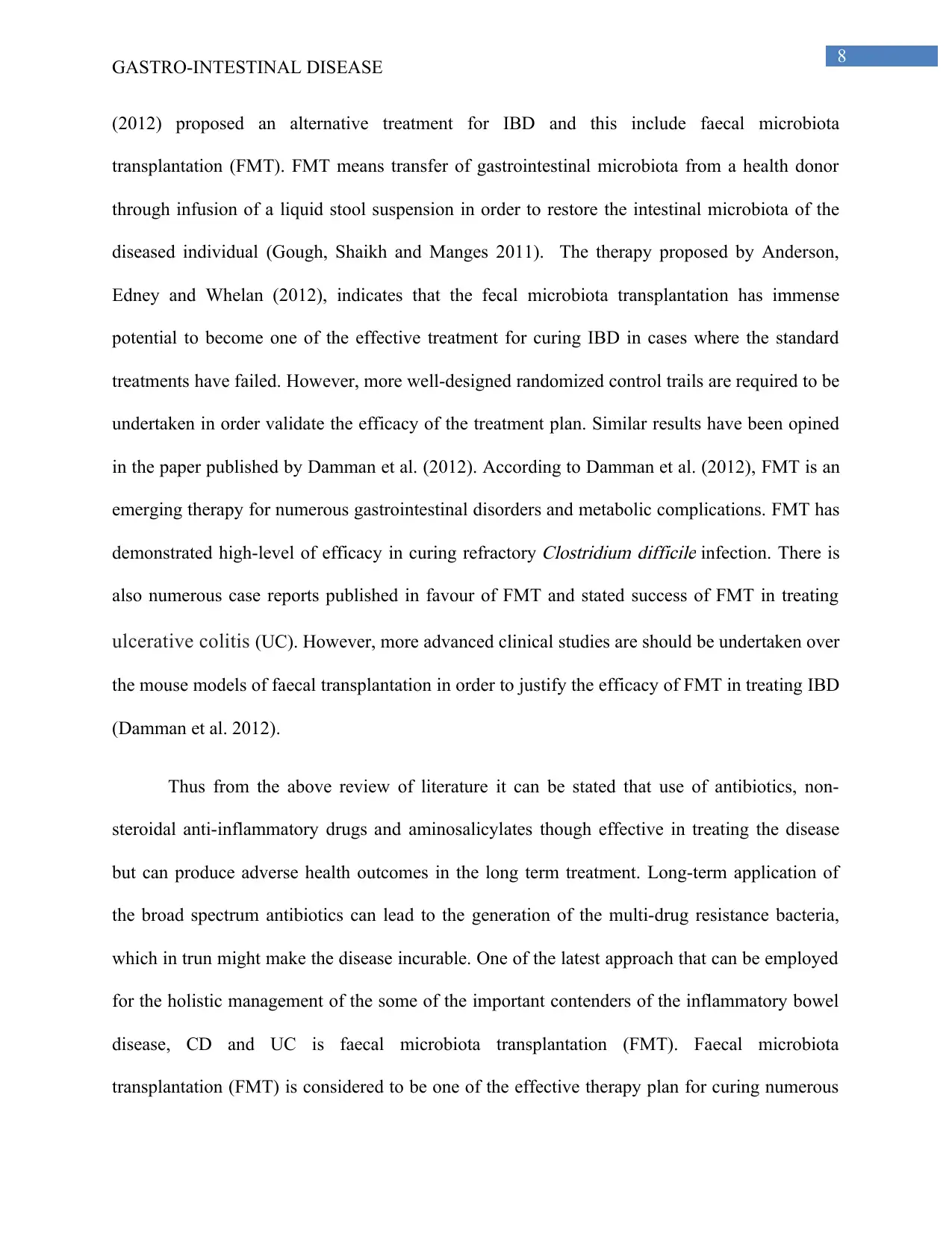
8
GASTRO-INTESTINAL DISEASE
(2012) proposed an alternative treatment for IBD and this include faecal microbiota
transplantation (FMT). FMT means transfer of gastrointestinal microbiota from a health donor
through infusion of a liquid stool suspension in order to restore the intestinal microbiota of the
diseased individual (Gough, Shaikh and Manges 2011). The therapy proposed by Anderson,
Edney and Whelan (2012), indicates that the fecal microbiota transplantation has immense
potential to become one of the effective treatment for curing IBD in cases where the standard
treatments have failed. However, more well-designed randomized control trails are required to be
undertaken in order validate the efficacy of the treatment plan. Similar results have been opined
in the paper published by Damman et al. (2012). According to Damman et al. (2012), FMT is an
emerging therapy for numerous gastrointestinal disorders and metabolic complications. FMT has
demonstrated high-level of efficacy in curing refractory
Clostridium difficile infection. There is
also numerous case reports published in favour of FMT and stated success of FMT in treating
ulcerative colitis (UC). However, more advanced clinical studies are should be undertaken over
the mouse models of faecal transplantation in order to justify the efficacy of FMT in treating IBD
(Damman et al. 2012).
Thus from the above review of literature it can be stated that use of antibiotics, non-
steroidal anti-inflammatory drugs and aminosalicylates though effective in treating the disease
but can produce adverse health outcomes in the long term treatment. Long-term application of
the broad spectrum antibiotics can lead to the generation of the multi-drug resistance bacteria,
which in trun might make the disease incurable. One of the latest approach that can be employed
for the holistic management of the some of the important contenders of the inflammatory bowel
disease, CD and UC is faecal microbiota transplantation (FMT). Faecal microbiota
transplantation (FMT) is considered to be one of the effective therapy plan for curing numerous
GASTRO-INTESTINAL DISEASE
(2012) proposed an alternative treatment for IBD and this include faecal microbiota
transplantation (FMT). FMT means transfer of gastrointestinal microbiota from a health donor
through infusion of a liquid stool suspension in order to restore the intestinal microbiota of the
diseased individual (Gough, Shaikh and Manges 2011). The therapy proposed by Anderson,
Edney and Whelan (2012), indicates that the fecal microbiota transplantation has immense
potential to become one of the effective treatment for curing IBD in cases where the standard
treatments have failed. However, more well-designed randomized control trails are required to be
undertaken in order validate the efficacy of the treatment plan. Similar results have been opined
in the paper published by Damman et al. (2012). According to Damman et al. (2012), FMT is an
emerging therapy for numerous gastrointestinal disorders and metabolic complications. FMT has
demonstrated high-level of efficacy in curing refractory
Clostridium difficile infection. There is
also numerous case reports published in favour of FMT and stated success of FMT in treating
ulcerative colitis (UC). However, more advanced clinical studies are should be undertaken over
the mouse models of faecal transplantation in order to justify the efficacy of FMT in treating IBD
(Damman et al. 2012).
Thus from the above review of literature it can be stated that use of antibiotics, non-
steroidal anti-inflammatory drugs and aminosalicylates though effective in treating the disease
but can produce adverse health outcomes in the long term treatment. Long-term application of
the broad spectrum antibiotics can lead to the generation of the multi-drug resistance bacteria,
which in trun might make the disease incurable. One of the latest approach that can be employed
for the holistic management of the some of the important contenders of the inflammatory bowel
disease, CD and UC is faecal microbiota transplantation (FMT). Faecal microbiota
transplantation (FMT) is considered to be one of the effective therapy plan for curing numerous
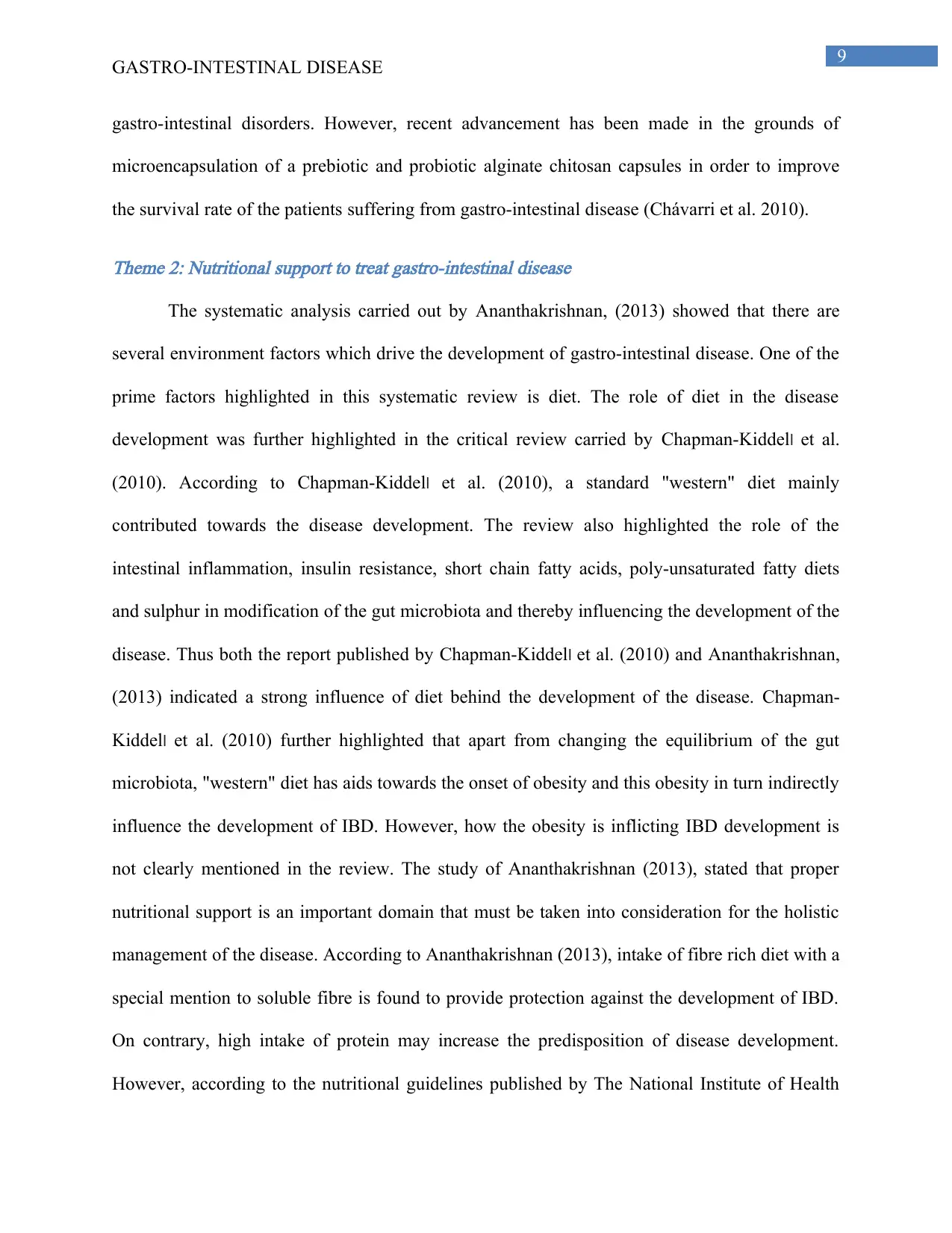
9
GASTRO-INTESTINAL DISEASE
gastro-intestinal disorders. However, recent advancement has been made in the grounds of
microencapsulation of a prebiotic and probiotic alginate chitosan capsules in order to improve
the survival rate of the patients suffering from gastro-intestinal disease (Chávarri et al. 2010).
Theme 2: Nutritional support to treat gastro-intestinal disease
The systematic analysis carried out by Ananthakrishnan, (2013) showed that there are
several environment factors which drive the development of gastro-intestinal disease. One of the
prime factors highlighted in this systematic review is diet. The role of diet in the disease
development was further highlighted in the critical review carried by Chapman‐Kiddell et al.
(2010). According to Chapman‐Kiddell et al. (2010), a standard "western" diet mainly
contributed towards the disease development. The review also highlighted the role of the
intestinal inflammation, insulin resistance, short chain fatty acids, poly-unsaturated fatty diets
and sulphur in modification of the gut microbiota and thereby influencing the development of the
disease. Thus both the report published by Chapman‐Kiddell et al. (2010) and Ananthakrishnan,
(2013) indicated a strong influence of diet behind the development of the disease. Chapman‐
Kiddell et al. (2010) further highlighted that apart from changing the equilibrium of the gut
microbiota, "western" diet has aids towards the onset of obesity and this obesity in turn indirectly
influence the development of IBD. However, how the obesity is inflicting IBD development is
not clearly mentioned in the review. The study of Ananthakrishnan (2013), stated that proper
nutritional support is an important domain that must be taken into consideration for the holistic
management of the disease. According to Ananthakrishnan (2013), intake of fibre rich diet with a
special mention to soluble fibre is found to provide protection against the development of IBD.
On contrary, high intake of protein may increase the predisposition of disease development.
However, according to the nutritional guidelines published by The National Institute of Health
GASTRO-INTESTINAL DISEASE
gastro-intestinal disorders. However, recent advancement has been made in the grounds of
microencapsulation of a prebiotic and probiotic alginate chitosan capsules in order to improve
the survival rate of the patients suffering from gastro-intestinal disease (Chávarri et al. 2010).
Theme 2: Nutritional support to treat gastro-intestinal disease
The systematic analysis carried out by Ananthakrishnan, (2013) showed that there are
several environment factors which drive the development of gastro-intestinal disease. One of the
prime factors highlighted in this systematic review is diet. The role of diet in the disease
development was further highlighted in the critical review carried by Chapman‐Kiddell et al.
(2010). According to Chapman‐Kiddell et al. (2010), a standard "western" diet mainly
contributed towards the disease development. The review also highlighted the role of the
intestinal inflammation, insulin resistance, short chain fatty acids, poly-unsaturated fatty diets
and sulphur in modification of the gut microbiota and thereby influencing the development of the
disease. Thus both the report published by Chapman‐Kiddell et al. (2010) and Ananthakrishnan,
(2013) indicated a strong influence of diet behind the development of the disease. Chapman‐
Kiddell et al. (2010) further highlighted that apart from changing the equilibrium of the gut
microbiota, "western" diet has aids towards the onset of obesity and this obesity in turn indirectly
influence the development of IBD. However, how the obesity is inflicting IBD development is
not clearly mentioned in the review. The study of Ananthakrishnan (2013), stated that proper
nutritional support is an important domain that must be taken into consideration for the holistic
management of the disease. According to Ananthakrishnan (2013), intake of fibre rich diet with a
special mention to soluble fibre is found to provide protection against the development of IBD.
On contrary, high intake of protein may increase the predisposition of disease development.
However, according to the nutritional guidelines published by The National Institute of Health
Secure Best Marks with AI Grader
Need help grading? Try our AI Grader for instant feedback on your assignments.
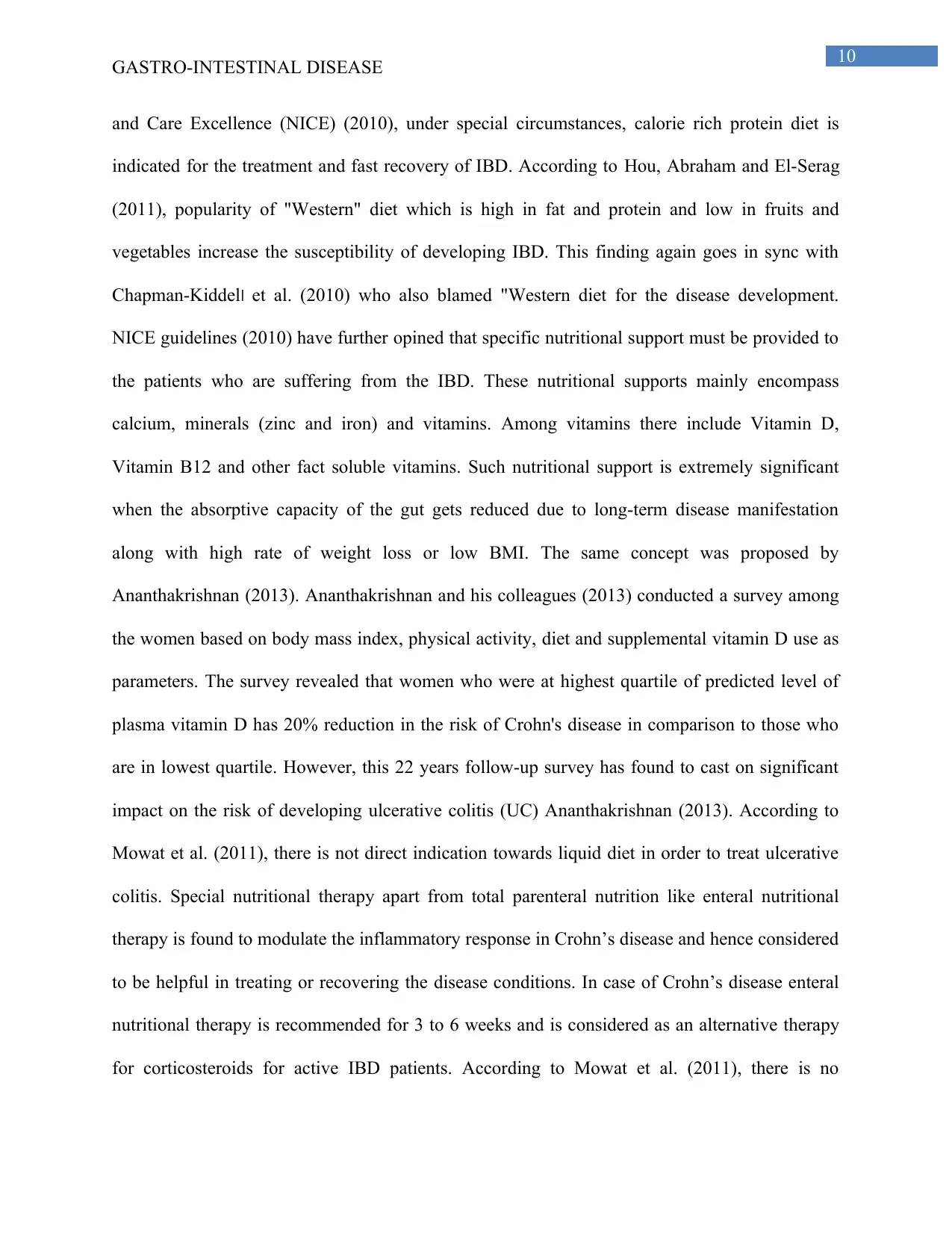
10
GASTRO-INTESTINAL DISEASE
and Care Excellence (NICE) (2010), under special circumstances, calorie rich protein diet is
indicated for the treatment and fast recovery of IBD. According to Hou, Abraham and El-Serag
(2011), popularity of "Western" diet which is high in fat and protein and low in fruits and
vegetables increase the susceptibility of developing IBD. This finding again goes in sync with
Chapman‐Kiddell et al. (2010) who also blamed "Western diet for the disease development.
NICE guidelines (2010) have further opined that specific nutritional support must be provided to
the patients who are suffering from the IBD. These nutritional supports mainly encompass
calcium, minerals (zinc and iron) and vitamins. Among vitamins there include Vitamin D,
Vitamin B12 and other fact soluble vitamins. Such nutritional support is extremely significant
when the absorptive capacity of the gut gets reduced due to long-term disease manifestation
along with high rate of weight loss or low BMI. The same concept was proposed by
Ananthakrishnan (2013). Ananthakrishnan and his colleagues (2013) conducted a survey among
the women based on body mass index, physical activity, diet and supplemental vitamin D use as
parameters. The survey revealed that women who were at highest quartile of predicted level of
plasma vitamin D has 20% reduction in the risk of Crohn's disease in comparison to those who
are in lowest quartile. However, this 22 years follow-up survey has found to cast on significant
impact on the risk of developing ulcerative colitis (UC) Ananthakrishnan (2013). According to
Mowat et al. (2011), there is not direct indication towards liquid diet in order to treat ulcerative
colitis. Special nutritional therapy apart from total parenteral nutrition like enteral nutritional
therapy is found to modulate the inflammatory response in Crohn’s disease and hence considered
to be helpful in treating or recovering the disease conditions. In case of Crohn’s disease enteral
nutritional therapy is recommended for 3 to 6 weeks and is considered as an alternative therapy
for corticosteroids for active IBD patients. According to Mowat et al. (2011), there is no
GASTRO-INTESTINAL DISEASE
and Care Excellence (NICE) (2010), under special circumstances, calorie rich protein diet is
indicated for the treatment and fast recovery of IBD. According to Hou, Abraham and El-Serag
(2011), popularity of "Western" diet which is high in fat and protein and low in fruits and
vegetables increase the susceptibility of developing IBD. This finding again goes in sync with
Chapman‐Kiddell et al. (2010) who also blamed "Western diet for the disease development.
NICE guidelines (2010) have further opined that specific nutritional support must be provided to
the patients who are suffering from the IBD. These nutritional supports mainly encompass
calcium, minerals (zinc and iron) and vitamins. Among vitamins there include Vitamin D,
Vitamin B12 and other fact soluble vitamins. Such nutritional support is extremely significant
when the absorptive capacity of the gut gets reduced due to long-term disease manifestation
along with high rate of weight loss or low BMI. The same concept was proposed by
Ananthakrishnan (2013). Ananthakrishnan and his colleagues (2013) conducted a survey among
the women based on body mass index, physical activity, diet and supplemental vitamin D use as
parameters. The survey revealed that women who were at highest quartile of predicted level of
plasma vitamin D has 20% reduction in the risk of Crohn's disease in comparison to those who
are in lowest quartile. However, this 22 years follow-up survey has found to cast on significant
impact on the risk of developing ulcerative colitis (UC) Ananthakrishnan (2013). According to
Mowat et al. (2011), there is not direct indication towards liquid diet in order to treat ulcerative
colitis. Special nutritional therapy apart from total parenteral nutrition like enteral nutritional
therapy is found to modulate the inflammatory response in Crohn’s disease and hence considered
to be helpful in treating or recovering the disease conditions. In case of Crohn’s disease enteral
nutritional therapy is recommended for 3 to 6 weeks and is considered as an alternative therapy
for corticosteroids for active IBD patients. According to Mowat et al. (2011), there is no
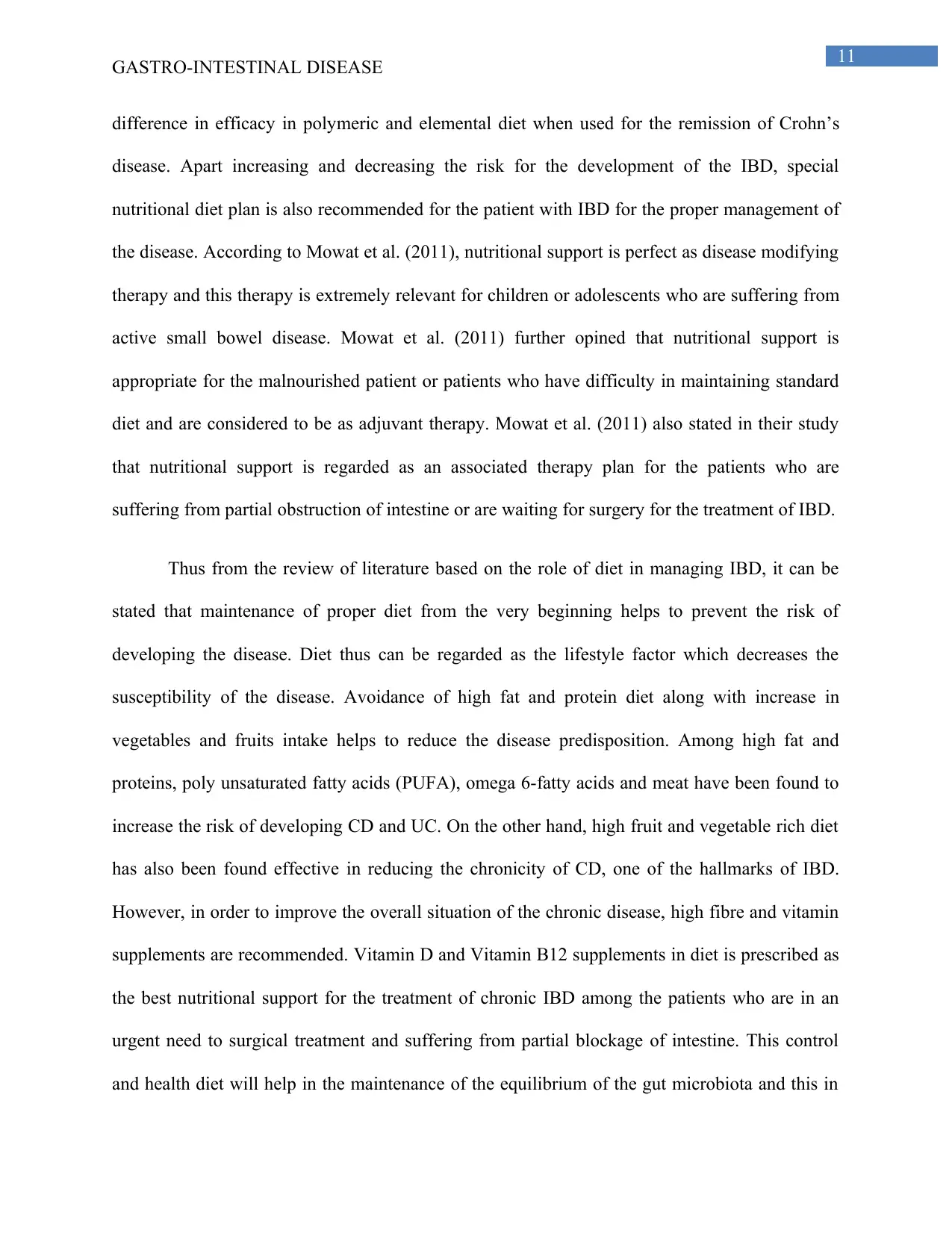
11
GASTRO-INTESTINAL DISEASE
difference in efficacy in polymeric and elemental diet when used for the remission of Crohn’s
disease. Apart increasing and decreasing the risk for the development of the IBD, special
nutritional diet plan is also recommended for the patient with IBD for the proper management of
the disease. According to Mowat et al. (2011), nutritional support is perfect as disease modifying
therapy and this therapy is extremely relevant for children or adolescents who are suffering from
active small bowel disease. Mowat et al. (2011) further opined that nutritional support is
appropriate for the malnourished patient or patients who have difficulty in maintaining standard
diet and are considered to be as adjuvant therapy. Mowat et al. (2011) also stated in their study
that nutritional support is regarded as an associated therapy plan for the patients who are
suffering from partial obstruction of intestine or are waiting for surgery for the treatment of IBD.
Thus from the review of literature based on the role of diet in managing IBD, it can be
stated that maintenance of proper diet from the very beginning helps to prevent the risk of
developing the disease. Diet thus can be regarded as the lifestyle factor which decreases the
susceptibility of the disease. Avoidance of high fat and protein diet along with increase in
vegetables and fruits intake helps to reduce the disease predisposition. Among high fat and
proteins, poly unsaturated fatty acids (PUFA), omega 6-fatty acids and meat have been found to
increase the risk of developing CD and UC. On the other hand, high fruit and vegetable rich diet
has also been found effective in reducing the chronicity of CD, one of the hallmarks of IBD.
However, in order to improve the overall situation of the chronic disease, high fibre and vitamin
supplements are recommended. Vitamin D and Vitamin B12 supplements in diet is prescribed as
the best nutritional support for the treatment of chronic IBD among the patients who are in an
urgent need to surgical treatment and suffering from partial blockage of intestine. This control
and health diet will help in the maintenance of the equilibrium of the gut microbiota and this in
GASTRO-INTESTINAL DISEASE
difference in efficacy in polymeric and elemental diet when used for the remission of Crohn’s
disease. Apart increasing and decreasing the risk for the development of the IBD, special
nutritional diet plan is also recommended for the patient with IBD for the proper management of
the disease. According to Mowat et al. (2011), nutritional support is perfect as disease modifying
therapy and this therapy is extremely relevant for children or adolescents who are suffering from
active small bowel disease. Mowat et al. (2011) further opined that nutritional support is
appropriate for the malnourished patient or patients who have difficulty in maintaining standard
diet and are considered to be as adjuvant therapy. Mowat et al. (2011) also stated in their study
that nutritional support is regarded as an associated therapy plan for the patients who are
suffering from partial obstruction of intestine or are waiting for surgery for the treatment of IBD.
Thus from the review of literature based on the role of diet in managing IBD, it can be
stated that maintenance of proper diet from the very beginning helps to prevent the risk of
developing the disease. Diet thus can be regarded as the lifestyle factor which decreases the
susceptibility of the disease. Avoidance of high fat and protein diet along with increase in
vegetables and fruits intake helps to reduce the disease predisposition. Among high fat and
proteins, poly unsaturated fatty acids (PUFA), omega 6-fatty acids and meat have been found to
increase the risk of developing CD and UC. On the other hand, high fruit and vegetable rich diet
has also been found effective in reducing the chronicity of CD, one of the hallmarks of IBD.
However, in order to improve the overall situation of the chronic disease, high fibre and vitamin
supplements are recommended. Vitamin D and Vitamin B12 supplements in diet is prescribed as
the best nutritional support for the treatment of chronic IBD among the patients who are in an
urgent need to surgical treatment and suffering from partial blockage of intestine. This control
and health diet will help in the maintenance of the equilibrium of the gut microbiota and this in
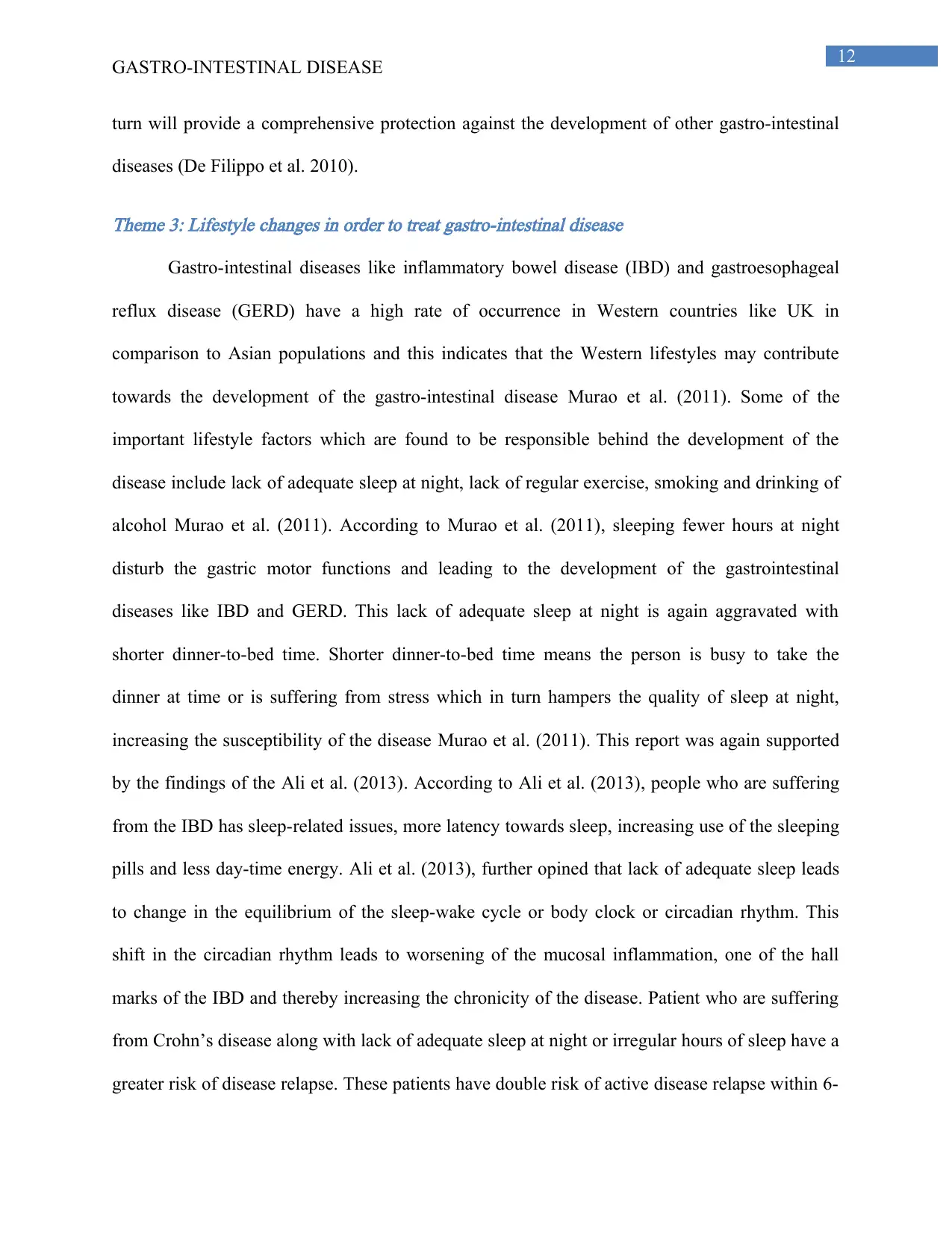
12
GASTRO-INTESTINAL DISEASE
turn will provide a comprehensive protection against the development of other gastro-intestinal
diseases (De Filippo et al. 2010).
Theme 3: Lifestyle changes in order to treat gastro-intestinal disease
Gastro-intestinal diseases like inflammatory bowel disease (IBD) and gastroesophageal
reflux disease (GERD) have a high rate of occurrence in Western countries like UK in
comparison to Asian populations and this indicates that the Western lifestyles may contribute
towards the development of the gastro-intestinal disease Murao et al. (2011). Some of the
important lifestyle factors which are found to be responsible behind the development of the
disease include lack of adequate sleep at night, lack of regular exercise, smoking and drinking of
alcohol Murao et al. (2011). According to Murao et al. (2011), sleeping fewer hours at night
disturb the gastric motor functions and leading to the development of the gastrointestinal
diseases like IBD and GERD. This lack of adequate sleep at night is again aggravated with
shorter dinner-to-bed time. Shorter dinner-to-bed time means the person is busy to take the
dinner at time or is suffering from stress which in turn hampers the quality of sleep at night,
increasing the susceptibility of the disease Murao et al. (2011). This report was again supported
by the findings of the Ali et al. (2013). According to Ali et al. (2013), people who are suffering
from the IBD has sleep-related issues, more latency towards sleep, increasing use of the sleeping
pills and less day-time energy. Ali et al. (2013), further opined that lack of adequate sleep leads
to change in the equilibrium of the sleep-wake cycle or body clock or circadian rhythm. This
shift in the circadian rhythm leads to worsening of the mucosal inflammation, one of the hall
marks of the IBD and thereby increasing the chronicity of the disease. Patient who are suffering
from Crohn’s disease along with lack of adequate sleep at night or irregular hours of sleep have a
greater risk of disease relapse. These patients have double risk of active disease relapse within 6-
GASTRO-INTESTINAL DISEASE
turn will provide a comprehensive protection against the development of other gastro-intestinal
diseases (De Filippo et al. 2010).
Theme 3: Lifestyle changes in order to treat gastro-intestinal disease
Gastro-intestinal diseases like inflammatory bowel disease (IBD) and gastroesophageal
reflux disease (GERD) have a high rate of occurrence in Western countries like UK in
comparison to Asian populations and this indicates that the Western lifestyles may contribute
towards the development of the gastro-intestinal disease Murao et al. (2011). Some of the
important lifestyle factors which are found to be responsible behind the development of the
disease include lack of adequate sleep at night, lack of regular exercise, smoking and drinking of
alcohol Murao et al. (2011). According to Murao et al. (2011), sleeping fewer hours at night
disturb the gastric motor functions and leading to the development of the gastrointestinal
diseases like IBD and GERD. This lack of adequate sleep at night is again aggravated with
shorter dinner-to-bed time. Shorter dinner-to-bed time means the person is busy to take the
dinner at time or is suffering from stress which in turn hampers the quality of sleep at night,
increasing the susceptibility of the disease Murao et al. (2011). This report was again supported
by the findings of the Ali et al. (2013). According to Ali et al. (2013), people who are suffering
from the IBD has sleep-related issues, more latency towards sleep, increasing use of the sleeping
pills and less day-time energy. Ali et al. (2013), further opined that lack of adequate sleep leads
to change in the equilibrium of the sleep-wake cycle or body clock or circadian rhythm. This
shift in the circadian rhythm leads to worsening of the mucosal inflammation, one of the hall
marks of the IBD and thereby increasing the chronicity of the disease. Patient who are suffering
from Crohn’s disease along with lack of adequate sleep at night or irregular hours of sleep have a
greater risk of disease relapse. These patients have double risk of active disease relapse within 6-
Paraphrase This Document
Need a fresh take? Get an instant paraphrase of this document with our AI Paraphraser
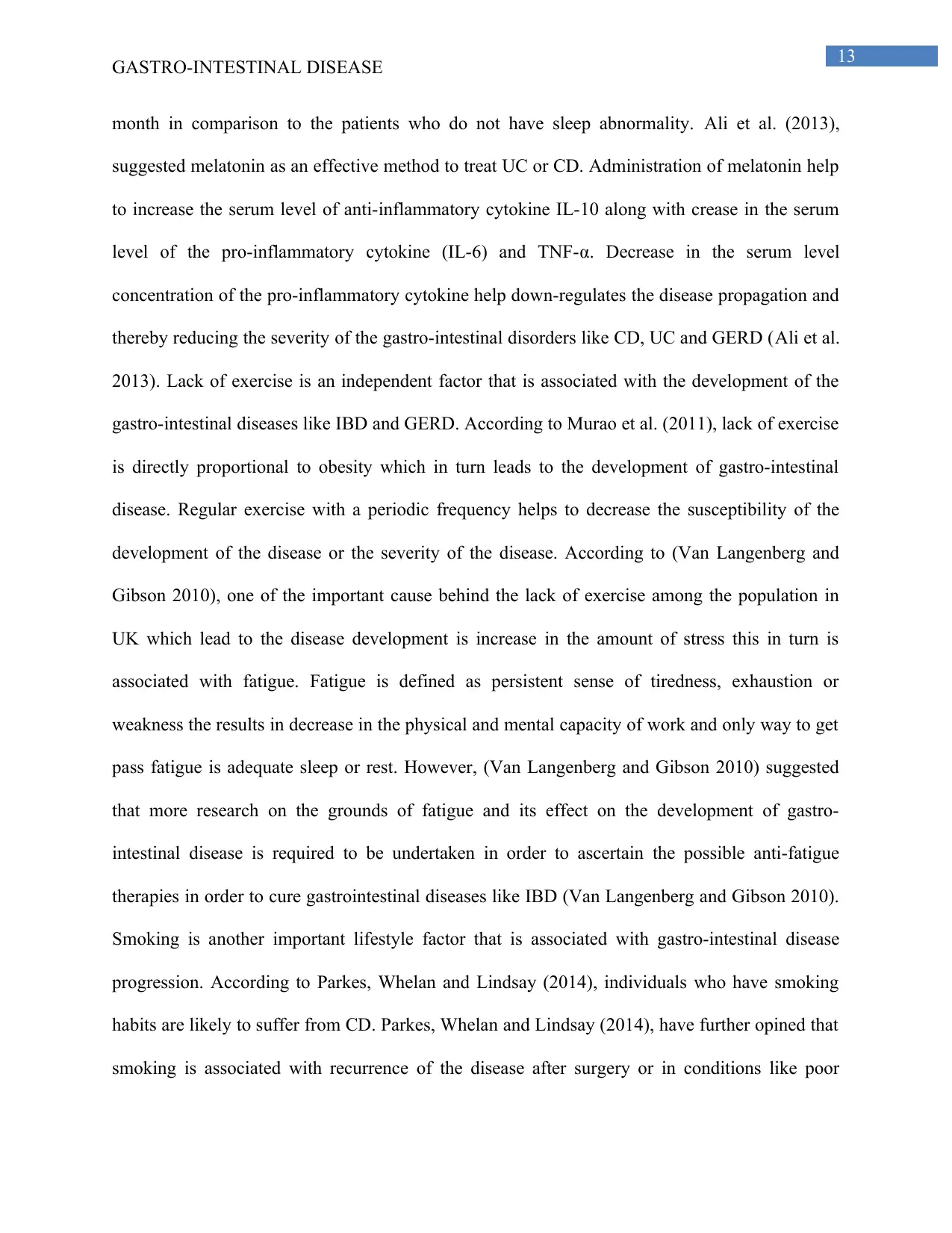
13
GASTRO-INTESTINAL DISEASE
month in comparison to the patients who do not have sleep abnormality. Ali et al. (2013),
suggested melatonin as an effective method to treat UC or CD. Administration of melatonin help
to increase the serum level of anti-inflammatory cytokine IL-10 along with crease in the serum
level of the pro-inflammatory cytokine (IL-6) and TNF-α. Decrease in the serum level
concentration of the pro-inflammatory cytokine help down-regulates the disease propagation and
thereby reducing the severity of the gastro-intestinal disorders like CD, UC and GERD (Ali et al.
2013). Lack of exercise is an independent factor that is associated with the development of the
gastro-intestinal diseases like IBD and GERD. According to Murao et al. (2011), lack of exercise
is directly proportional to obesity which in turn leads to the development of gastro-intestinal
disease. Regular exercise with a periodic frequency helps to decrease the susceptibility of the
development of the disease or the severity of the disease. According to (Van Langenberg and
Gibson 2010), one of the important cause behind the lack of exercise among the population in
UK which lead to the disease development is increase in the amount of stress this in turn is
associated with fatigue. Fatigue is defined as persistent sense of tiredness, exhaustion or
weakness the results in decrease in the physical and mental capacity of work and only way to get
pass fatigue is adequate sleep or rest. However, (Van Langenberg and Gibson 2010) suggested
that more research on the grounds of fatigue and its effect on the development of gastro-
intestinal disease is required to be undertaken in order to ascertain the possible anti-fatigue
therapies in order to cure gastrointestinal diseases like IBD (Van Langenberg and Gibson 2010).
Smoking is another important lifestyle factor that is associated with gastro-intestinal disease
progression. According to Parkes, Whelan and Lindsay (2014), individuals who have smoking
habits are likely to suffer from CD. Parkes, Whelan and Lindsay (2014), have further opined that
smoking is associated with recurrence of the disease after surgery or in conditions like poor
GASTRO-INTESTINAL DISEASE
month in comparison to the patients who do not have sleep abnormality. Ali et al. (2013),
suggested melatonin as an effective method to treat UC or CD. Administration of melatonin help
to increase the serum level of anti-inflammatory cytokine IL-10 along with crease in the serum
level of the pro-inflammatory cytokine (IL-6) and TNF-α. Decrease in the serum level
concentration of the pro-inflammatory cytokine help down-regulates the disease propagation and
thereby reducing the severity of the gastro-intestinal disorders like CD, UC and GERD (Ali et al.
2013). Lack of exercise is an independent factor that is associated with the development of the
gastro-intestinal diseases like IBD and GERD. According to Murao et al. (2011), lack of exercise
is directly proportional to obesity which in turn leads to the development of gastro-intestinal
disease. Regular exercise with a periodic frequency helps to decrease the susceptibility of the
development of the disease or the severity of the disease. According to (Van Langenberg and
Gibson 2010), one of the important cause behind the lack of exercise among the population in
UK which lead to the disease development is increase in the amount of stress this in turn is
associated with fatigue. Fatigue is defined as persistent sense of tiredness, exhaustion or
weakness the results in decrease in the physical and mental capacity of work and only way to get
pass fatigue is adequate sleep or rest. However, (Van Langenberg and Gibson 2010) suggested
that more research on the grounds of fatigue and its effect on the development of gastro-
intestinal disease is required to be undertaken in order to ascertain the possible anti-fatigue
therapies in order to cure gastrointestinal diseases like IBD (Van Langenberg and Gibson 2010).
Smoking is another important lifestyle factor that is associated with gastro-intestinal disease
progression. According to Parkes, Whelan and Lindsay (2014), individuals who have smoking
habits are likely to suffer from CD. Parkes, Whelan and Lindsay (2014), have further opined that
smoking is associated with recurrence of the disease after surgery or in conditions like poor
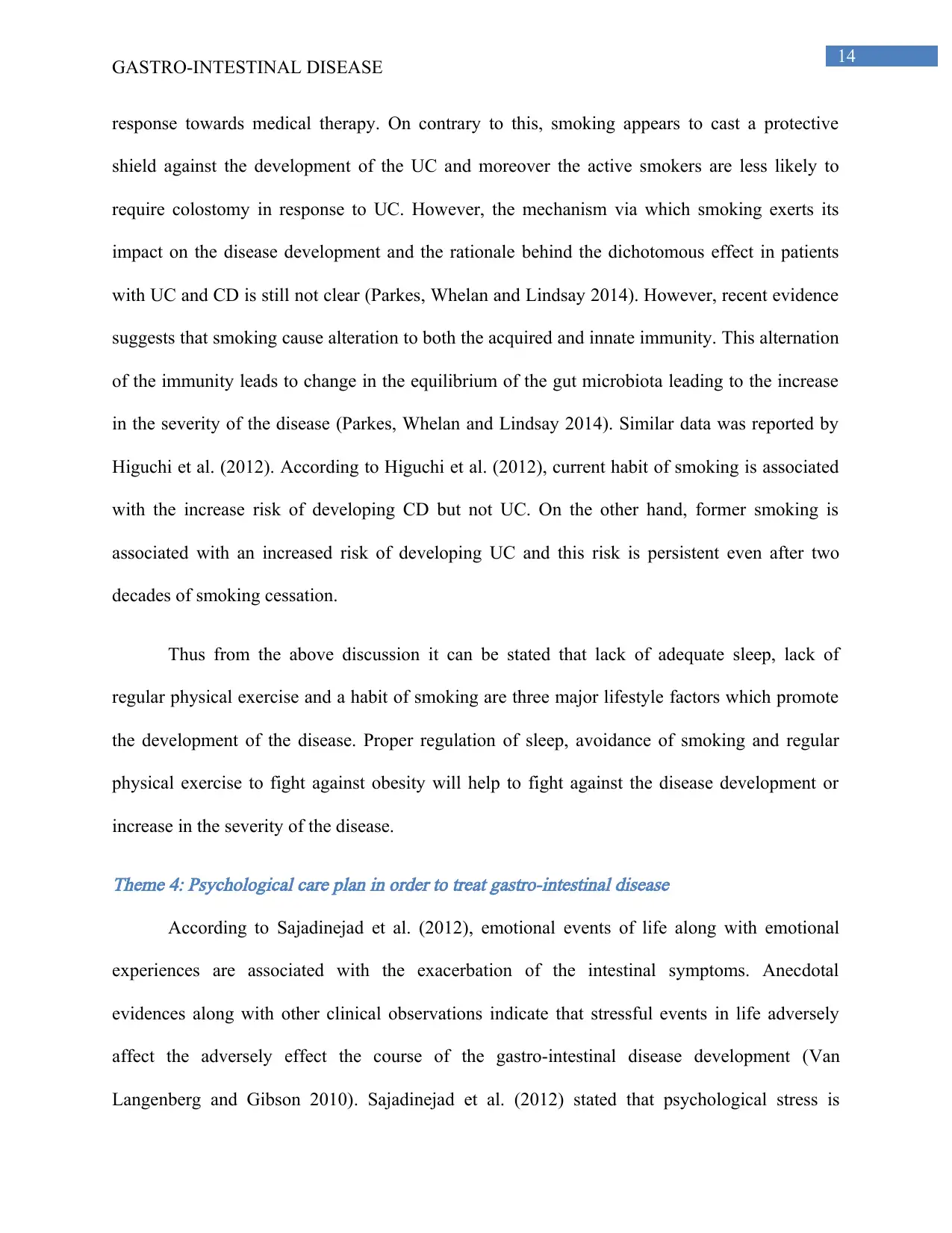
14
GASTRO-INTESTINAL DISEASE
response towards medical therapy. On contrary to this, smoking appears to cast a protective
shield against the development of the UC and moreover the active smokers are less likely to
require colostomy in response to UC. However, the mechanism via which smoking exerts its
impact on the disease development and the rationale behind the dichotomous effect in patients
with UC and CD is still not clear (Parkes, Whelan and Lindsay 2014). However, recent evidence
suggests that smoking cause alteration to both the acquired and innate immunity. This alternation
of the immunity leads to change in the equilibrium of the gut microbiota leading to the increase
in the severity of the disease (Parkes, Whelan and Lindsay 2014). Similar data was reported by
Higuchi et al. (2012). According to Higuchi et al. (2012), current habit of smoking is associated
with the increase risk of developing CD but not UC. On the other hand, former smoking is
associated with an increased risk of developing UC and this risk is persistent even after two
decades of smoking cessation.
Thus from the above discussion it can be stated that lack of adequate sleep, lack of
regular physical exercise and a habit of smoking are three major lifestyle factors which promote
the development of the disease. Proper regulation of sleep, avoidance of smoking and regular
physical exercise to fight against obesity will help to fight against the disease development or
increase in the severity of the disease.
Theme 4: Psychological care plan in order to treat gastro-intestinal disease
According to Sajadinejad et al. (2012), emotional events of life along with emotional
experiences are associated with the exacerbation of the intestinal symptoms. Anecdotal
evidences along with other clinical observations indicate that stressful events in life adversely
affect the adversely effect the course of the gastro-intestinal disease development (Van
Langenberg and Gibson 2010). Sajadinejad et al. (2012) stated that psychological stress is
GASTRO-INTESTINAL DISEASE
response towards medical therapy. On contrary to this, smoking appears to cast a protective
shield against the development of the UC and moreover the active smokers are less likely to
require colostomy in response to UC. However, the mechanism via which smoking exerts its
impact on the disease development and the rationale behind the dichotomous effect in patients
with UC and CD is still not clear (Parkes, Whelan and Lindsay 2014). However, recent evidence
suggests that smoking cause alteration to both the acquired and innate immunity. This alternation
of the immunity leads to change in the equilibrium of the gut microbiota leading to the increase
in the severity of the disease (Parkes, Whelan and Lindsay 2014). Similar data was reported by
Higuchi et al. (2012). According to Higuchi et al. (2012), current habit of smoking is associated
with the increase risk of developing CD but not UC. On the other hand, former smoking is
associated with an increased risk of developing UC and this risk is persistent even after two
decades of smoking cessation.
Thus from the above discussion it can be stated that lack of adequate sleep, lack of
regular physical exercise and a habit of smoking are three major lifestyle factors which promote
the development of the disease. Proper regulation of sleep, avoidance of smoking and regular
physical exercise to fight against obesity will help to fight against the disease development or
increase in the severity of the disease.
Theme 4: Psychological care plan in order to treat gastro-intestinal disease
According to Sajadinejad et al. (2012), emotional events of life along with emotional
experiences are associated with the exacerbation of the intestinal symptoms. Anecdotal
evidences along with other clinical observations indicate that stressful events in life adversely
affect the adversely effect the course of the gastro-intestinal disease development (Van
Langenberg and Gibson 2010). Sajadinejad et al. (2012) stated that psychological stress is
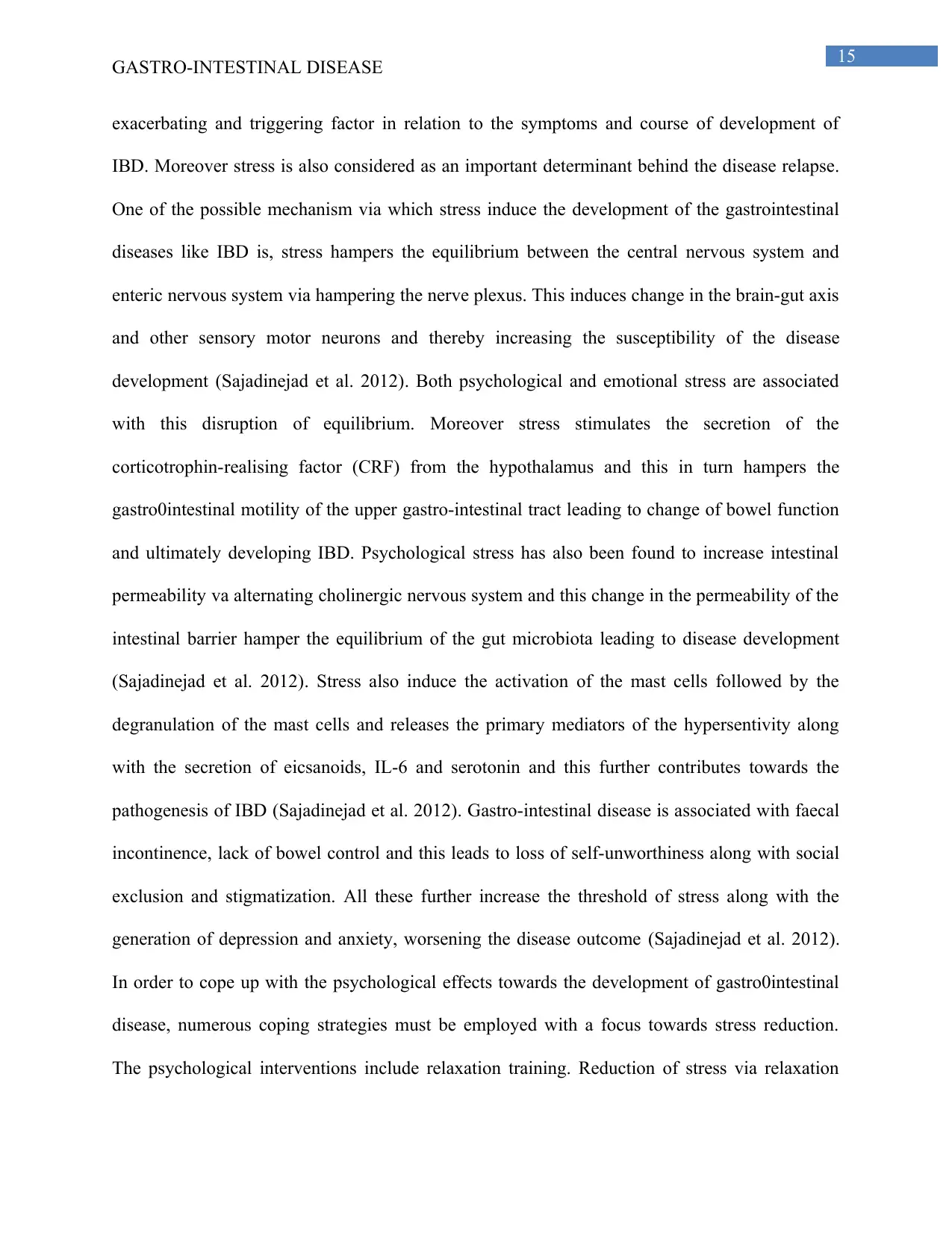
15
GASTRO-INTESTINAL DISEASE
exacerbating and triggering factor in relation to the symptoms and course of development of
IBD. Moreover stress is also considered as an important determinant behind the disease relapse.
One of the possible mechanism via which stress induce the development of the gastrointestinal
diseases like IBD is, stress hampers the equilibrium between the central nervous system and
enteric nervous system via hampering the nerve plexus. This induces change in the brain-gut axis
and other sensory motor neurons and thereby increasing the susceptibility of the disease
development (Sajadinejad et al. 2012). Both psychological and emotional stress are associated
with this disruption of equilibrium. Moreover stress stimulates the secretion of the
corticotrophin-realising factor (CRF) from the hypothalamus and this in turn hampers the
gastro0intestinal motility of the upper gastro-intestinal tract leading to change of bowel function
and ultimately developing IBD. Psychological stress has also been found to increase intestinal
permeability va alternating cholinergic nervous system and this change in the permeability of the
intestinal barrier hamper the equilibrium of the gut microbiota leading to disease development
(Sajadinejad et al. 2012). Stress also induce the activation of the mast cells followed by the
degranulation of the mast cells and releases the primary mediators of the hypersentivity along
with the secretion of eicsanoids, IL-6 and serotonin and this further contributes towards the
pathogenesis of IBD (Sajadinejad et al. 2012). Gastro-intestinal disease is associated with faecal
incontinence, lack of bowel control and this leads to loss of self-unworthiness along with social
exclusion and stigmatization. All these further increase the threshold of stress along with the
generation of depression and anxiety, worsening the disease outcome (Sajadinejad et al. 2012).
In order to cope up with the psychological effects towards the development of gastro0intestinal
disease, numerous coping strategies must be employed with a focus towards stress reduction.
The psychological interventions include relaxation training. Reduction of stress via relaxation
GASTRO-INTESTINAL DISEASE
exacerbating and triggering factor in relation to the symptoms and course of development of
IBD. Moreover stress is also considered as an important determinant behind the disease relapse.
One of the possible mechanism via which stress induce the development of the gastrointestinal
diseases like IBD is, stress hampers the equilibrium between the central nervous system and
enteric nervous system via hampering the nerve plexus. This induces change in the brain-gut axis
and other sensory motor neurons and thereby increasing the susceptibility of the disease
development (Sajadinejad et al. 2012). Both psychological and emotional stress are associated
with this disruption of equilibrium. Moreover stress stimulates the secretion of the
corticotrophin-realising factor (CRF) from the hypothalamus and this in turn hampers the
gastro0intestinal motility of the upper gastro-intestinal tract leading to change of bowel function
and ultimately developing IBD. Psychological stress has also been found to increase intestinal
permeability va alternating cholinergic nervous system and this change in the permeability of the
intestinal barrier hamper the equilibrium of the gut microbiota leading to disease development
(Sajadinejad et al. 2012). Stress also induce the activation of the mast cells followed by the
degranulation of the mast cells and releases the primary mediators of the hypersentivity along
with the secretion of eicsanoids, IL-6 and serotonin and this further contributes towards the
pathogenesis of IBD (Sajadinejad et al. 2012). Gastro-intestinal disease is associated with faecal
incontinence, lack of bowel control and this leads to loss of self-unworthiness along with social
exclusion and stigmatization. All these further increase the threshold of stress along with the
generation of depression and anxiety, worsening the disease outcome (Sajadinejad et al. 2012).
In order to cope up with the psychological effects towards the development of gastro0intestinal
disease, numerous coping strategies must be employed with a focus towards stress reduction.
The psychological interventions include relaxation training. Reduction of stress via relaxation
Secure Best Marks with AI Grader
Need help grading? Try our AI Grader for instant feedback on your assignments.
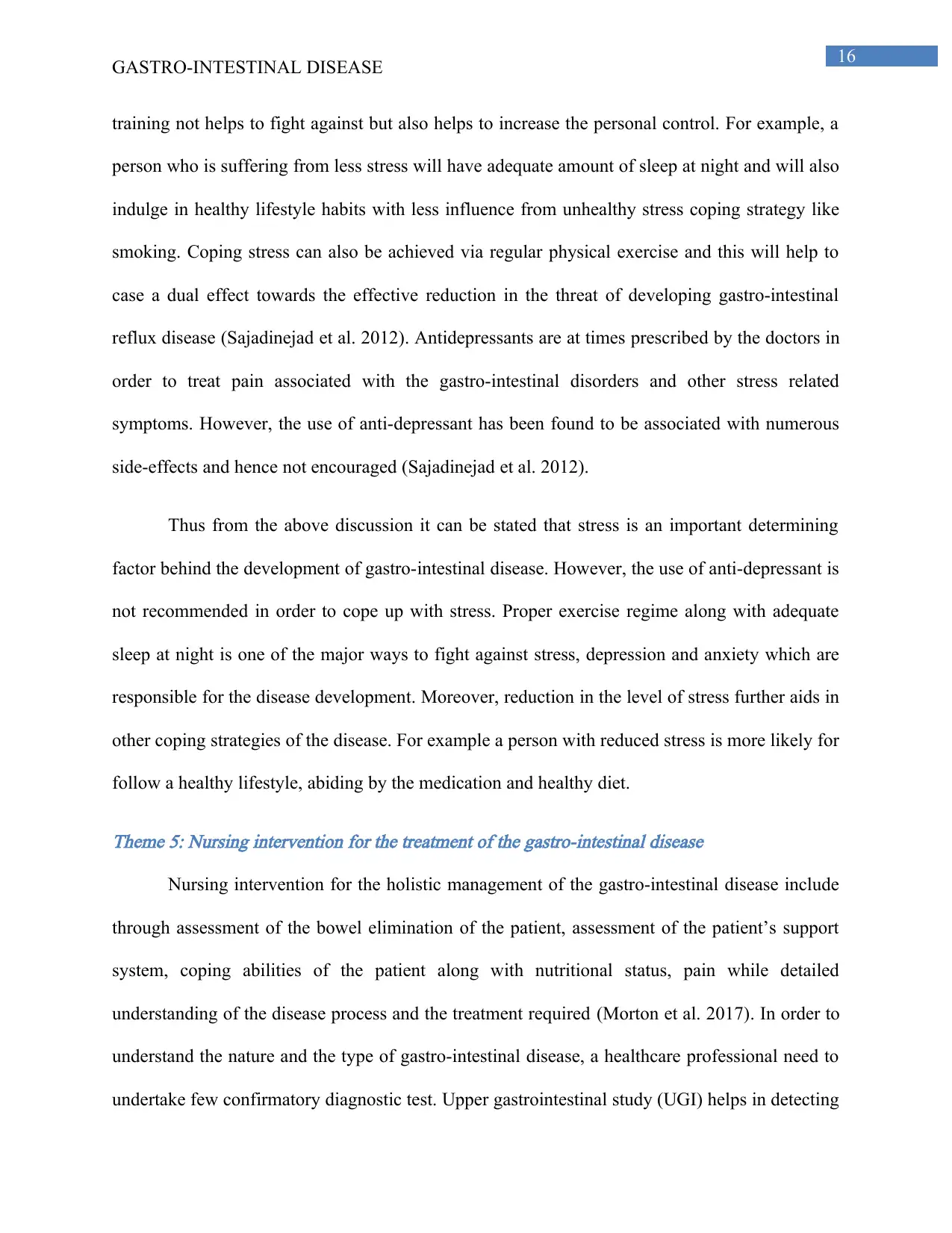
16
GASTRO-INTESTINAL DISEASE
training not helps to fight against but also helps to increase the personal control. For example, a
person who is suffering from less stress will have adequate amount of sleep at night and will also
indulge in healthy lifestyle habits with less influence from unhealthy stress coping strategy like
smoking. Coping stress can also be achieved via regular physical exercise and this will help to
case a dual effect towards the effective reduction in the threat of developing gastro-intestinal
reflux disease (Sajadinejad et al. 2012). Antidepressants are at times prescribed by the doctors in
order to treat pain associated with the gastro-intestinal disorders and other stress related
symptoms. However, the use of anti-depressant has been found to be associated with numerous
side-effects and hence not encouraged (Sajadinejad et al. 2012).
Thus from the above discussion it can be stated that stress is an important determining
factor behind the development of gastro-intestinal disease. However, the use of anti-depressant is
not recommended in order to cope up with stress. Proper exercise regime along with adequate
sleep at night is one of the major ways to fight against stress, depression and anxiety which are
responsible for the disease development. Moreover, reduction in the level of stress further aids in
other coping strategies of the disease. For example a person with reduced stress is more likely for
follow a healthy lifestyle, abiding by the medication and healthy diet.
Theme 5: Nursing intervention for the treatment of the gastro-intestinal disease
Nursing intervention for the holistic management of the gastro-intestinal disease include
through assessment of the bowel elimination of the patient, assessment of the patient’s support
system, coping abilities of the patient along with nutritional status, pain while detailed
understanding of the disease process and the treatment required (Morton et al. 2017). In order to
understand the nature and the type of gastro-intestinal disease, a healthcare professional need to
undertake few confirmatory diagnostic test. Upper gastrointestinal study (UGI) helps in detecting
GASTRO-INTESTINAL DISEASE
training not helps to fight against but also helps to increase the personal control. For example, a
person who is suffering from less stress will have adequate amount of sleep at night and will also
indulge in healthy lifestyle habits with less influence from unhealthy stress coping strategy like
smoking. Coping stress can also be achieved via regular physical exercise and this will help to
case a dual effect towards the effective reduction in the threat of developing gastro-intestinal
reflux disease (Sajadinejad et al. 2012). Antidepressants are at times prescribed by the doctors in
order to treat pain associated with the gastro-intestinal disorders and other stress related
symptoms. However, the use of anti-depressant has been found to be associated with numerous
side-effects and hence not encouraged (Sajadinejad et al. 2012).
Thus from the above discussion it can be stated that stress is an important determining
factor behind the development of gastro-intestinal disease. However, the use of anti-depressant is
not recommended in order to cope up with stress. Proper exercise regime along with adequate
sleep at night is one of the major ways to fight against stress, depression and anxiety which are
responsible for the disease development. Moreover, reduction in the level of stress further aids in
other coping strategies of the disease. For example a person with reduced stress is more likely for
follow a healthy lifestyle, abiding by the medication and healthy diet.
Theme 5: Nursing intervention for the treatment of the gastro-intestinal disease
Nursing intervention for the holistic management of the gastro-intestinal disease include
through assessment of the bowel elimination of the patient, assessment of the patient’s support
system, coping abilities of the patient along with nutritional status, pain while detailed
understanding of the disease process and the treatment required (Morton et al. 2017). In order to
understand the nature and the type of gastro-intestinal disease, a healthcare professional need to
undertake few confirmatory diagnostic test. Upper gastrointestinal study (UGI) helps in detecting
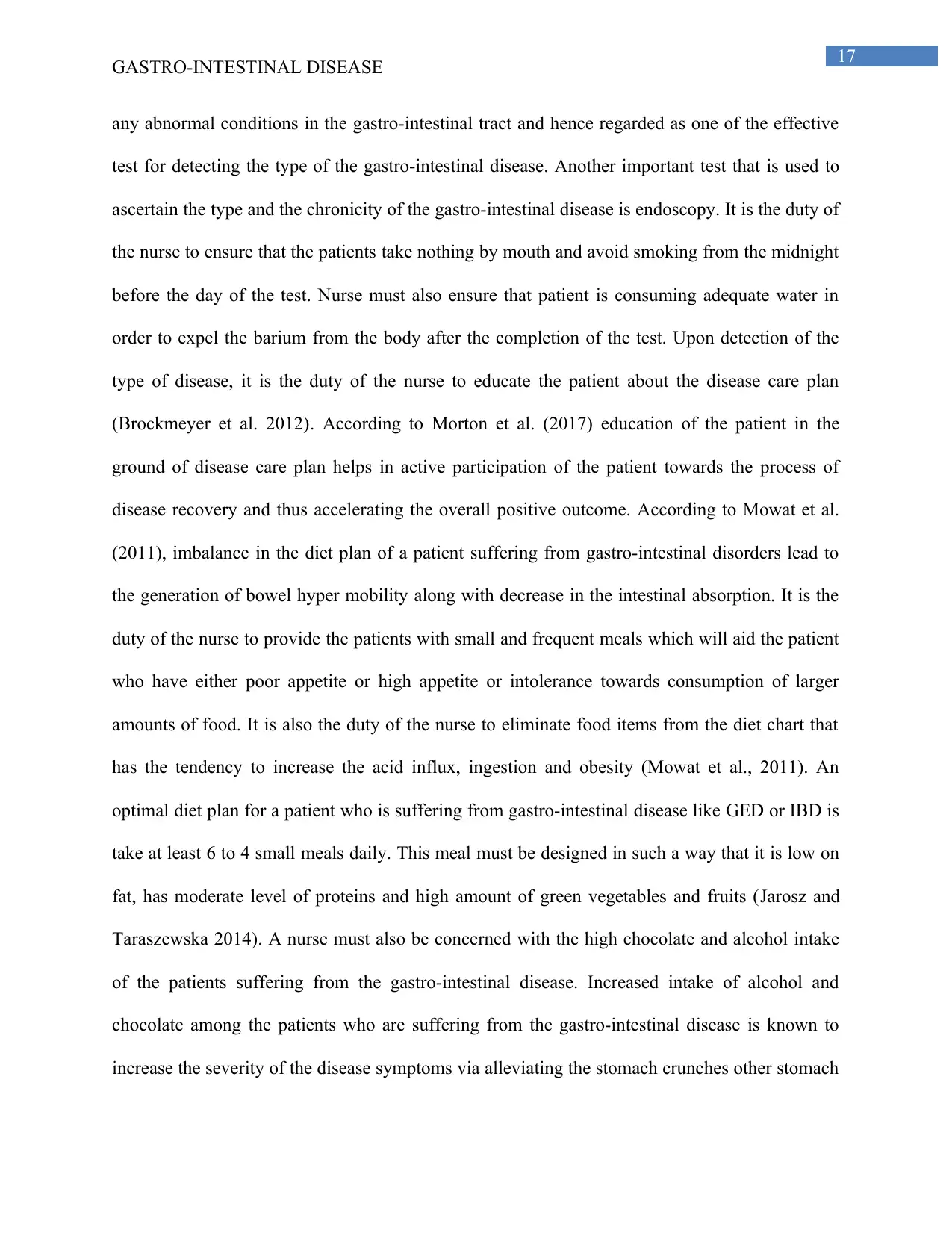
17
GASTRO-INTESTINAL DISEASE
any abnormal conditions in the gastro-intestinal tract and hence regarded as one of the effective
test for detecting the type of the gastro-intestinal disease. Another important test that is used to
ascertain the type and the chronicity of the gastro-intestinal disease is endoscopy. It is the duty of
the nurse to ensure that the patients take nothing by mouth and avoid smoking from the midnight
before the day of the test. Nurse must also ensure that patient is consuming adequate water in
order to expel the barium from the body after the completion of the test. Upon detection of the
type of disease, it is the duty of the nurse to educate the patient about the disease care plan
(Brockmeyer et al. 2012). According to Morton et al. (2017) education of the patient in the
ground of disease care plan helps in active participation of the patient towards the process of
disease recovery and thus accelerating the overall positive outcome. According to Mowat et al.
(2011), imbalance in the diet plan of a patient suffering from gastro-intestinal disorders lead to
the generation of bowel hyper mobility along with decrease in the intestinal absorption. It is the
duty of the nurse to provide the patients with small and frequent meals which will aid the patient
who have either poor appetite or high appetite or intolerance towards consumption of larger
amounts of food. It is also the duty of the nurse to eliminate food items from the diet chart that
has the tendency to increase the acid influx, ingestion and obesity (Mowat et al., 2011). An
optimal diet plan for a patient who is suffering from gastro-intestinal disease like GED or IBD is
take at least 6 to 4 small meals daily. This meal must be designed in such a way that it is low on
fat, has moderate level of proteins and high amount of green vegetables and fruits (Jarosz and
Taraszewska 2014). A nurse must also be concerned with the high chocolate and alcohol intake
of the patients suffering from the gastro-intestinal disease. Increased intake of alcohol and
chocolate among the patients who are suffering from the gastro-intestinal disease is known to
increase the severity of the disease symptoms via alleviating the stomach crunches other stomach
GASTRO-INTESTINAL DISEASE
any abnormal conditions in the gastro-intestinal tract and hence regarded as one of the effective
test for detecting the type of the gastro-intestinal disease. Another important test that is used to
ascertain the type and the chronicity of the gastro-intestinal disease is endoscopy. It is the duty of
the nurse to ensure that the patients take nothing by mouth and avoid smoking from the midnight
before the day of the test. Nurse must also ensure that patient is consuming adequate water in
order to expel the barium from the body after the completion of the test. Upon detection of the
type of disease, it is the duty of the nurse to educate the patient about the disease care plan
(Brockmeyer et al. 2012). According to Morton et al. (2017) education of the patient in the
ground of disease care plan helps in active participation of the patient towards the process of
disease recovery and thus accelerating the overall positive outcome. According to Mowat et al.
(2011), imbalance in the diet plan of a patient suffering from gastro-intestinal disorders lead to
the generation of bowel hyper mobility along with decrease in the intestinal absorption. It is the
duty of the nurse to provide the patients with small and frequent meals which will aid the patient
who have either poor appetite or high appetite or intolerance towards consumption of larger
amounts of food. It is also the duty of the nurse to eliminate food items from the diet chart that
has the tendency to increase the acid influx, ingestion and obesity (Mowat et al., 2011). An
optimal diet plan for a patient who is suffering from gastro-intestinal disease like GED or IBD is
take at least 6 to 4 small meals daily. This meal must be designed in such a way that it is low on
fat, has moderate level of proteins and high amount of green vegetables and fruits (Jarosz and
Taraszewska 2014). A nurse must also be concerned with the high chocolate and alcohol intake
of the patients suffering from the gastro-intestinal disease. Increased intake of alcohol and
chocolate among the patients who are suffering from the gastro-intestinal disease is known to
increase the severity of the disease symptoms via alleviating the stomach crunches other stomach
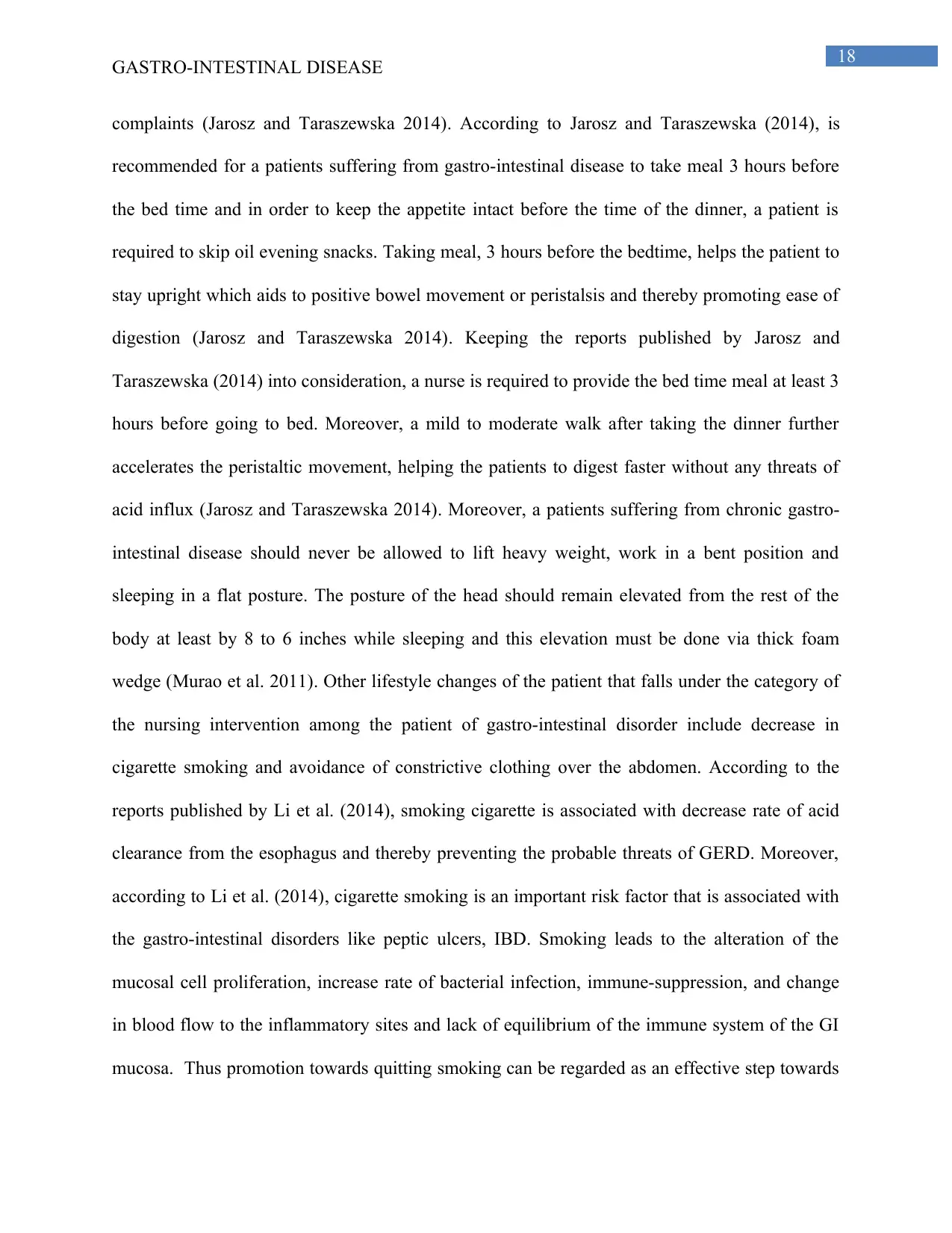
18
GASTRO-INTESTINAL DISEASE
complaints (Jarosz and Taraszewska 2014). According to Jarosz and Taraszewska (2014), is
recommended for a patients suffering from gastro-intestinal disease to take meal 3 hours before
the bed time and in order to keep the appetite intact before the time of the dinner, a patient is
required to skip oil evening snacks. Taking meal, 3 hours before the bedtime, helps the patient to
stay upright which aids to positive bowel movement or peristalsis and thereby promoting ease of
digestion (Jarosz and Taraszewska 2014). Keeping the reports published by Jarosz and
Taraszewska (2014) into consideration, a nurse is required to provide the bed time meal at least 3
hours before going to bed. Moreover, a mild to moderate walk after taking the dinner further
accelerates the peristaltic movement, helping the patients to digest faster without any threats of
acid influx (Jarosz and Taraszewska 2014). Moreover, a patients suffering from chronic gastro-
intestinal disease should never be allowed to lift heavy weight, work in a bent position and
sleeping in a flat posture. The posture of the head should remain elevated from the rest of the
body at least by 8 to 6 inches while sleeping and this elevation must be done via thick foam
wedge (Murao et al. 2011). Other lifestyle changes of the patient that falls under the category of
the nursing intervention among the patient of gastro-intestinal disorder include decrease in
cigarette smoking and avoidance of constrictive clothing over the abdomen. According to the
reports published by Li et al. (2014), smoking cigarette is associated with decrease rate of acid
clearance from the esophagus and thereby preventing the probable threats of GERD. Moreover,
according to Li et al. (2014), cigarette smoking is an important risk factor that is associated with
the gastro-intestinal disorders like peptic ulcers, IBD. Smoking leads to the alteration of the
mucosal cell proliferation, increase rate of bacterial infection, immune-suppression, and change
in blood flow to the inflammatory sites and lack of equilibrium of the immune system of the GI
mucosa. Thus promotion towards quitting smoking can be regarded as an effective step towards
GASTRO-INTESTINAL DISEASE
complaints (Jarosz and Taraszewska 2014). According to Jarosz and Taraszewska (2014), is
recommended for a patients suffering from gastro-intestinal disease to take meal 3 hours before
the bed time and in order to keep the appetite intact before the time of the dinner, a patient is
required to skip oil evening snacks. Taking meal, 3 hours before the bedtime, helps the patient to
stay upright which aids to positive bowel movement or peristalsis and thereby promoting ease of
digestion (Jarosz and Taraszewska 2014). Keeping the reports published by Jarosz and
Taraszewska (2014) into consideration, a nurse is required to provide the bed time meal at least 3
hours before going to bed. Moreover, a mild to moderate walk after taking the dinner further
accelerates the peristaltic movement, helping the patients to digest faster without any threats of
acid influx (Jarosz and Taraszewska 2014). Moreover, a patients suffering from chronic gastro-
intestinal disease should never be allowed to lift heavy weight, work in a bent position and
sleeping in a flat posture. The posture of the head should remain elevated from the rest of the
body at least by 8 to 6 inches while sleeping and this elevation must be done via thick foam
wedge (Murao et al. 2011). Other lifestyle changes of the patient that falls under the category of
the nursing intervention among the patient of gastro-intestinal disorder include decrease in
cigarette smoking and avoidance of constrictive clothing over the abdomen. According to the
reports published by Li et al. (2014), smoking cigarette is associated with decrease rate of acid
clearance from the esophagus and thereby preventing the probable threats of GERD. Moreover,
according to Li et al. (2014), cigarette smoking is an important risk factor that is associated with
the gastro-intestinal disorders like peptic ulcers, IBD. Smoking leads to the alteration of the
mucosal cell proliferation, increase rate of bacterial infection, immune-suppression, and change
in blood flow to the inflammatory sites and lack of equilibrium of the immune system of the GI
mucosa. Thus promotion towards quitting smoking can be regarded as an effective step towards
Paraphrase This Document
Need a fresh take? Get an instant paraphrase of this document with our AI Paraphraser
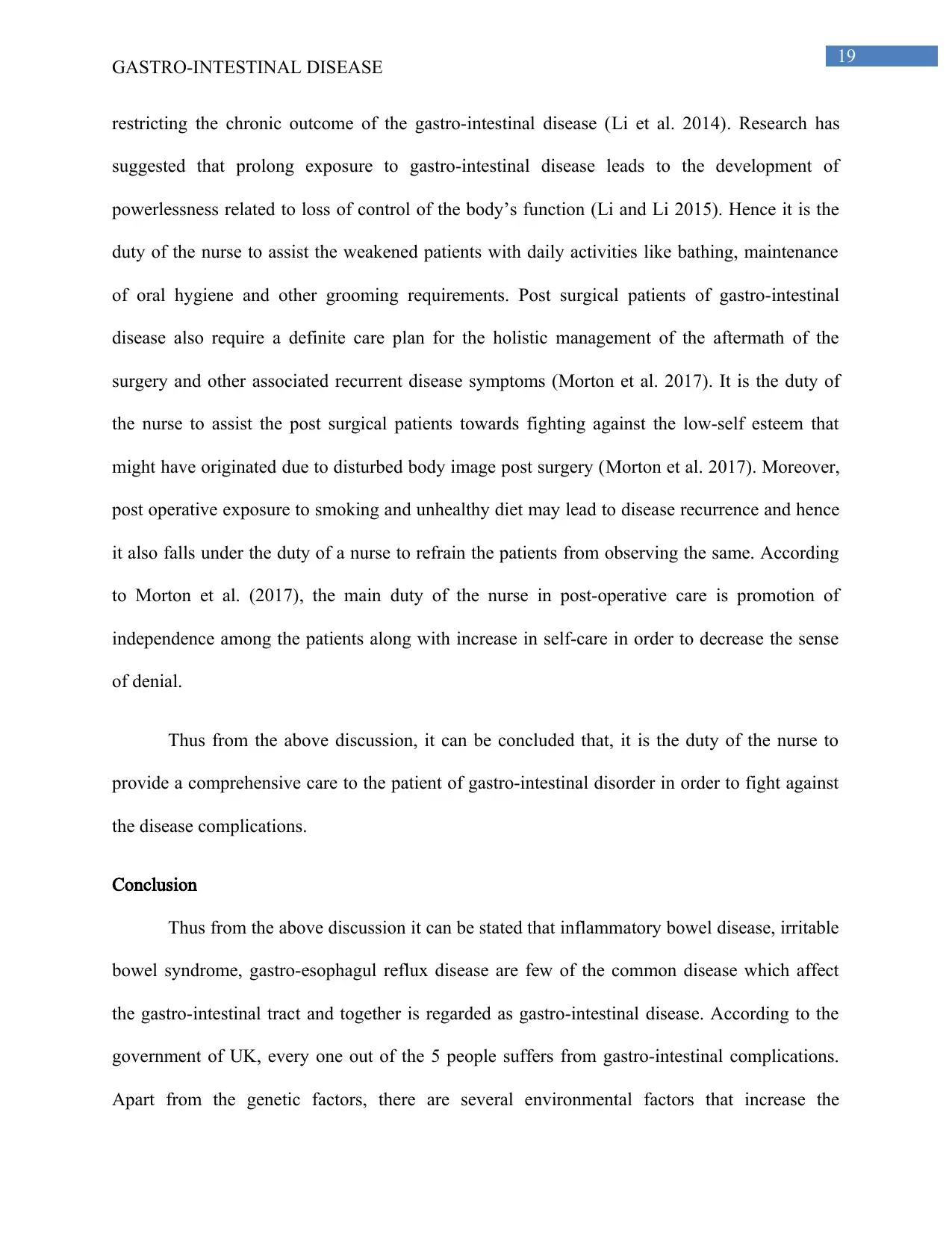
19
GASTRO-INTESTINAL DISEASE
restricting the chronic outcome of the gastro-intestinal disease (Li et al. 2014). Research has
suggested that prolong exposure to gastro-intestinal disease leads to the development of
powerlessness related to loss of control of the body’s function (Li and Li 2015). Hence it is the
duty of the nurse to assist the weakened patients with daily activities like bathing, maintenance
of oral hygiene and other grooming requirements. Post surgical patients of gastro-intestinal
disease also require a definite care plan for the holistic management of the aftermath of the
surgery and other associated recurrent disease symptoms (Morton et al. 2017). It is the duty of
the nurse to assist the post surgical patients towards fighting against the low-self esteem that
might have originated due to disturbed body image post surgery (Morton et al. 2017). Moreover,
post operative exposure to smoking and unhealthy diet may lead to disease recurrence and hence
it also falls under the duty of a nurse to refrain the patients from observing the same. According
to Morton et al. (2017), the main duty of the nurse in post-operative care is promotion of
independence among the patients along with increase in self-care in order to decrease the sense
of denial.
Thus from the above discussion, it can be concluded that, it is the duty of the nurse to
provide a comprehensive care to the patient of gastro-intestinal disorder in order to fight against
the disease complications.
Conclusion
Thus from the above discussion it can be stated that inflammatory bowel disease, irritable
bowel syndrome, gastro-esophagul reflux disease are few of the common disease which affect
the gastro-intestinal tract and together is regarded as gastro-intestinal disease. According to the
government of UK, every one out of the 5 people suffers from gastro-intestinal complications.
Apart from the genetic factors, there are several environmental factors that increase the
GASTRO-INTESTINAL DISEASE
restricting the chronic outcome of the gastro-intestinal disease (Li et al. 2014). Research has
suggested that prolong exposure to gastro-intestinal disease leads to the development of
powerlessness related to loss of control of the body’s function (Li and Li 2015). Hence it is the
duty of the nurse to assist the weakened patients with daily activities like bathing, maintenance
of oral hygiene and other grooming requirements. Post surgical patients of gastro-intestinal
disease also require a definite care plan for the holistic management of the aftermath of the
surgery and other associated recurrent disease symptoms (Morton et al. 2017). It is the duty of
the nurse to assist the post surgical patients towards fighting against the low-self esteem that
might have originated due to disturbed body image post surgery (Morton et al. 2017). Moreover,
post operative exposure to smoking and unhealthy diet may lead to disease recurrence and hence
it also falls under the duty of a nurse to refrain the patients from observing the same. According
to Morton et al. (2017), the main duty of the nurse in post-operative care is promotion of
independence among the patients along with increase in self-care in order to decrease the sense
of denial.
Thus from the above discussion, it can be concluded that, it is the duty of the nurse to
provide a comprehensive care to the patient of gastro-intestinal disorder in order to fight against
the disease complications.
Conclusion
Thus from the above discussion it can be stated that inflammatory bowel disease, irritable
bowel syndrome, gastro-esophagul reflux disease are few of the common disease which affect
the gastro-intestinal tract and together is regarded as gastro-intestinal disease. According to the
government of UK, every one out of the 5 people suffers from gastro-intestinal complications.
Apart from the genetic factors, there are several environmental factors that increase the
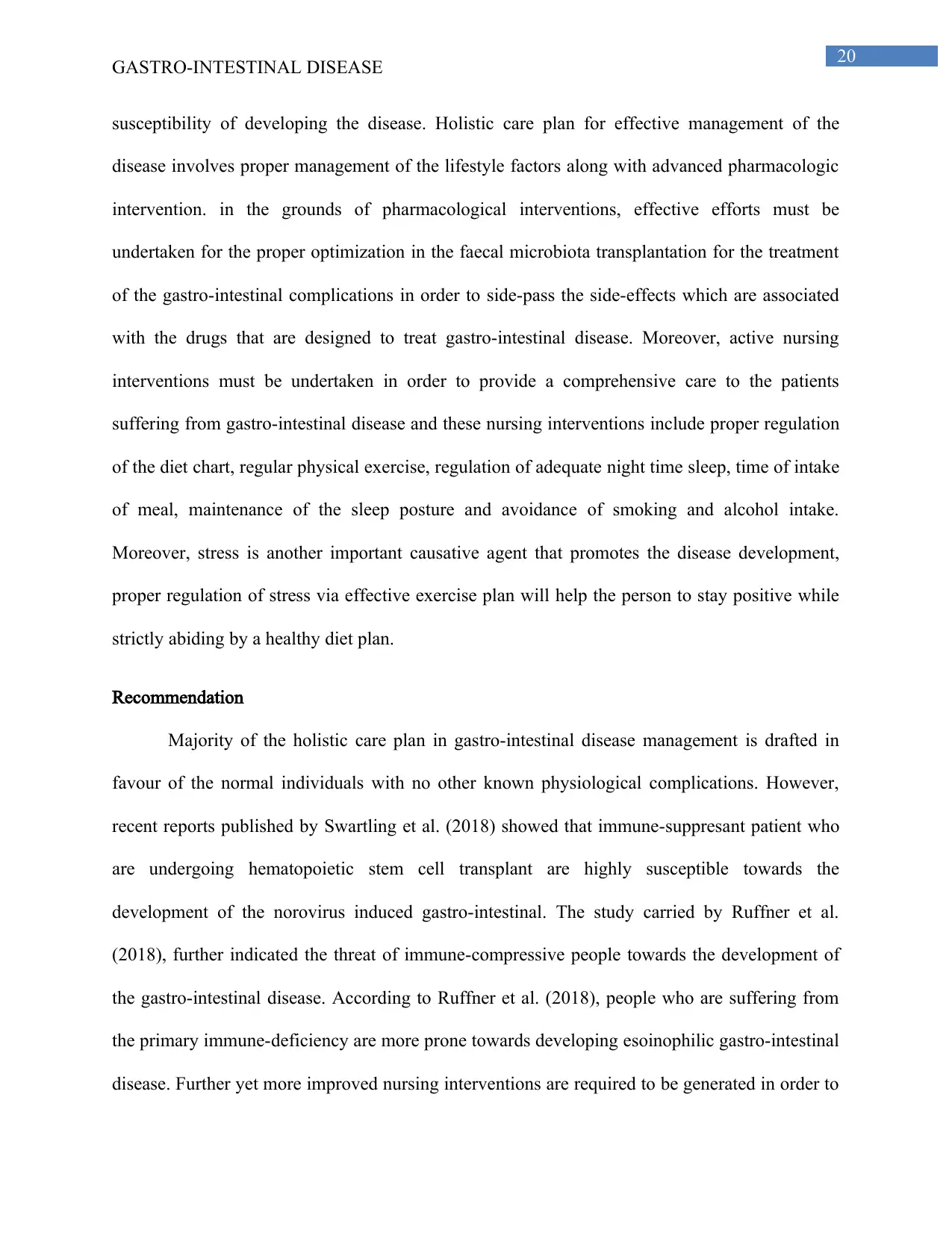
20
GASTRO-INTESTINAL DISEASE
susceptibility of developing the disease. Holistic care plan for effective management of the
disease involves proper management of the lifestyle factors along with advanced pharmacologic
intervention. in the grounds of pharmacological interventions, effective efforts must be
undertaken for the proper optimization in the faecal microbiota transplantation for the treatment
of the gastro-intestinal complications in order to side-pass the side-effects which are associated
with the drugs that are designed to treat gastro-intestinal disease. Moreover, active nursing
interventions must be undertaken in order to provide a comprehensive care to the patients
suffering from gastro-intestinal disease and these nursing interventions include proper regulation
of the diet chart, regular physical exercise, regulation of adequate night time sleep, time of intake
of meal, maintenance of the sleep posture and avoidance of smoking and alcohol intake.
Moreover, stress is another important causative agent that promotes the disease development,
proper regulation of stress via effective exercise plan will help the person to stay positive while
strictly abiding by a healthy diet plan.
Recommendation
Majority of the holistic care plan in gastro-intestinal disease management is drafted in
favour of the normal individuals with no other known physiological complications. However,
recent reports published by Swartling et al. (2018) showed that immune-suppresant patient who
are undergoing hematopoietic stem cell transplant are highly susceptible towards the
development of the norovirus induced gastro-intestinal. The study carried by Ruffner et al.
(2018), further indicated the threat of immune-compressive people towards the development of
the gastro-intestinal disease. According to Ruffner et al. (2018), people who are suffering from
the primary immune-deficiency are more prone towards developing esoinophilic gastro-intestinal
disease. Further yet more improved nursing interventions are required to be generated in order to
GASTRO-INTESTINAL DISEASE
susceptibility of developing the disease. Holistic care plan for effective management of the
disease involves proper management of the lifestyle factors along with advanced pharmacologic
intervention. in the grounds of pharmacological interventions, effective efforts must be
undertaken for the proper optimization in the faecal microbiota transplantation for the treatment
of the gastro-intestinal complications in order to side-pass the side-effects which are associated
with the drugs that are designed to treat gastro-intestinal disease. Moreover, active nursing
interventions must be undertaken in order to provide a comprehensive care to the patients
suffering from gastro-intestinal disease and these nursing interventions include proper regulation
of the diet chart, regular physical exercise, regulation of adequate night time sleep, time of intake
of meal, maintenance of the sleep posture and avoidance of smoking and alcohol intake.
Moreover, stress is another important causative agent that promotes the disease development,
proper regulation of stress via effective exercise plan will help the person to stay positive while
strictly abiding by a healthy diet plan.
Recommendation
Majority of the holistic care plan in gastro-intestinal disease management is drafted in
favour of the normal individuals with no other known physiological complications. However,
recent reports published by Swartling et al. (2018) showed that immune-suppresant patient who
are undergoing hematopoietic stem cell transplant are highly susceptible towards the
development of the norovirus induced gastro-intestinal. The study carried by Ruffner et al.
(2018), further indicated the threat of immune-compressive people towards the development of
the gastro-intestinal disease. According to Ruffner et al. (2018), people who are suffering from
the primary immune-deficiency are more prone towards developing esoinophilic gastro-intestinal
disease. Further yet more improved nursing interventions are required to be generated in order to
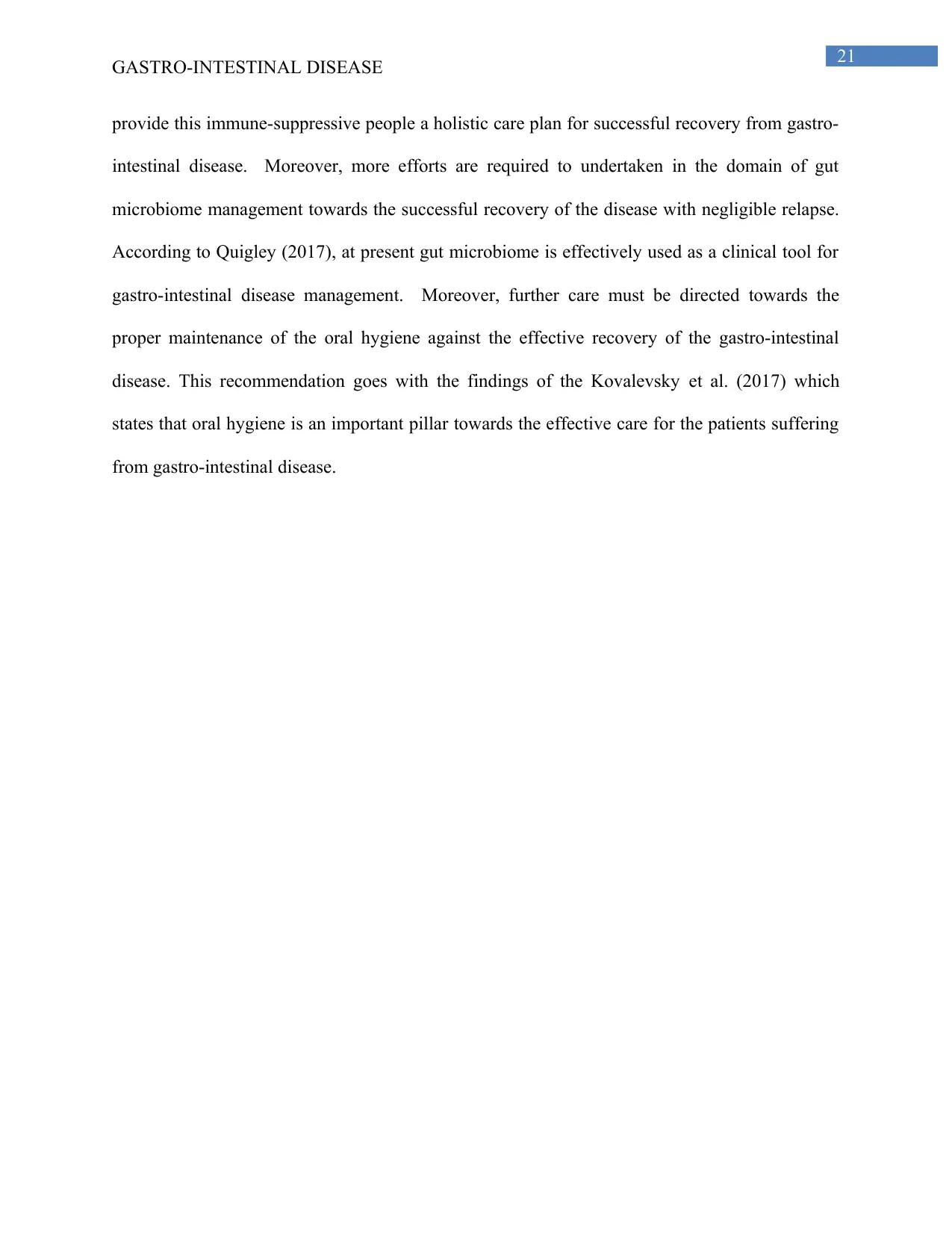
21
GASTRO-INTESTINAL DISEASE
provide this immune-suppressive people a holistic care plan for successful recovery from gastro-
intestinal disease. Moreover, more efforts are required to undertaken in the domain of gut
microbiome management towards the successful recovery of the disease with negligible relapse.
According to Quigley (2017), at present gut microbiome is effectively used as a clinical tool for
gastro-intestinal disease management. Moreover, further care must be directed towards the
proper maintenance of the oral hygiene against the effective recovery of the gastro-intestinal
disease. This recommendation goes with the findings of the Kovalevsky et al. (2017) which
states that oral hygiene is an important pillar towards the effective care for the patients suffering
from gastro-intestinal disease.
GASTRO-INTESTINAL DISEASE
provide this immune-suppressive people a holistic care plan for successful recovery from gastro-
intestinal disease. Moreover, more efforts are required to undertaken in the domain of gut
microbiome management towards the successful recovery of the disease with negligible relapse.
According to Quigley (2017), at present gut microbiome is effectively used as a clinical tool for
gastro-intestinal disease management. Moreover, further care must be directed towards the
proper maintenance of the oral hygiene against the effective recovery of the gastro-intestinal
disease. This recommendation goes with the findings of the Kovalevsky et al. (2017) which
states that oral hygiene is an important pillar towards the effective care for the patients suffering
from gastro-intestinal disease.
Secure Best Marks with AI Grader
Need help grading? Try our AI Grader for instant feedback on your assignments.
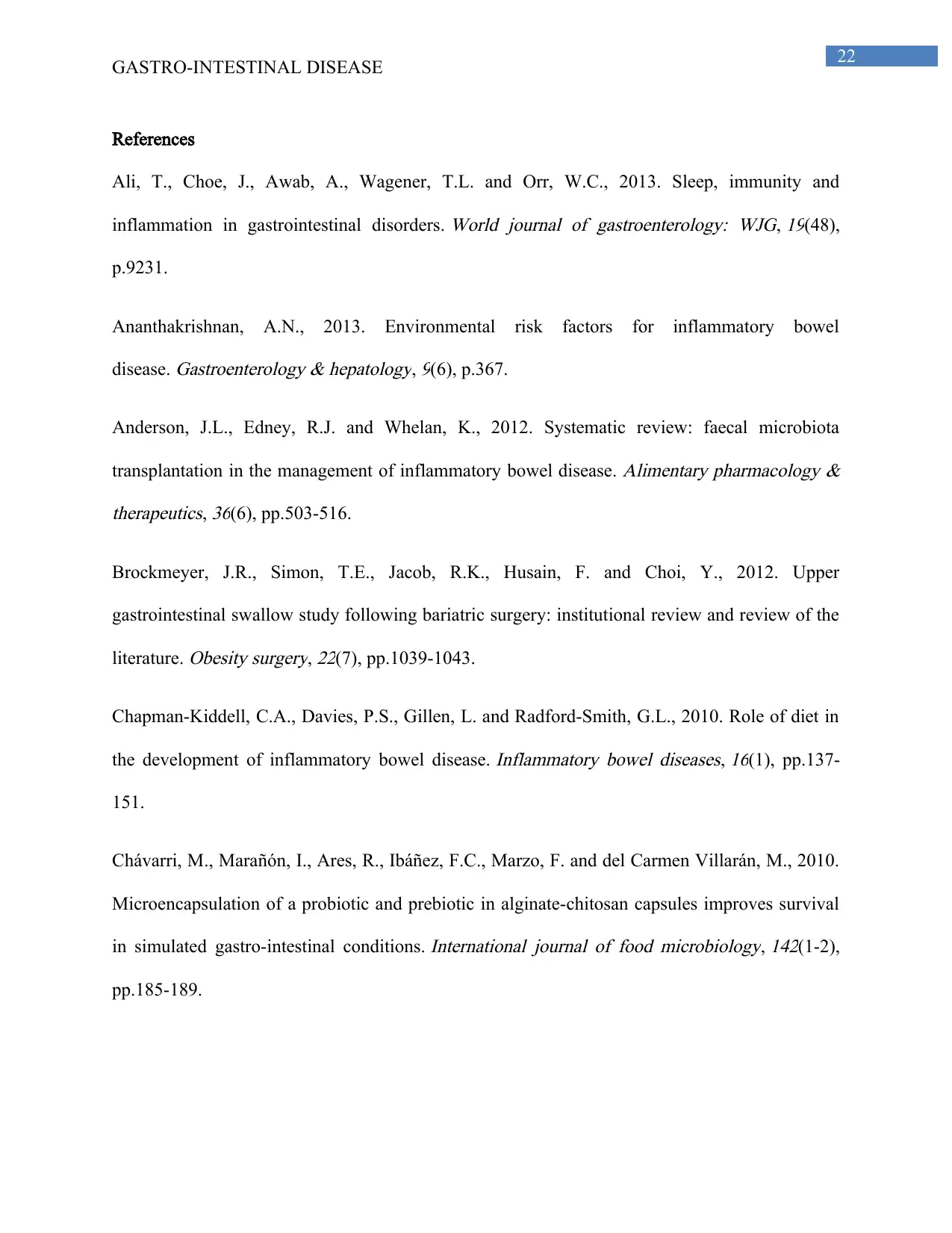
22
GASTRO-INTESTINAL DISEASE
References
Ali, T., Choe, J., Awab, A., Wagener, T.L. and Orr, W.C., 2013. Sleep, immunity and
inflammation in gastrointestinal disorders.
World journal of gastroenterology: WJG,
19(48),
p.9231.
Ananthakrishnan, A.N., 2013. Environmental risk factors for inflammatory bowel
disease.
Gastroenterology & hepatology,
9(6), p.367.
Anderson, J.L., Edney, R.J. and Whelan, K., 2012. Systematic review: faecal microbiota
transplantation in the management of inflammatory bowel disease.
Alimentary pharmacology &
therapeutics,
36(6), pp.503-516.
Brockmeyer, J.R., Simon, T.E., Jacob, R.K., Husain, F. and Choi, Y., 2012. Upper
gastrointestinal swallow study following bariatric surgery: institutional review and review of the
literature.
Obesity surgery,
22(7), pp.1039-1043.
Chapman‐Kiddell, C.A., Davies, P.S., Gillen, L. and Radford‐Smith, G.L., 2010. Role of diet in
the development of inflammatory bowel disease.
Inflammatory bowel diseases,
16(1), pp.137-
151.
Chávarri, M., Marañón, I., Ares, R., Ibáñez, F.C., Marzo, F. and del Carmen Villarán, M., 2010.
Microencapsulation of a probiotic and prebiotic in alginate-chitosan capsules improves survival
in simulated gastro-intestinal conditions.
International journal of food microbiology,
142(1-2),
pp.185-189.
GASTRO-INTESTINAL DISEASE
References
Ali, T., Choe, J., Awab, A., Wagener, T.L. and Orr, W.C., 2013. Sleep, immunity and
inflammation in gastrointestinal disorders.
World journal of gastroenterology: WJG,
19(48),
p.9231.
Ananthakrishnan, A.N., 2013. Environmental risk factors for inflammatory bowel
disease.
Gastroenterology & hepatology,
9(6), p.367.
Anderson, J.L., Edney, R.J. and Whelan, K., 2012. Systematic review: faecal microbiota
transplantation in the management of inflammatory bowel disease.
Alimentary pharmacology &
therapeutics,
36(6), pp.503-516.
Brockmeyer, J.R., Simon, T.E., Jacob, R.K., Husain, F. and Choi, Y., 2012. Upper
gastrointestinal swallow study following bariatric surgery: institutional review and review of the
literature.
Obesity surgery,
22(7), pp.1039-1043.
Chapman‐Kiddell, C.A., Davies, P.S., Gillen, L. and Radford‐Smith, G.L., 2010. Role of diet in
the development of inflammatory bowel disease.
Inflammatory bowel diseases,
16(1), pp.137-
151.
Chávarri, M., Marañón, I., Ares, R., Ibáñez, F.C., Marzo, F. and del Carmen Villarán, M., 2010.
Microencapsulation of a probiotic and prebiotic in alginate-chitosan capsules improves survival
in simulated gastro-intestinal conditions.
International journal of food microbiology,
142(1-2),
pp.185-189.
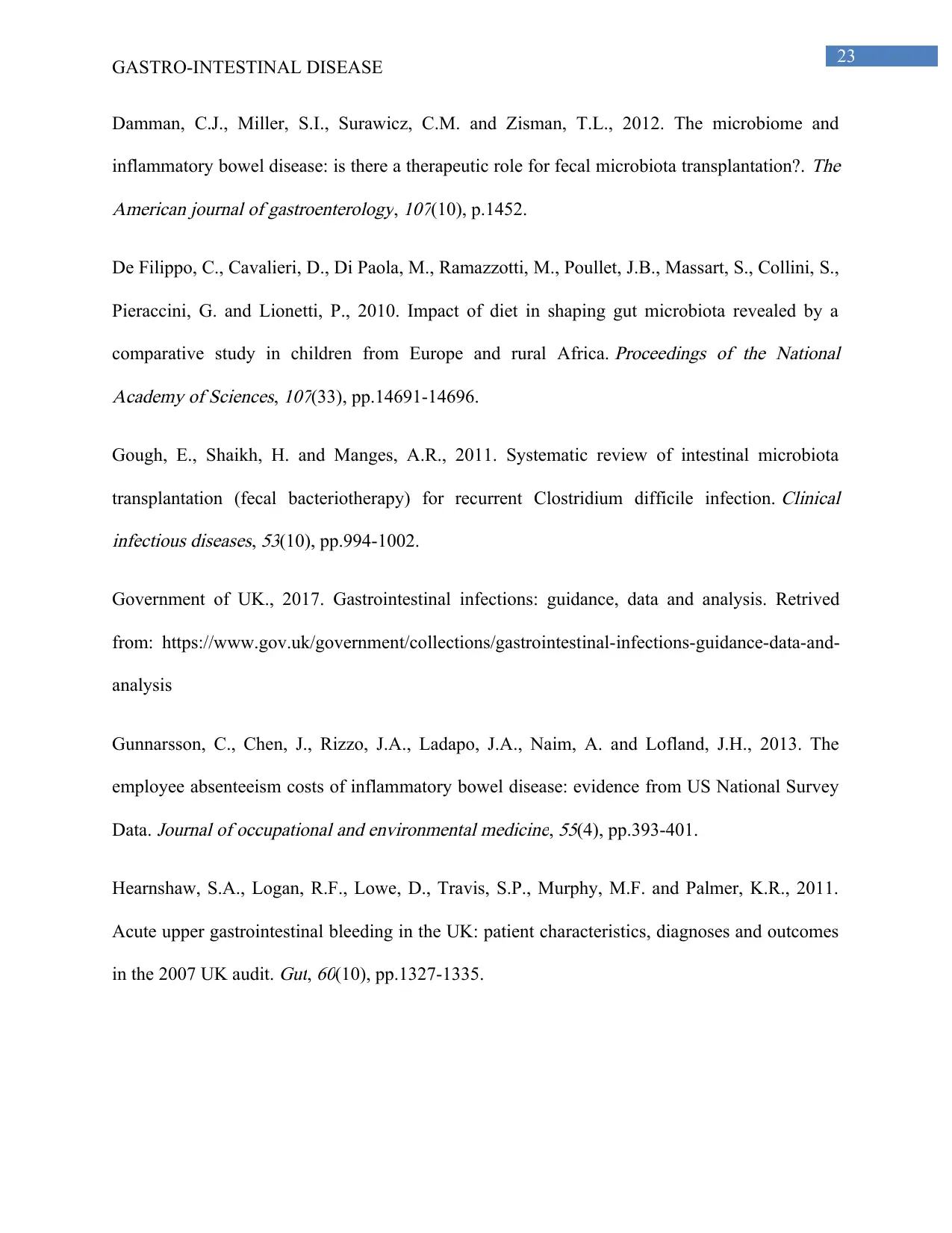
23
GASTRO-INTESTINAL DISEASE
Damman, C.J., Miller, S.I., Surawicz, C.M. and Zisman, T.L., 2012. The microbiome and
inflammatory bowel disease: is there a therapeutic role for fecal microbiota transplantation?.
The
American journal of gastroenterology,
107(10), p.1452.
De Filippo, C., Cavalieri, D., Di Paola, M., Ramazzotti, M., Poullet, J.B., Massart, S., Collini, S.,
Pieraccini, G. and Lionetti, P., 2010. Impact of diet in shaping gut microbiota revealed by a
comparative study in children from Europe and rural Africa.
Proceedings of the National
Academy of Sciences,
107(33), pp.14691-14696.
Gough, E., Shaikh, H. and Manges, A.R., 2011. Systematic review of intestinal microbiota
transplantation (fecal bacteriotherapy) for recurrent Clostridium difficile infection.
Clinical
infectious diseases,
53(10), pp.994-1002.
Government of UK., 2017. Gastrointestinal infections: guidance, data and analysis. Retrived
from: https://www.gov.uk/government/collections/gastrointestinal-infections-guidance-data-and-
analysis
Gunnarsson, C., Chen, J., Rizzo, J.A., Ladapo, J.A., Naim, A. and Lofland, J.H., 2013. The
employee absenteeism costs of inflammatory bowel disease: evidence from US National Survey
Data.
Journal of occupational and environmental medicine,
55(4), pp.393-401.
Hearnshaw, S.A., Logan, R.F., Lowe, D., Travis, S.P., Murphy, M.F. and Palmer, K.R., 2011.
Acute upper gastrointestinal bleeding in the UK: patient characteristics, diagnoses and outcomes
in the 2007 UK audit.
Gut,
60(10), pp.1327-1335.
GASTRO-INTESTINAL DISEASE
Damman, C.J., Miller, S.I., Surawicz, C.M. and Zisman, T.L., 2012. The microbiome and
inflammatory bowel disease: is there a therapeutic role for fecal microbiota transplantation?.
The
American journal of gastroenterology,
107(10), p.1452.
De Filippo, C., Cavalieri, D., Di Paola, M., Ramazzotti, M., Poullet, J.B., Massart, S., Collini, S.,
Pieraccini, G. and Lionetti, P., 2010. Impact of diet in shaping gut microbiota revealed by a
comparative study in children from Europe and rural Africa.
Proceedings of the National
Academy of Sciences,
107(33), pp.14691-14696.
Gough, E., Shaikh, H. and Manges, A.R., 2011. Systematic review of intestinal microbiota
transplantation (fecal bacteriotherapy) for recurrent Clostridium difficile infection.
Clinical
infectious diseases,
53(10), pp.994-1002.
Government of UK., 2017. Gastrointestinal infections: guidance, data and analysis. Retrived
from: https://www.gov.uk/government/collections/gastrointestinal-infections-guidance-data-and-
analysis
Gunnarsson, C., Chen, J., Rizzo, J.A., Ladapo, J.A., Naim, A. and Lofland, J.H., 2013. The
employee absenteeism costs of inflammatory bowel disease: evidence from US National Survey
Data.
Journal of occupational and environmental medicine,
55(4), pp.393-401.
Hearnshaw, S.A., Logan, R.F., Lowe, D., Travis, S.P., Murphy, M.F. and Palmer, K.R., 2011.
Acute upper gastrointestinal bleeding in the UK: patient characteristics, diagnoses and outcomes
in the 2007 UK audit.
Gut,
60(10), pp.1327-1335.
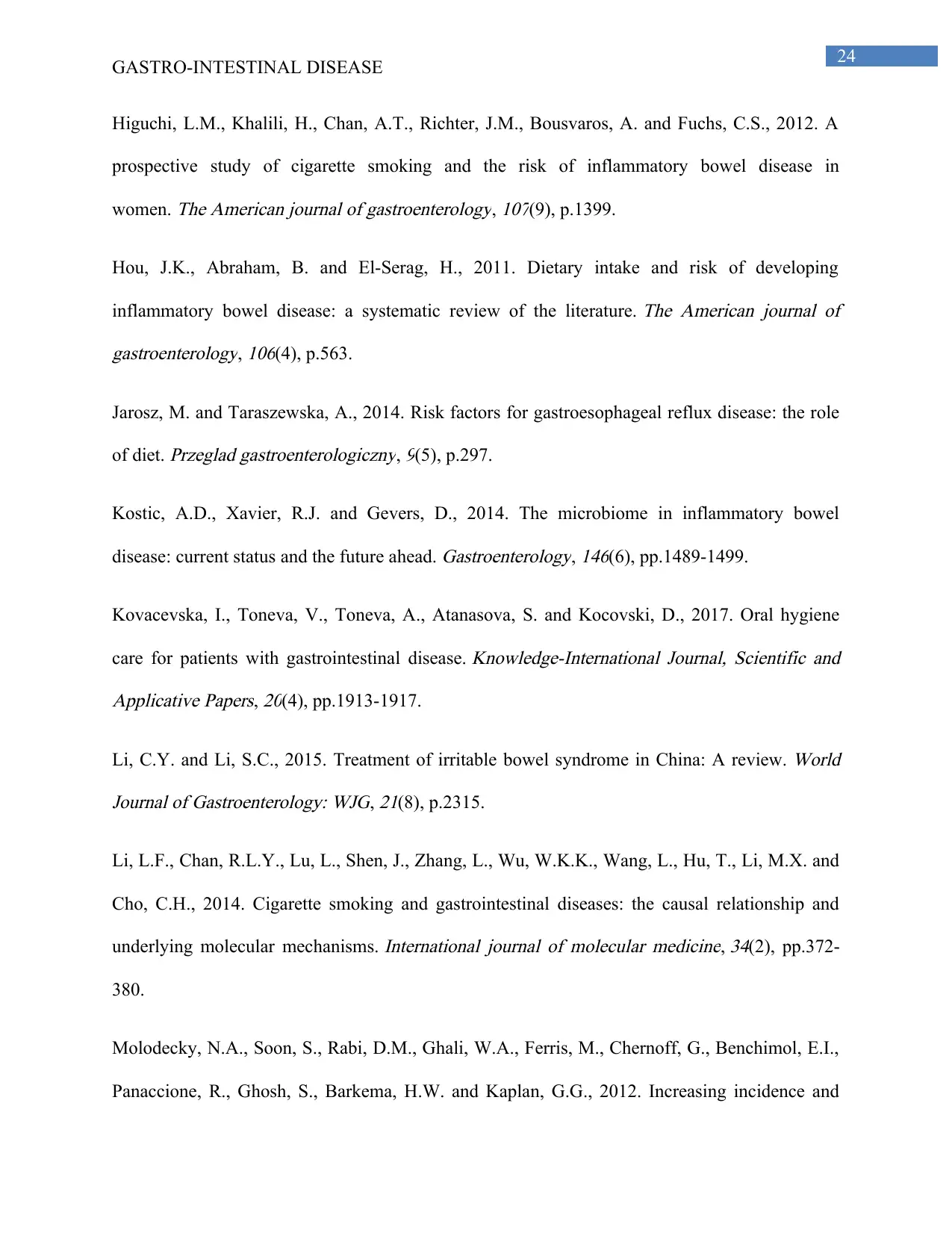
24
GASTRO-INTESTINAL DISEASE
Higuchi, L.M., Khalili, H., Chan, A.T., Richter, J.M., Bousvaros, A. and Fuchs, C.S., 2012. A
prospective study of cigarette smoking and the risk of inflammatory bowel disease in
women.
The American journal of gastroenterology,
107(9), p.1399.
Hou, J.K., Abraham, B. and El-Serag, H., 2011. Dietary intake and risk of developing
inflammatory bowel disease: a systematic review of the literature.
The American journal of
gastroenterology,
106(4), p.563.
Jarosz, M. and Taraszewska, A., 2014. Risk factors for gastroesophageal reflux disease: the role
of diet.
Przeglad gastroenterologiczny,
9(5), p.297.
Kostic, A.D., Xavier, R.J. and Gevers, D., 2014. The microbiome in inflammatory bowel
disease: current status and the future ahead.
Gastroenterology,
146(6), pp.1489-1499.
Kovacevska, I., Toneva, V., Toneva, A., Atanasova, S. and Kocovski, D., 2017. Oral hygiene
care for patients with gastrointestinal disease.
Knowledge-International Journal, Scientific and
Applicative Papers,
20(4), pp.1913-1917.
Li, C.Y. and Li, S.C., 2015. Treatment of irritable bowel syndrome in China: A review.
World
Journal of Gastroenterology: WJG,
21(8), p.2315.
Li, L.F., Chan, R.L.Y., Lu, L., Shen, J., Zhang, L., Wu, W.K.K., Wang, L., Hu, T., Li, M.X. and
Cho, C.H., 2014. Cigarette smoking and gastrointestinal diseases: the causal relationship and
underlying molecular mechanisms.
International journal of molecular medicine,
34(2), pp.372-
380.
Molodecky, N.A., Soon, S., Rabi, D.M., Ghali, W.A., Ferris, M., Chernoff, G., Benchimol, E.I.,
Panaccione, R., Ghosh, S., Barkema, H.W. and Kaplan, G.G., 2012. Increasing incidence and
GASTRO-INTESTINAL DISEASE
Higuchi, L.M., Khalili, H., Chan, A.T., Richter, J.M., Bousvaros, A. and Fuchs, C.S., 2012. A
prospective study of cigarette smoking and the risk of inflammatory bowel disease in
women.
The American journal of gastroenterology,
107(9), p.1399.
Hou, J.K., Abraham, B. and El-Serag, H., 2011. Dietary intake and risk of developing
inflammatory bowel disease: a systematic review of the literature.
The American journal of
gastroenterology,
106(4), p.563.
Jarosz, M. and Taraszewska, A., 2014. Risk factors for gastroesophageal reflux disease: the role
of diet.
Przeglad gastroenterologiczny,
9(5), p.297.
Kostic, A.D., Xavier, R.J. and Gevers, D., 2014. The microbiome in inflammatory bowel
disease: current status and the future ahead.
Gastroenterology,
146(6), pp.1489-1499.
Kovacevska, I., Toneva, V., Toneva, A., Atanasova, S. and Kocovski, D., 2017. Oral hygiene
care for patients with gastrointestinal disease.
Knowledge-International Journal, Scientific and
Applicative Papers,
20(4), pp.1913-1917.
Li, C.Y. and Li, S.C., 2015. Treatment of irritable bowel syndrome in China: A review.
World
Journal of Gastroenterology: WJG,
21(8), p.2315.
Li, L.F., Chan, R.L.Y., Lu, L., Shen, J., Zhang, L., Wu, W.K.K., Wang, L., Hu, T., Li, M.X. and
Cho, C.H., 2014. Cigarette smoking and gastrointestinal diseases: the causal relationship and
underlying molecular mechanisms.
International journal of molecular medicine,
34(2), pp.372-
380.
Molodecky, N.A., Soon, S., Rabi, D.M., Ghali, W.A., Ferris, M., Chernoff, G., Benchimol, E.I.,
Panaccione, R., Ghosh, S., Barkema, H.W. and Kaplan, G.G., 2012. Increasing incidence and
Paraphrase This Document
Need a fresh take? Get an instant paraphrase of this document with our AI Paraphraser
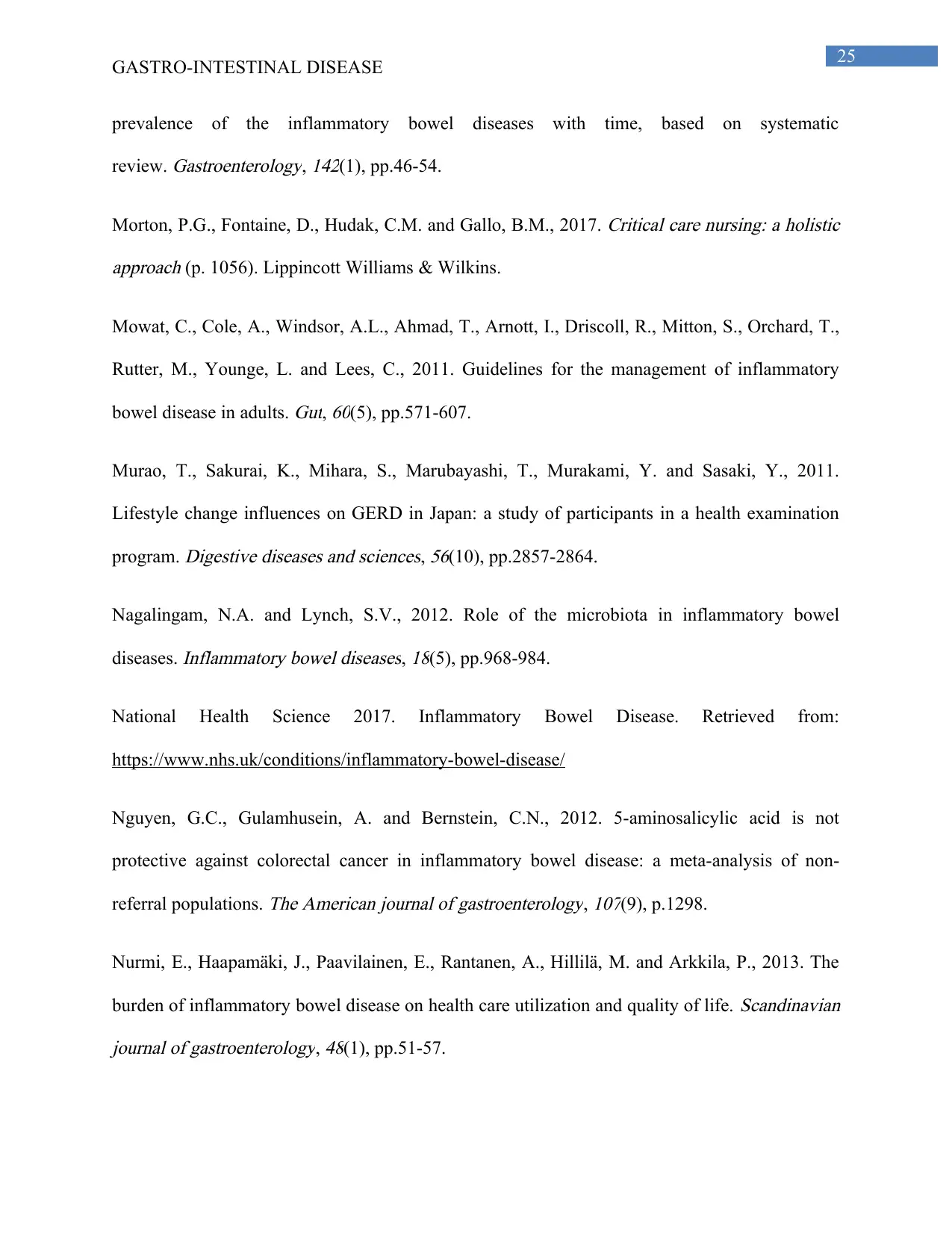
25
GASTRO-INTESTINAL DISEASE
prevalence of the inflammatory bowel diseases with time, based on systematic
review.
Gastroenterology,
142(1), pp.46-54.
Morton, P.G., Fontaine, D., Hudak, C.M. and Gallo, B.M., 2017.
Critical care nursing: a holistic
approach (p. 1056). Lippincott Williams & Wilkins.
Mowat, C., Cole, A., Windsor, A.L., Ahmad, T., Arnott, I., Driscoll, R., Mitton, S., Orchard, T.,
Rutter, M., Younge, L. and Lees, C., 2011. Guidelines for the management of inflammatory
bowel disease in adults.
Gut,
60(5), pp.571-607.
Murao, T., Sakurai, K., Mihara, S., Marubayashi, T., Murakami, Y. and Sasaki, Y., 2011.
Lifestyle change influences on GERD in Japan: a study of participants in a health examination
program.
Digestive diseases and sciences,
56(10), pp.2857-2864.
Nagalingam, N.A. and Lynch, S.V., 2012. Role of the microbiota in inflammatory bowel
diseases.
Inflammatory bowel diseases,
18(5), pp.968-984.
National Health Science 2017. Inflammatory Bowel Disease. Retrieved from:
https://www.nhs.uk/conditions/inflammatory-bowel-disease/
Nguyen, G.C., Gulamhusein, A. and Bernstein, C.N., 2012. 5-aminosalicylic acid is not
protective against colorectal cancer in inflammatory bowel disease: a meta-analysis of non-
referral populations.
The American journal of gastroenterology,
107(9), p.1298.
Nurmi, E., Haapamäki, J., Paavilainen, E., Rantanen, A., Hillilä, M. and Arkkila, P., 2013. The
burden of inflammatory bowel disease on health care utilization and quality of life.
Scandinavian
journal of gastroenterology,
48(1), pp.51-57.
GASTRO-INTESTINAL DISEASE
prevalence of the inflammatory bowel diseases with time, based on systematic
review.
Gastroenterology,
142(1), pp.46-54.
Morton, P.G., Fontaine, D., Hudak, C.M. and Gallo, B.M., 2017.
Critical care nursing: a holistic
approach (p. 1056). Lippincott Williams & Wilkins.
Mowat, C., Cole, A., Windsor, A.L., Ahmad, T., Arnott, I., Driscoll, R., Mitton, S., Orchard, T.,
Rutter, M., Younge, L. and Lees, C., 2011. Guidelines for the management of inflammatory
bowel disease in adults.
Gut,
60(5), pp.571-607.
Murao, T., Sakurai, K., Mihara, S., Marubayashi, T., Murakami, Y. and Sasaki, Y., 2011.
Lifestyle change influences on GERD in Japan: a study of participants in a health examination
program.
Digestive diseases and sciences,
56(10), pp.2857-2864.
Nagalingam, N.A. and Lynch, S.V., 2012. Role of the microbiota in inflammatory bowel
diseases.
Inflammatory bowel diseases,
18(5), pp.968-984.
National Health Science 2017. Inflammatory Bowel Disease. Retrieved from:
https://www.nhs.uk/conditions/inflammatory-bowel-disease/
Nguyen, G.C., Gulamhusein, A. and Bernstein, C.N., 2012. 5-aminosalicylic acid is not
protective against colorectal cancer in inflammatory bowel disease: a meta-analysis of non-
referral populations.
The American journal of gastroenterology,
107(9), p.1298.
Nurmi, E., Haapamäki, J., Paavilainen, E., Rantanen, A., Hillilä, M. and Arkkila, P., 2013. The
burden of inflammatory bowel disease on health care utilization and quality of life.
Scandinavian
journal of gastroenterology,
48(1), pp.51-57.
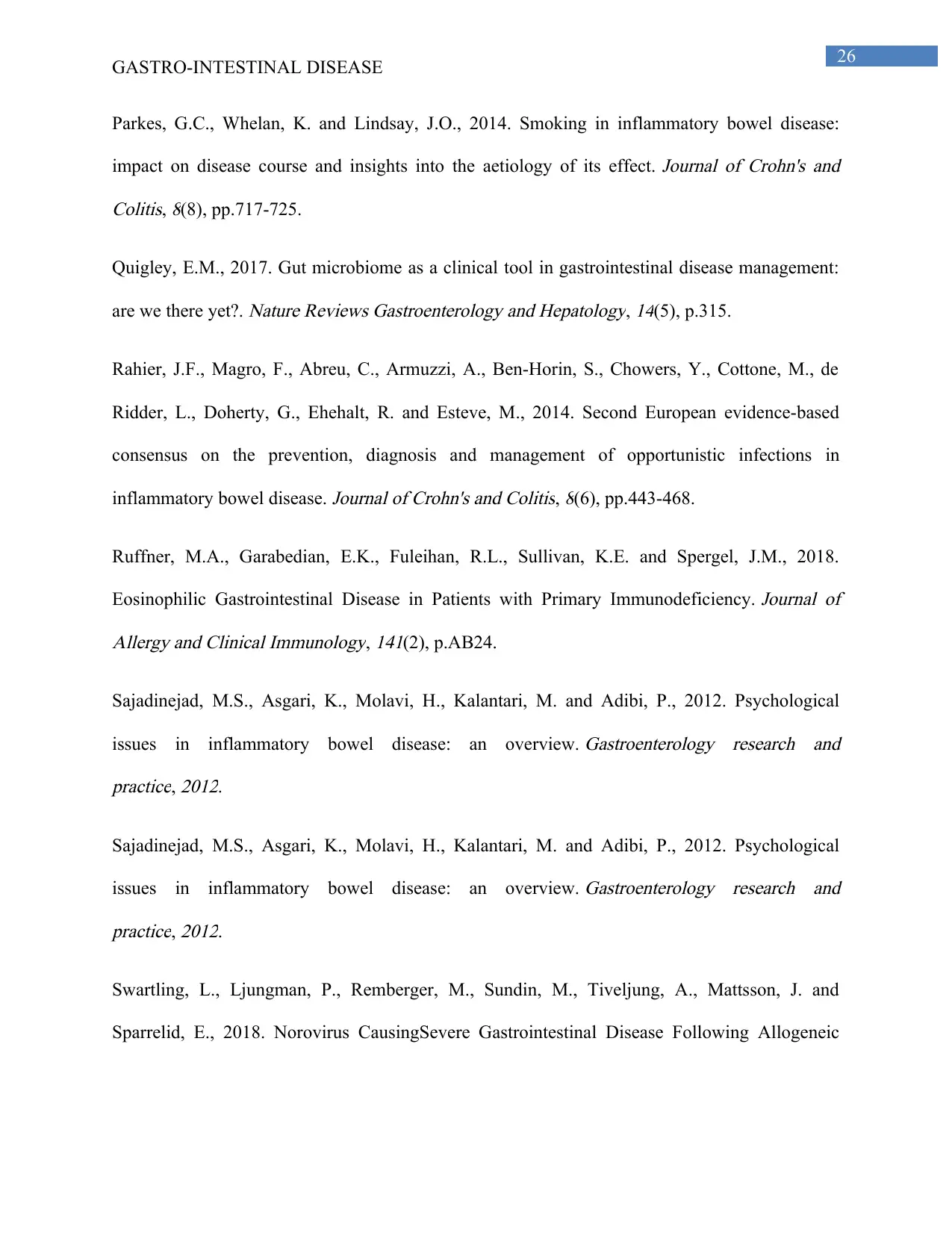
26
GASTRO-INTESTINAL DISEASE
Parkes, G.C., Whelan, K. and Lindsay, J.O., 2014. Smoking in inflammatory bowel disease:
impact on disease course and insights into the aetiology of its effect.
Journal of Crohn's and
Colitis,
8(8), pp.717-725.
Quigley, E.M., 2017. Gut microbiome as a clinical tool in gastrointestinal disease management:
are we there yet?.
Nature Reviews Gastroenterology and Hepatology,
14(5), p.315.
Rahier, J.F., Magro, F., Abreu, C., Armuzzi, A., Ben-Horin, S., Chowers, Y., Cottone, M., de
Ridder, L., Doherty, G., Ehehalt, R. and Esteve, M., 2014. Second European evidence-based
consensus on the prevention, diagnosis and management of opportunistic infections in
inflammatory bowel disease.
Journal of Crohn's and Colitis,
8(6), pp.443-468.
Ruffner, M.A., Garabedian, E.K., Fuleihan, R.L., Sullivan, K.E. and Spergel, J.M., 2018.
Eosinophilic Gastrointestinal Disease in Patients with Primary Immunodeficiency.
Journal of
Allergy and Clinical Immunology,
141(2), p.AB24.
Sajadinejad, M.S., Asgari, K., Molavi, H., Kalantari, M. and Adibi, P., 2012. Psychological
issues in inflammatory bowel disease: an overview.
Gastroenterology research and
practice,
2012.
Sajadinejad, M.S., Asgari, K., Molavi, H., Kalantari, M. and Adibi, P., 2012. Psychological
issues in inflammatory bowel disease: an overview.
Gastroenterology research and
practice,
2012.
Swartling, L., Ljungman, P., Remberger, M., Sundin, M., Tiveljung, A., Mattsson, J. and
Sparrelid, E., 2018. Norovirus CausingSevere Gastrointestinal Disease Following Allogeneic
GASTRO-INTESTINAL DISEASE
Parkes, G.C., Whelan, K. and Lindsay, J.O., 2014. Smoking in inflammatory bowel disease:
impact on disease course and insights into the aetiology of its effect.
Journal of Crohn's and
Colitis,
8(8), pp.717-725.
Quigley, E.M., 2017. Gut microbiome as a clinical tool in gastrointestinal disease management:
are we there yet?.
Nature Reviews Gastroenterology and Hepatology,
14(5), p.315.
Rahier, J.F., Magro, F., Abreu, C., Armuzzi, A., Ben-Horin, S., Chowers, Y., Cottone, M., de
Ridder, L., Doherty, G., Ehehalt, R. and Esteve, M., 2014. Second European evidence-based
consensus on the prevention, diagnosis and management of opportunistic infections in
inflammatory bowel disease.
Journal of Crohn's and Colitis,
8(6), pp.443-468.
Ruffner, M.A., Garabedian, E.K., Fuleihan, R.L., Sullivan, K.E. and Spergel, J.M., 2018.
Eosinophilic Gastrointestinal Disease in Patients with Primary Immunodeficiency.
Journal of
Allergy and Clinical Immunology,
141(2), p.AB24.
Sajadinejad, M.S., Asgari, K., Molavi, H., Kalantari, M. and Adibi, P., 2012. Psychological
issues in inflammatory bowel disease: an overview.
Gastroenterology research and
practice,
2012.
Sajadinejad, M.S., Asgari, K., Molavi, H., Kalantari, M. and Adibi, P., 2012. Psychological
issues in inflammatory bowel disease: an overview.
Gastroenterology research and
practice,
2012.
Swartling, L., Ljungman, P., Remberger, M., Sundin, M., Tiveljung, A., Mattsson, J. and
Sparrelid, E., 2018. Norovirus CausingSevere Gastrointestinal Disease Following Allogeneic
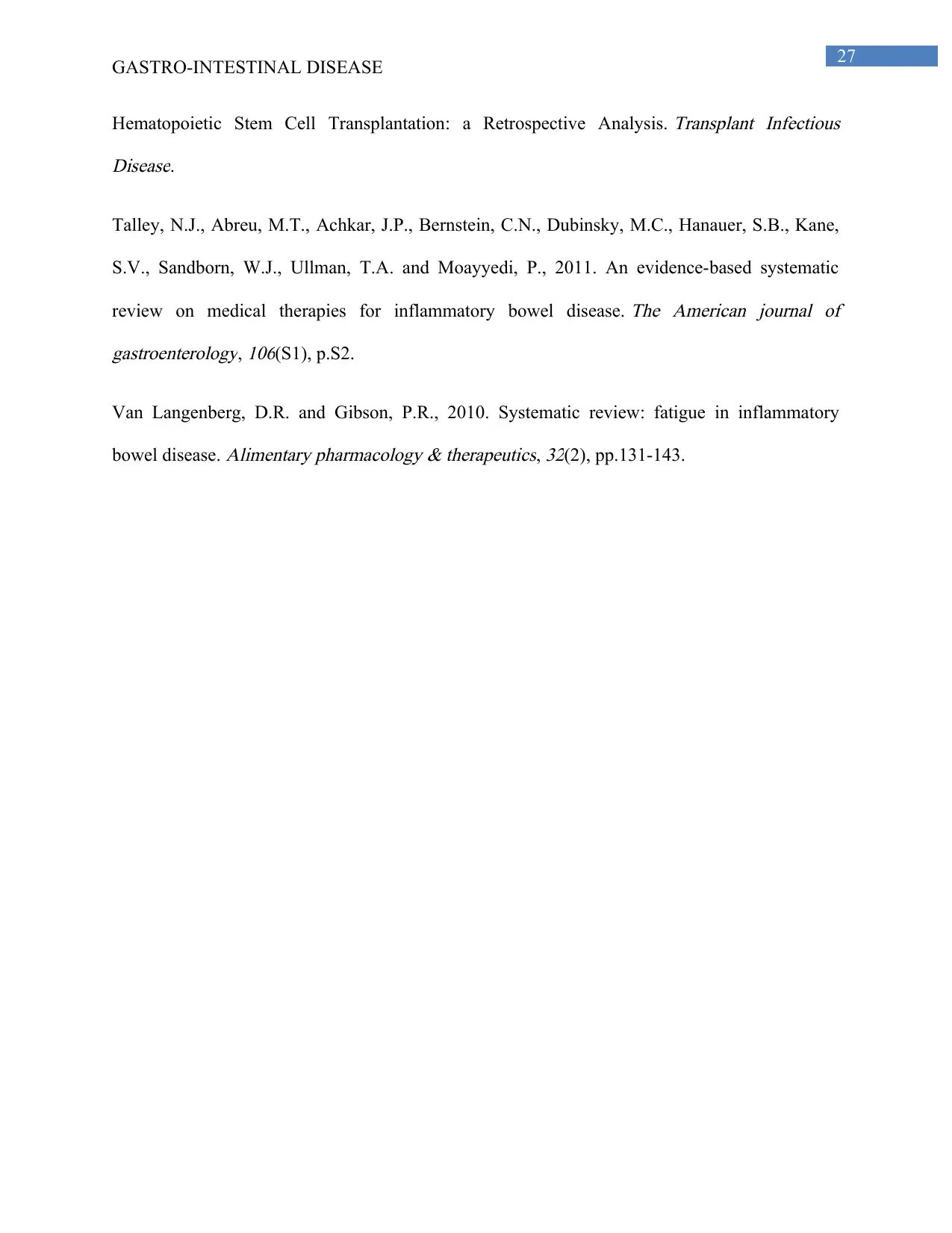
27
GASTRO-INTESTINAL DISEASE
Hematopoietic Stem Cell Transplantation: a Retrospective Analysis.
Transplant Infectious
Disease.
Talley, N.J., Abreu, M.T., Achkar, J.P., Bernstein, C.N., Dubinsky, M.C., Hanauer, S.B., Kane,
S.V., Sandborn, W.J., Ullman, T.A. and Moayyedi, P., 2011. An evidence-based systematic
review on medical therapies for inflammatory bowel disease.
The American journal of
gastroenterology,
106(S1), p.S2.
Van Langenberg, D.R. and Gibson, P.R., 2010. Systematic review: fatigue in inflammatory
bowel disease.
Alimentary pharmacology & therapeutics,
32(2), pp.131-143.
GASTRO-INTESTINAL DISEASE
Hematopoietic Stem Cell Transplantation: a Retrospective Analysis.
Transplant Infectious
Disease.
Talley, N.J., Abreu, M.T., Achkar, J.P., Bernstein, C.N., Dubinsky, M.C., Hanauer, S.B., Kane,
S.V., Sandborn, W.J., Ullman, T.A. and Moayyedi, P., 2011. An evidence-based systematic
review on medical therapies for inflammatory bowel disease.
The American journal of
gastroenterology,
106(S1), p.S2.
Van Langenberg, D.R. and Gibson, P.R., 2010. Systematic review: fatigue in inflammatory
bowel disease.
Alimentary pharmacology & therapeutics,
32(2), pp.131-143.
Secure Best Marks with AI Grader
Need help grading? Try our AI Grader for instant feedback on your assignments.
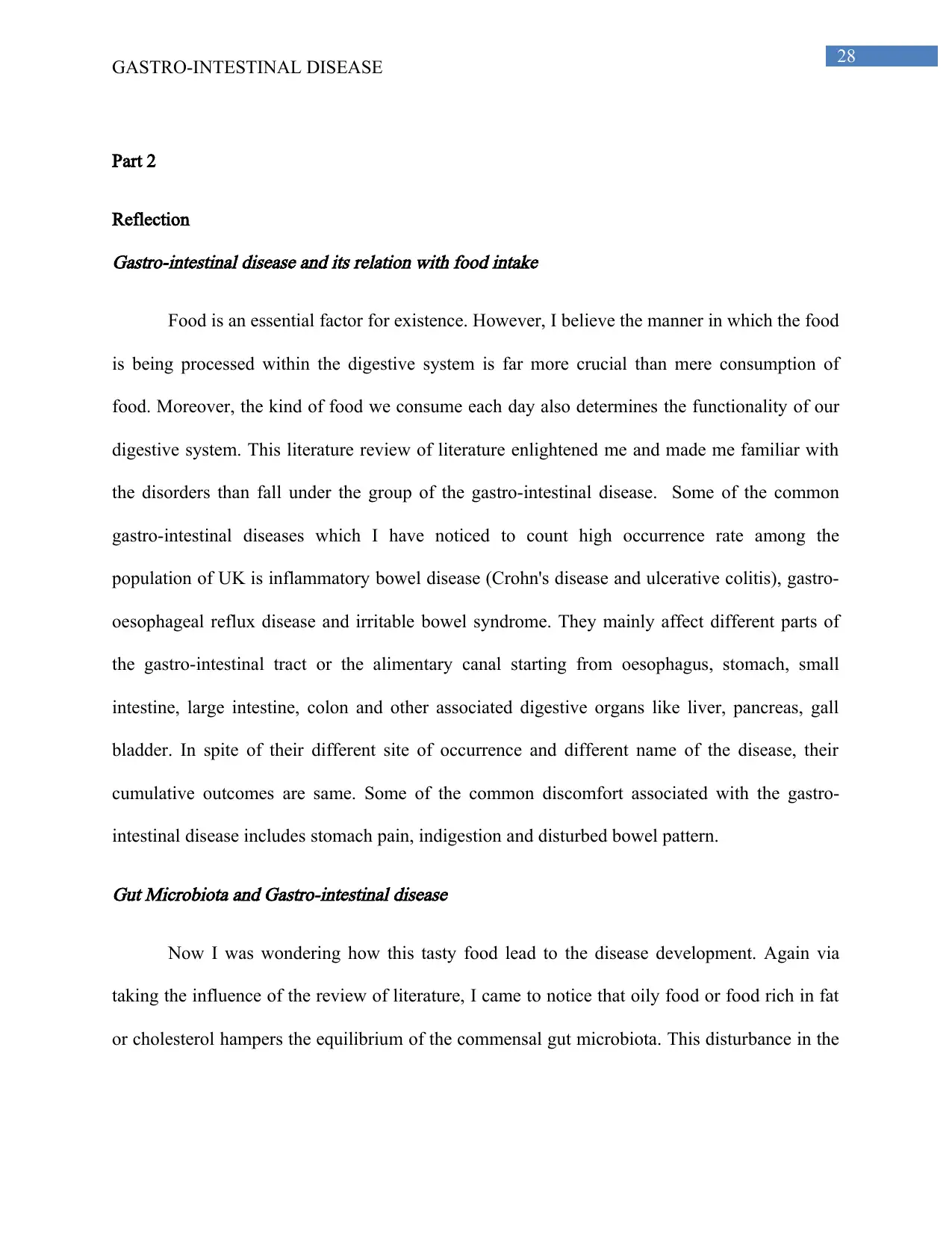
28
GASTRO-INTESTINAL DISEASE
Part 2
Reflection
Gastro-intestinal disease and its relation with food intake
Food is an essential factor for existence. However, I believe the manner in which the food
is being processed within the digestive system is far more crucial than mere consumption of
food. Moreover, the kind of food we consume each day also determines the functionality of our
digestive system. This literature review of literature enlightened me and made me familiar with
the disorders than fall under the group of the gastro-intestinal disease. Some of the common
gastro-intestinal diseases which I have noticed to count high occurrence rate among the
population of UK is inflammatory bowel disease (Crohn's disease and ulcerative colitis), gastro-
oesophageal reflux disease and irritable bowel syndrome. They mainly affect different parts of
the gastro-intestinal tract or the alimentary canal starting from oesophagus, stomach, small
intestine, large intestine, colon and other associated digestive organs like liver, pancreas, gall
bladder. In spite of their different site of occurrence and different name of the disease, their
cumulative outcomes are same. Some of the common discomfort associated with the gastro-
intestinal disease includes stomach pain, indigestion and disturbed bowel pattern.
Gut Microbiota and Gastro-intestinal disease
Now I was wondering how this tasty food lead to the disease development. Again via
taking the influence of the review of literature, I came to notice that oily food or food rich in fat
or cholesterol hampers the equilibrium of the commensal gut microbiota. This disturbance in the
GASTRO-INTESTINAL DISEASE
Part 2
Reflection
Gastro-intestinal disease and its relation with food intake
Food is an essential factor for existence. However, I believe the manner in which the food
is being processed within the digestive system is far more crucial than mere consumption of
food. Moreover, the kind of food we consume each day also determines the functionality of our
digestive system. This literature review of literature enlightened me and made me familiar with
the disorders than fall under the group of the gastro-intestinal disease. Some of the common
gastro-intestinal diseases which I have noticed to count high occurrence rate among the
population of UK is inflammatory bowel disease (Crohn's disease and ulcerative colitis), gastro-
oesophageal reflux disease and irritable bowel syndrome. They mainly affect different parts of
the gastro-intestinal tract or the alimentary canal starting from oesophagus, stomach, small
intestine, large intestine, colon and other associated digestive organs like liver, pancreas, gall
bladder. In spite of their different site of occurrence and different name of the disease, their
cumulative outcomes are same. Some of the common discomfort associated with the gastro-
intestinal disease includes stomach pain, indigestion and disturbed bowel pattern.
Gut Microbiota and Gastro-intestinal disease
Now I was wondering how this tasty food lead to the disease development. Again via
taking the influence of the review of literature, I came to notice that oily food or food rich in fat
or cholesterol hampers the equilibrium of the commensal gut microbiota. This disturbance in the
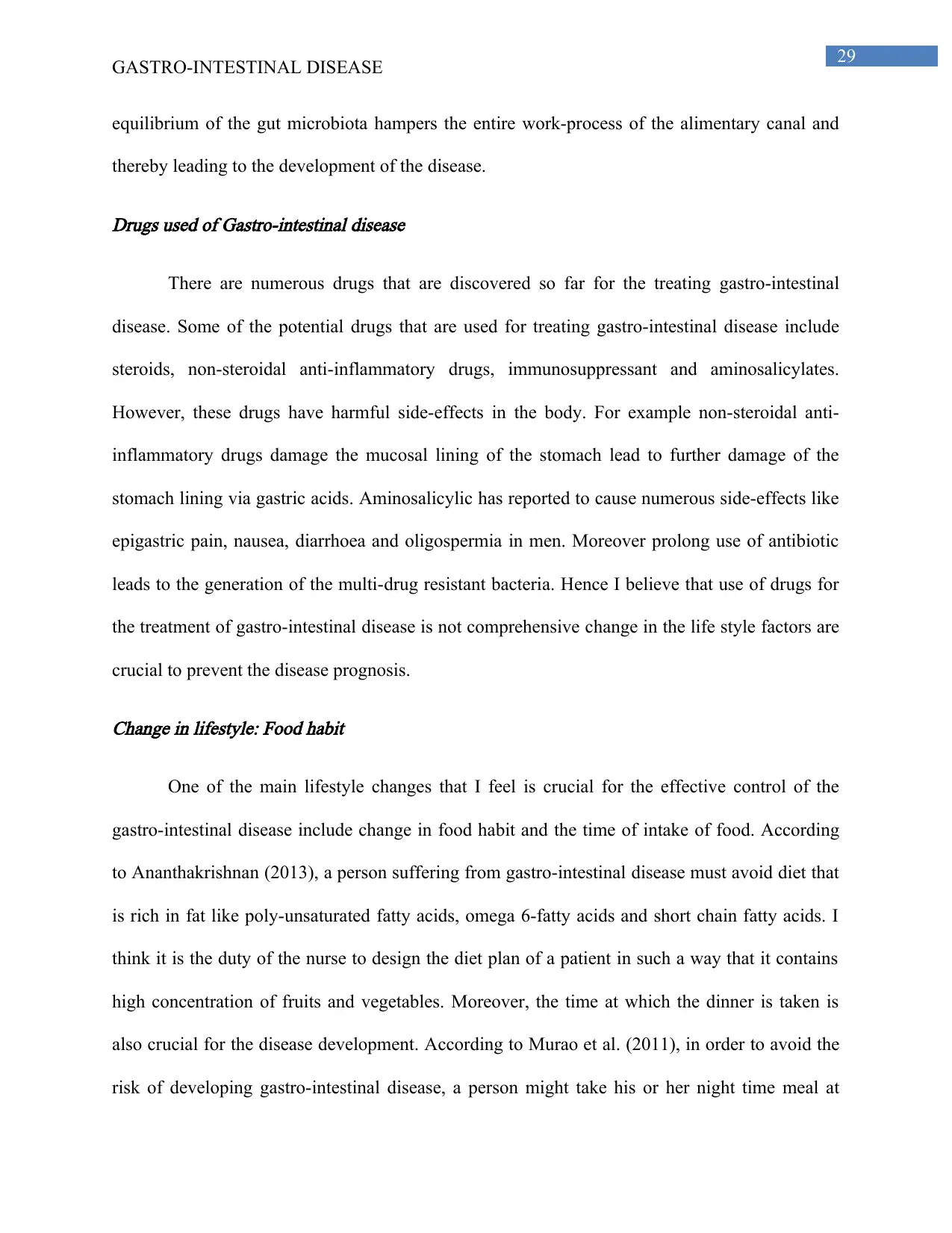
29
GASTRO-INTESTINAL DISEASE
equilibrium of the gut microbiota hampers the entire work-process of the alimentary canal and
thereby leading to the development of the disease.
Drugs used of Gastro-intestinal disease
There are numerous drugs that are discovered so far for the treating gastro-intestinal
disease. Some of the potential drugs that are used for treating gastro-intestinal disease include
steroids, non-steroidal anti-inflammatory drugs, immunosuppressant and aminosalicylates.
However, these drugs have harmful side-effects in the body. For example non-steroidal anti-
inflammatory drugs damage the mucosal lining of the stomach lead to further damage of the
stomach lining via gastric acids. Aminosalicylic has reported to cause numerous side-effects like
epigastric pain, nausea, diarrhoea and oligospermia in men. Moreover prolong use of antibiotic
leads to the generation of the multi-drug resistant bacteria. Hence I believe that use of drugs for
the treatment of gastro-intestinal disease is not comprehensive change in the life style factors are
crucial to prevent the disease prognosis.
Change in lifestyle: Food habit
One of the main lifestyle changes that I feel is crucial for the effective control of the
gastro-intestinal disease include change in food habit and the time of intake of food. According
to Ananthakrishnan (2013), a person suffering from gastro-intestinal disease must avoid diet that
is rich in fat like poly-unsaturated fatty acids, omega 6-fatty acids and short chain fatty acids. I
think it is the duty of the nurse to design the diet plan of a patient in such a way that it contains
high concentration of fruits and vegetables. Moreover, the time at which the dinner is taken is
also crucial for the disease development. According to Murao et al. (2011), in order to avoid the
risk of developing gastro-intestinal disease, a person might take his or her night time meal at
GASTRO-INTESTINAL DISEASE
equilibrium of the gut microbiota hampers the entire work-process of the alimentary canal and
thereby leading to the development of the disease.
Drugs used of Gastro-intestinal disease
There are numerous drugs that are discovered so far for the treating gastro-intestinal
disease. Some of the potential drugs that are used for treating gastro-intestinal disease include
steroids, non-steroidal anti-inflammatory drugs, immunosuppressant and aminosalicylates.
However, these drugs have harmful side-effects in the body. For example non-steroidal anti-
inflammatory drugs damage the mucosal lining of the stomach lead to further damage of the
stomach lining via gastric acids. Aminosalicylic has reported to cause numerous side-effects like
epigastric pain, nausea, diarrhoea and oligospermia in men. Moreover prolong use of antibiotic
leads to the generation of the multi-drug resistant bacteria. Hence I believe that use of drugs for
the treatment of gastro-intestinal disease is not comprehensive change in the life style factors are
crucial to prevent the disease prognosis.
Change in lifestyle: Food habit
One of the main lifestyle changes that I feel is crucial for the effective control of the
gastro-intestinal disease include change in food habit and the time of intake of food. According
to Ananthakrishnan (2013), a person suffering from gastro-intestinal disease must avoid diet that
is rich in fat like poly-unsaturated fatty acids, omega 6-fatty acids and short chain fatty acids. I
think it is the duty of the nurse to design the diet plan of a patient in such a way that it contains
high concentration of fruits and vegetables. Moreover, the time at which the dinner is taken is
also crucial for the disease development. According to Murao et al. (2011), in order to avoid the
risk of developing gastro-intestinal disease, a person might take his or her night time meal at
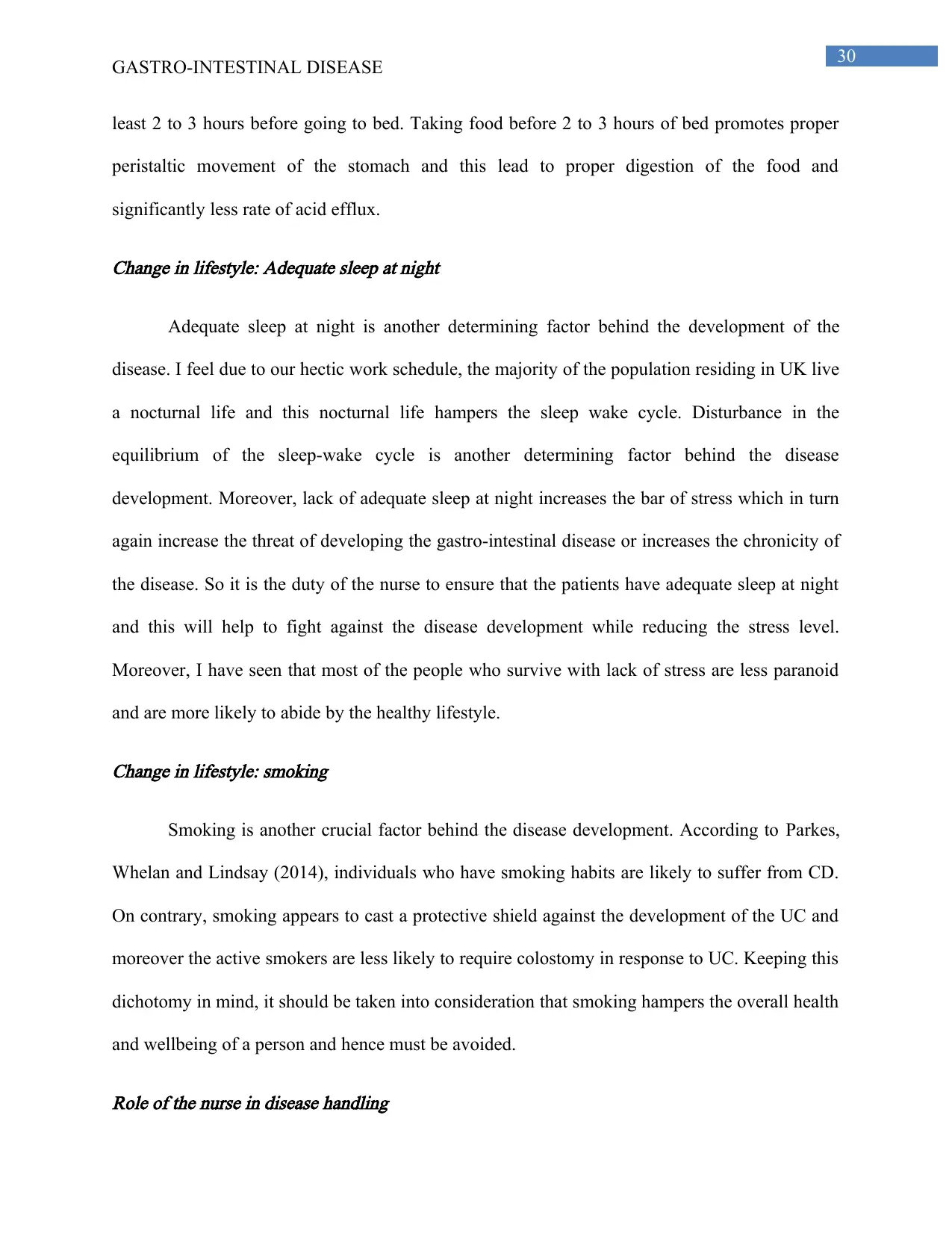
30
GASTRO-INTESTINAL DISEASE
least 2 to 3 hours before going to bed. Taking food before 2 to 3 hours of bed promotes proper
peristaltic movement of the stomach and this lead to proper digestion of the food and
significantly less rate of acid efflux.
Change in lifestyle: Adequate sleep at night
Adequate sleep at night is another determining factor behind the development of the
disease. I feel due to our hectic work schedule, the majority of the population residing in UK live
a nocturnal life and this nocturnal life hampers the sleep wake cycle. Disturbance in the
equilibrium of the sleep-wake cycle is another determining factor behind the disease
development. Moreover, lack of adequate sleep at night increases the bar of stress which in turn
again increase the threat of developing the gastro-intestinal disease or increases the chronicity of
the disease. So it is the duty of the nurse to ensure that the patients have adequate sleep at night
and this will help to fight against the disease development while reducing the stress level.
Moreover, I have seen that most of the people who survive with lack of stress are less paranoid
and are more likely to abide by the healthy lifestyle.
Change in lifestyle: smoking
Smoking is another crucial factor behind the disease development. According to Parkes,
Whelan and Lindsay (2014), individuals who have smoking habits are likely to suffer from CD.
On contrary, smoking appears to cast a protective shield against the development of the UC and
moreover the active smokers are less likely to require colostomy in response to UC. Keeping this
dichotomy in mind, it should be taken into consideration that smoking hampers the overall health
and wellbeing of a person and hence must be avoided.
Role of the nurse in disease handling
GASTRO-INTESTINAL DISEASE
least 2 to 3 hours before going to bed. Taking food before 2 to 3 hours of bed promotes proper
peristaltic movement of the stomach and this lead to proper digestion of the food and
significantly less rate of acid efflux.
Change in lifestyle: Adequate sleep at night
Adequate sleep at night is another determining factor behind the development of the
disease. I feel due to our hectic work schedule, the majority of the population residing in UK live
a nocturnal life and this nocturnal life hampers the sleep wake cycle. Disturbance in the
equilibrium of the sleep-wake cycle is another determining factor behind the disease
development. Moreover, lack of adequate sleep at night increases the bar of stress which in turn
again increase the threat of developing the gastro-intestinal disease or increases the chronicity of
the disease. So it is the duty of the nurse to ensure that the patients have adequate sleep at night
and this will help to fight against the disease development while reducing the stress level.
Moreover, I have seen that most of the people who survive with lack of stress are less paranoid
and are more likely to abide by the healthy lifestyle.
Change in lifestyle: smoking
Smoking is another crucial factor behind the disease development. According to Parkes,
Whelan and Lindsay (2014), individuals who have smoking habits are likely to suffer from CD.
On contrary, smoking appears to cast a protective shield against the development of the UC and
moreover the active smokers are less likely to require colostomy in response to UC. Keeping this
dichotomy in mind, it should be taken into consideration that smoking hampers the overall health
and wellbeing of a person and hence must be avoided.
Role of the nurse in disease handling
Paraphrase This Document
Need a fresh take? Get an instant paraphrase of this document with our AI Paraphraser
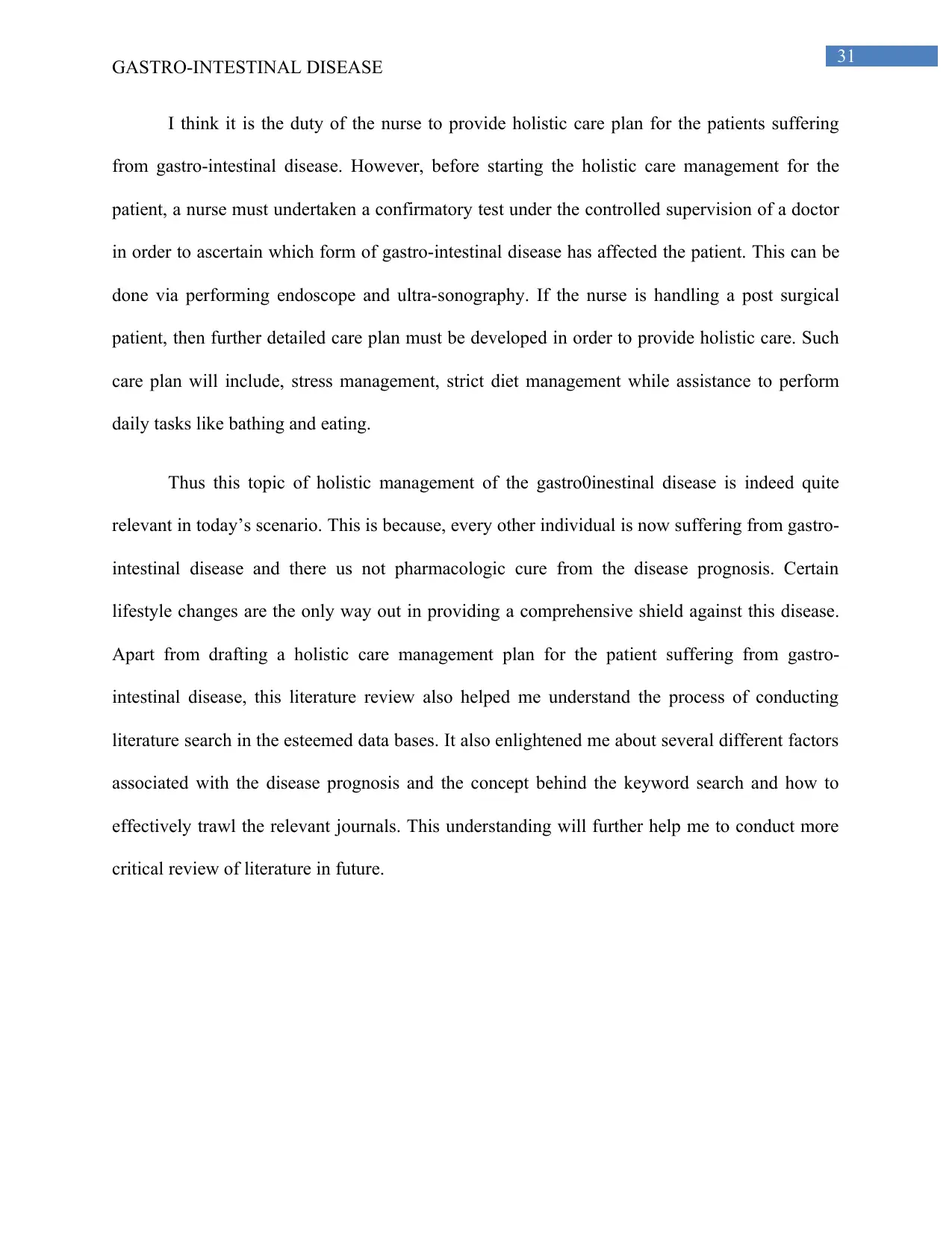
31
GASTRO-INTESTINAL DISEASE
I think it is the duty of the nurse to provide holistic care plan for the patients suffering
from gastro-intestinal disease. However, before starting the holistic care management for the
patient, a nurse must undertaken a confirmatory test under the controlled supervision of a doctor
in order to ascertain which form of gastro-intestinal disease has affected the patient. This can be
done via performing endoscope and ultra-sonography. If the nurse is handling a post surgical
patient, then further detailed care plan must be developed in order to provide holistic care. Such
care plan will include, stress management, strict diet management while assistance to perform
daily tasks like bathing and eating.
Thus this topic of holistic management of the gastro0inestinal disease is indeed quite
relevant in today’s scenario. This is because, every other individual is now suffering from gastro-
intestinal disease and there us not pharmacologic cure from the disease prognosis. Certain
lifestyle changes are the only way out in providing a comprehensive shield against this disease.
Apart from drafting a holistic care management plan for the patient suffering from gastro-
intestinal disease, this literature review also helped me understand the process of conducting
literature search in the esteemed data bases. It also enlightened me about several different factors
associated with the disease prognosis and the concept behind the keyword search and how to
effectively trawl the relevant journals. This understanding will further help me to conduct more
critical review of literature in future.
GASTRO-INTESTINAL DISEASE
I think it is the duty of the nurse to provide holistic care plan for the patients suffering
from gastro-intestinal disease. However, before starting the holistic care management for the
patient, a nurse must undertaken a confirmatory test under the controlled supervision of a doctor
in order to ascertain which form of gastro-intestinal disease has affected the patient. This can be
done via performing endoscope and ultra-sonography. If the nurse is handling a post surgical
patient, then further detailed care plan must be developed in order to provide holistic care. Such
care plan will include, stress management, strict diet management while assistance to perform
daily tasks like bathing and eating.
Thus this topic of holistic management of the gastro0inestinal disease is indeed quite
relevant in today’s scenario. This is because, every other individual is now suffering from gastro-
intestinal disease and there us not pharmacologic cure from the disease prognosis. Certain
lifestyle changes are the only way out in providing a comprehensive shield against this disease.
Apart from drafting a holistic care management plan for the patient suffering from gastro-
intestinal disease, this literature review also helped me understand the process of conducting
literature search in the esteemed data bases. It also enlightened me about several different factors
associated with the disease prognosis and the concept behind the keyword search and how to
effectively trawl the relevant journals. This understanding will further help me to conduct more
critical review of literature in future.
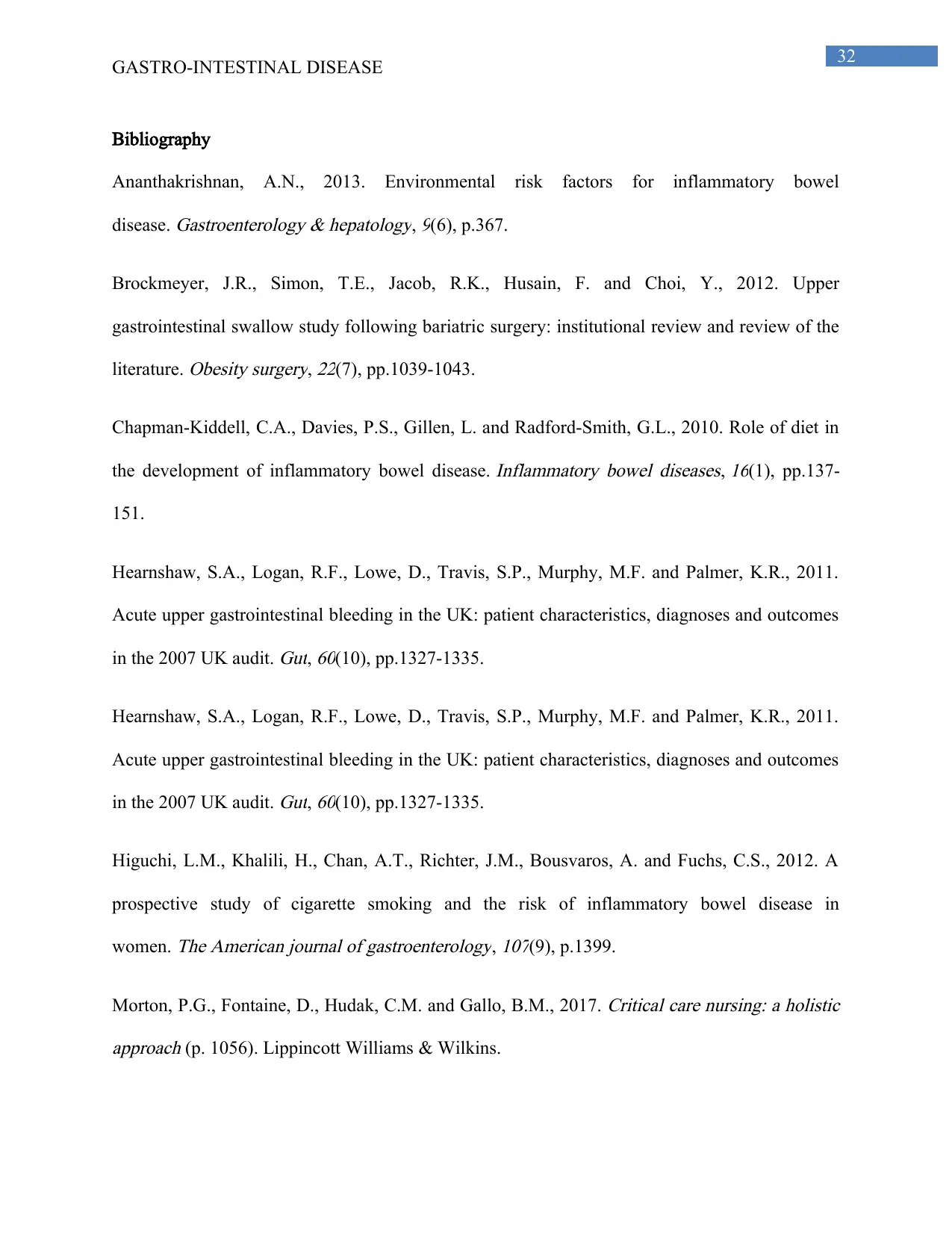
32
GASTRO-INTESTINAL DISEASE
Bibliography
Ananthakrishnan, A.N., 2013. Environmental risk factors for inflammatory bowel
disease.
Gastroenterology & hepatology,
9(6), p.367.
Brockmeyer, J.R., Simon, T.E., Jacob, R.K., Husain, F. and Choi, Y., 2012. Upper
gastrointestinal swallow study following bariatric surgery: institutional review and review of the
literature.
Obesity surgery,
22(7), pp.1039-1043.
Chapman‐Kiddell, C.A., Davies, P.S., Gillen, L. and Radford‐Smith, G.L., 2010. Role of diet in
the development of inflammatory bowel disease.
Inflammatory bowel diseases,
16(1), pp.137-
151.
Hearnshaw, S.A., Logan, R.F., Lowe, D., Travis, S.P., Murphy, M.F. and Palmer, K.R., 2011.
Acute upper gastrointestinal bleeding in the UK: patient characteristics, diagnoses and outcomes
in the 2007 UK audit.
Gut,
60(10), pp.1327-1335.
Hearnshaw, S.A., Logan, R.F., Lowe, D., Travis, S.P., Murphy, M.F. and Palmer, K.R., 2011.
Acute upper gastrointestinal bleeding in the UK: patient characteristics, diagnoses and outcomes
in the 2007 UK audit.
Gut,
60(10), pp.1327-1335.
Higuchi, L.M., Khalili, H., Chan, A.T., Richter, J.M., Bousvaros, A. and Fuchs, C.S., 2012. A
prospective study of cigarette smoking and the risk of inflammatory bowel disease in
women.
The American journal of gastroenterology,
107(9), p.1399.
Morton, P.G., Fontaine, D., Hudak, C.M. and Gallo, B.M., 2017.
Critical care nursing: a holistic
approach (p. 1056). Lippincott Williams & Wilkins.
GASTRO-INTESTINAL DISEASE
Bibliography
Ananthakrishnan, A.N., 2013. Environmental risk factors for inflammatory bowel
disease.
Gastroenterology & hepatology,
9(6), p.367.
Brockmeyer, J.R., Simon, T.E., Jacob, R.K., Husain, F. and Choi, Y., 2012. Upper
gastrointestinal swallow study following bariatric surgery: institutional review and review of the
literature.
Obesity surgery,
22(7), pp.1039-1043.
Chapman‐Kiddell, C.A., Davies, P.S., Gillen, L. and Radford‐Smith, G.L., 2010. Role of diet in
the development of inflammatory bowel disease.
Inflammatory bowel diseases,
16(1), pp.137-
151.
Hearnshaw, S.A., Logan, R.F., Lowe, D., Travis, S.P., Murphy, M.F. and Palmer, K.R., 2011.
Acute upper gastrointestinal bleeding in the UK: patient characteristics, diagnoses and outcomes
in the 2007 UK audit.
Gut,
60(10), pp.1327-1335.
Hearnshaw, S.A., Logan, R.F., Lowe, D., Travis, S.P., Murphy, M.F. and Palmer, K.R., 2011.
Acute upper gastrointestinal bleeding in the UK: patient characteristics, diagnoses and outcomes
in the 2007 UK audit.
Gut,
60(10), pp.1327-1335.
Higuchi, L.M., Khalili, H., Chan, A.T., Richter, J.M., Bousvaros, A. and Fuchs, C.S., 2012. A
prospective study of cigarette smoking and the risk of inflammatory bowel disease in
women.
The American journal of gastroenterology,
107(9), p.1399.
Morton, P.G., Fontaine, D., Hudak, C.M. and Gallo, B.M., 2017.
Critical care nursing: a holistic
approach (p. 1056). Lippincott Williams & Wilkins.
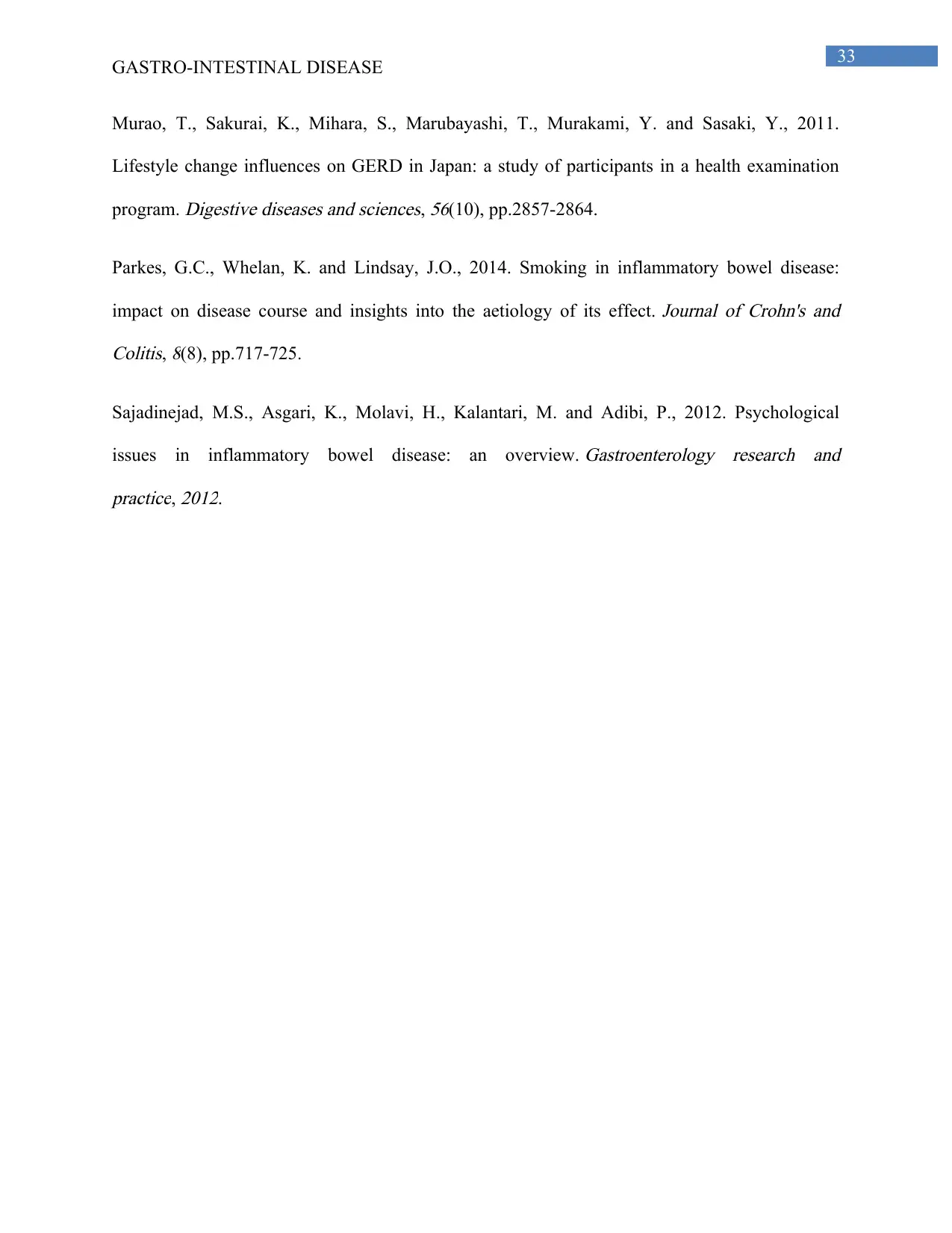
33
GASTRO-INTESTINAL DISEASE
Murao, T., Sakurai, K., Mihara, S., Marubayashi, T., Murakami, Y. and Sasaki, Y., 2011.
Lifestyle change influences on GERD in Japan: a study of participants in a health examination
program.
Digestive diseases and sciences,
56(10), pp.2857-2864.
Parkes, G.C., Whelan, K. and Lindsay, J.O., 2014. Smoking in inflammatory bowel disease:
impact on disease course and insights into the aetiology of its effect.
Journal of Crohn's and
Colitis,
8(8), pp.717-725.
Sajadinejad, M.S., Asgari, K., Molavi, H., Kalantari, M. and Adibi, P., 2012. Psychological
issues in inflammatory bowel disease: an overview.
Gastroenterology research and
practice,
2012.
GASTRO-INTESTINAL DISEASE
Murao, T., Sakurai, K., Mihara, S., Marubayashi, T., Murakami, Y. and Sasaki, Y., 2011.
Lifestyle change influences on GERD in Japan: a study of participants in a health examination
program.
Digestive diseases and sciences,
56(10), pp.2857-2864.
Parkes, G.C., Whelan, K. and Lindsay, J.O., 2014. Smoking in inflammatory bowel disease:
impact on disease course and insights into the aetiology of its effect.
Journal of Crohn's and
Colitis,
8(8), pp.717-725.
Sajadinejad, M.S., Asgari, K., Molavi, H., Kalantari, M. and Adibi, P., 2012. Psychological
issues in inflammatory bowel disease: an overview.
Gastroenterology research and
practice,
2012.
1 out of 34
Related Documents
Your All-in-One AI-Powered Toolkit for Academic Success.
+13062052269
info@desklib.com
Available 24*7 on WhatsApp / Email
![[object Object]](/_next/static/media/star-bottom.7253800d.svg)
Unlock your academic potential
© 2024 | Zucol Services PVT LTD | All rights reserved.





